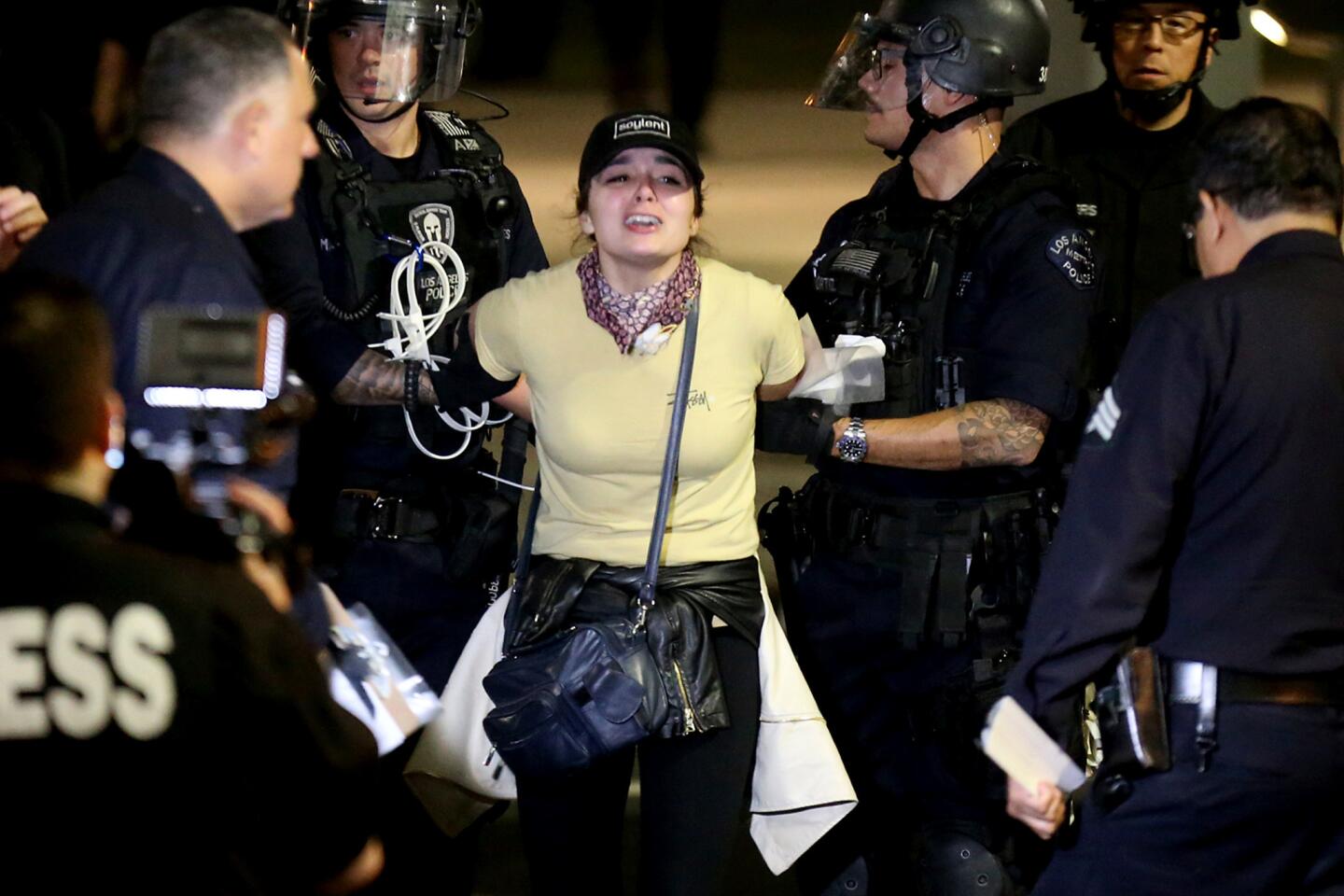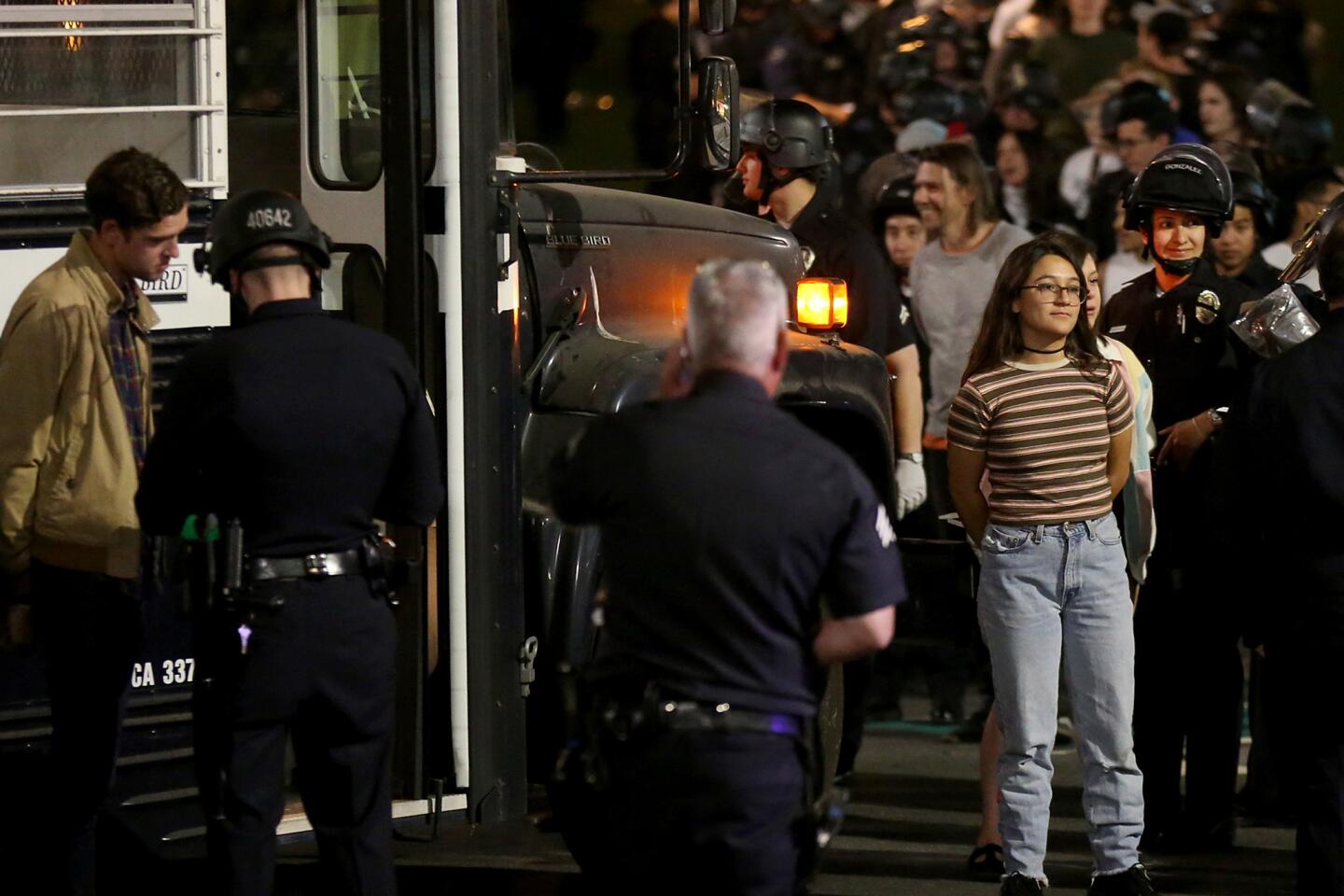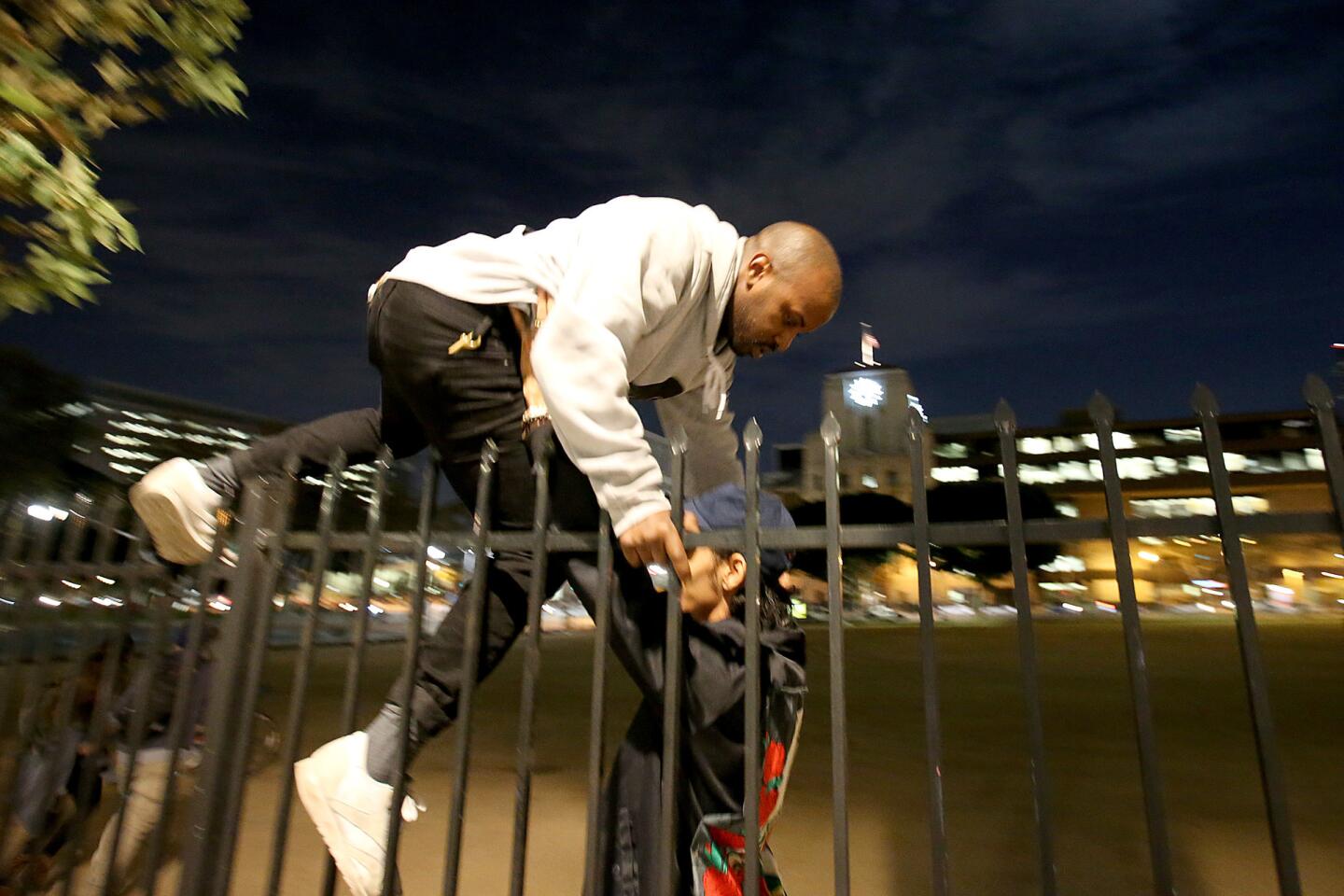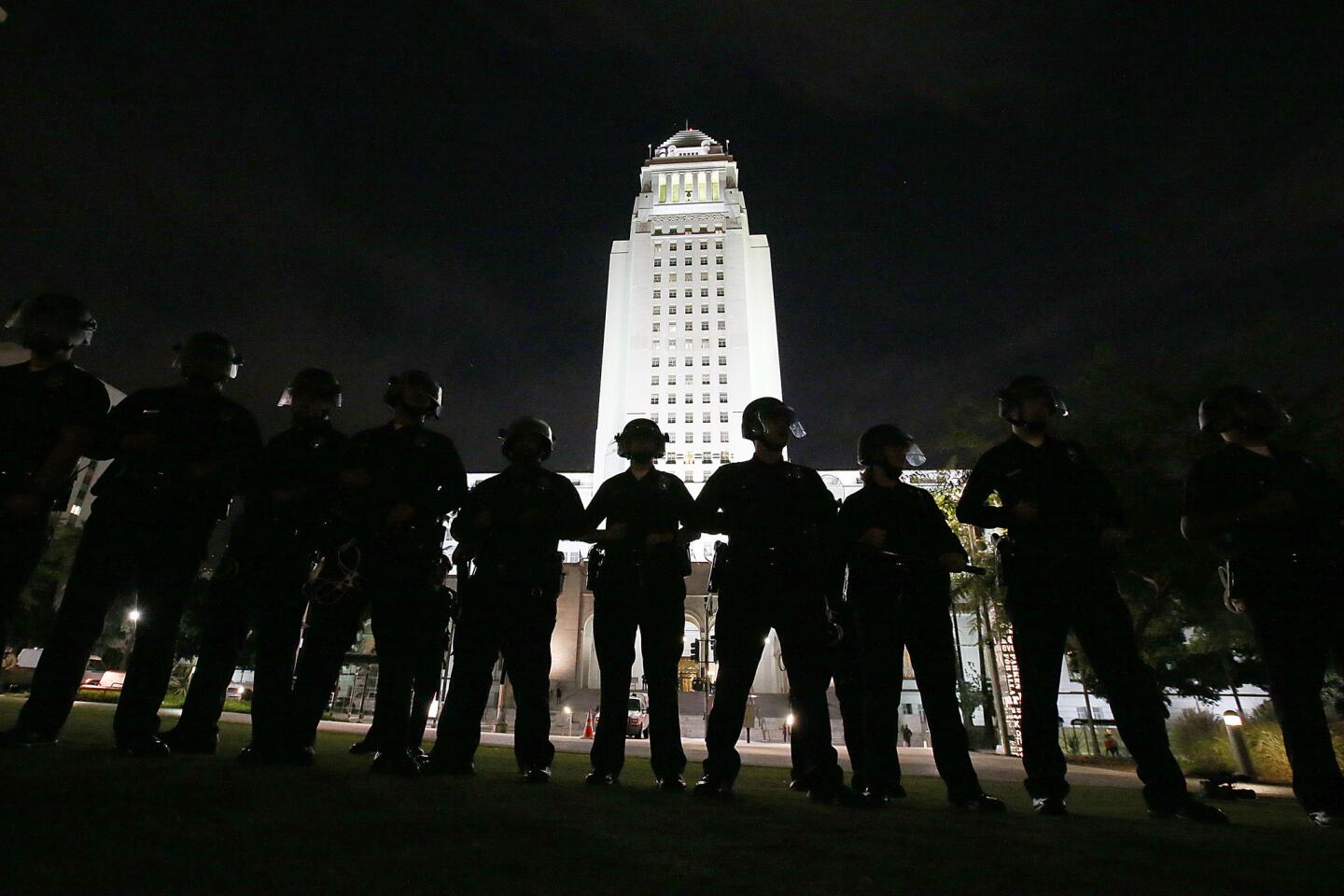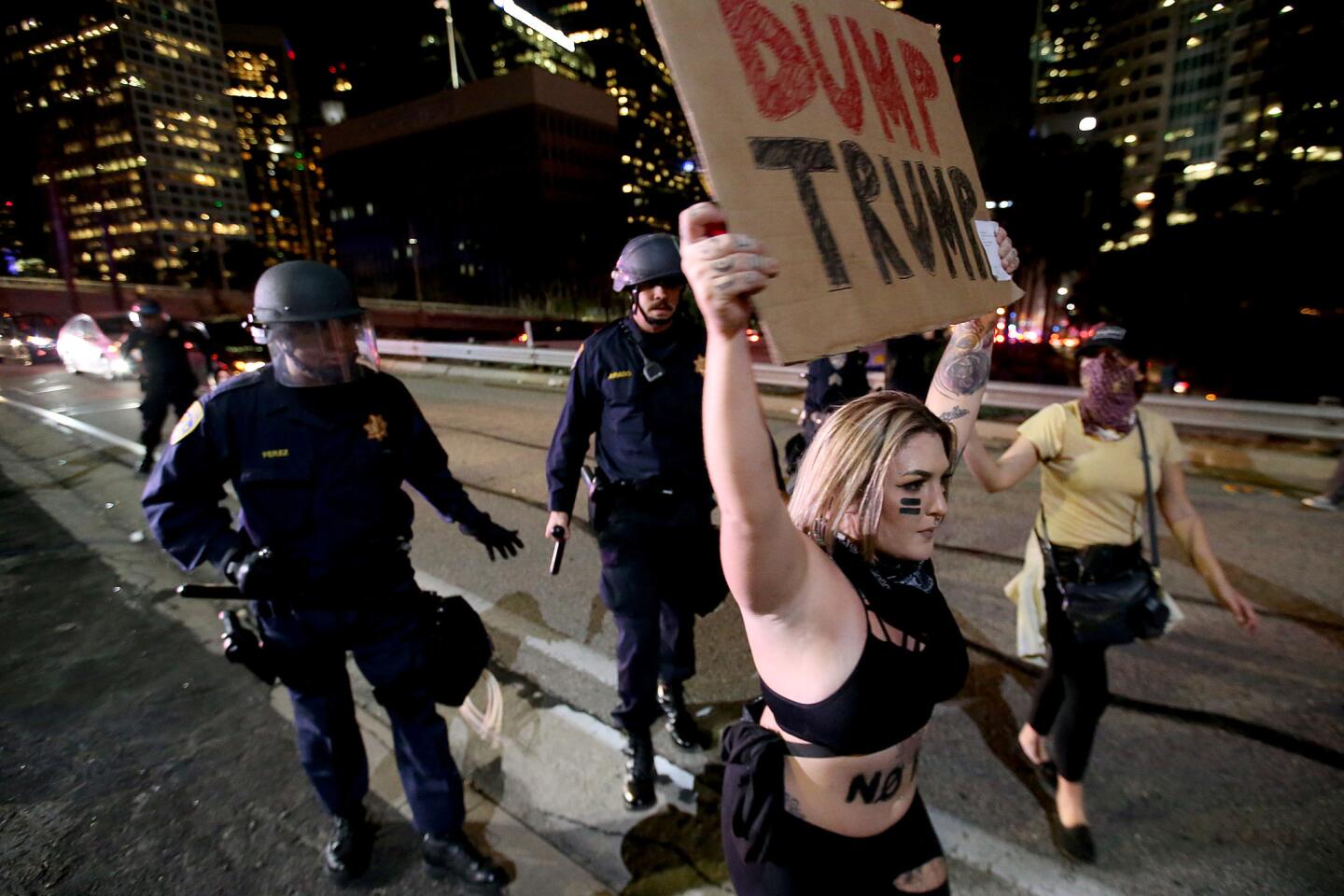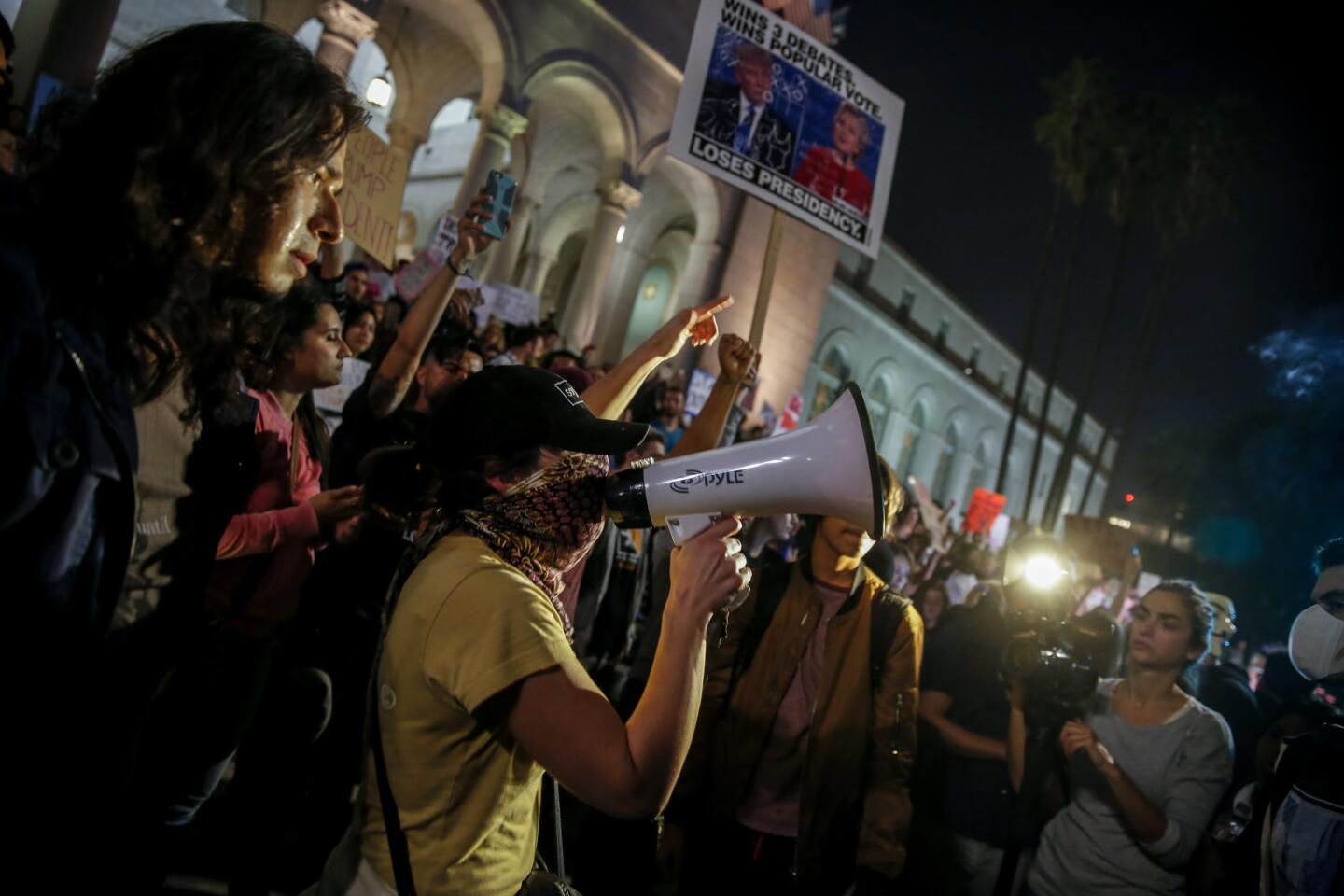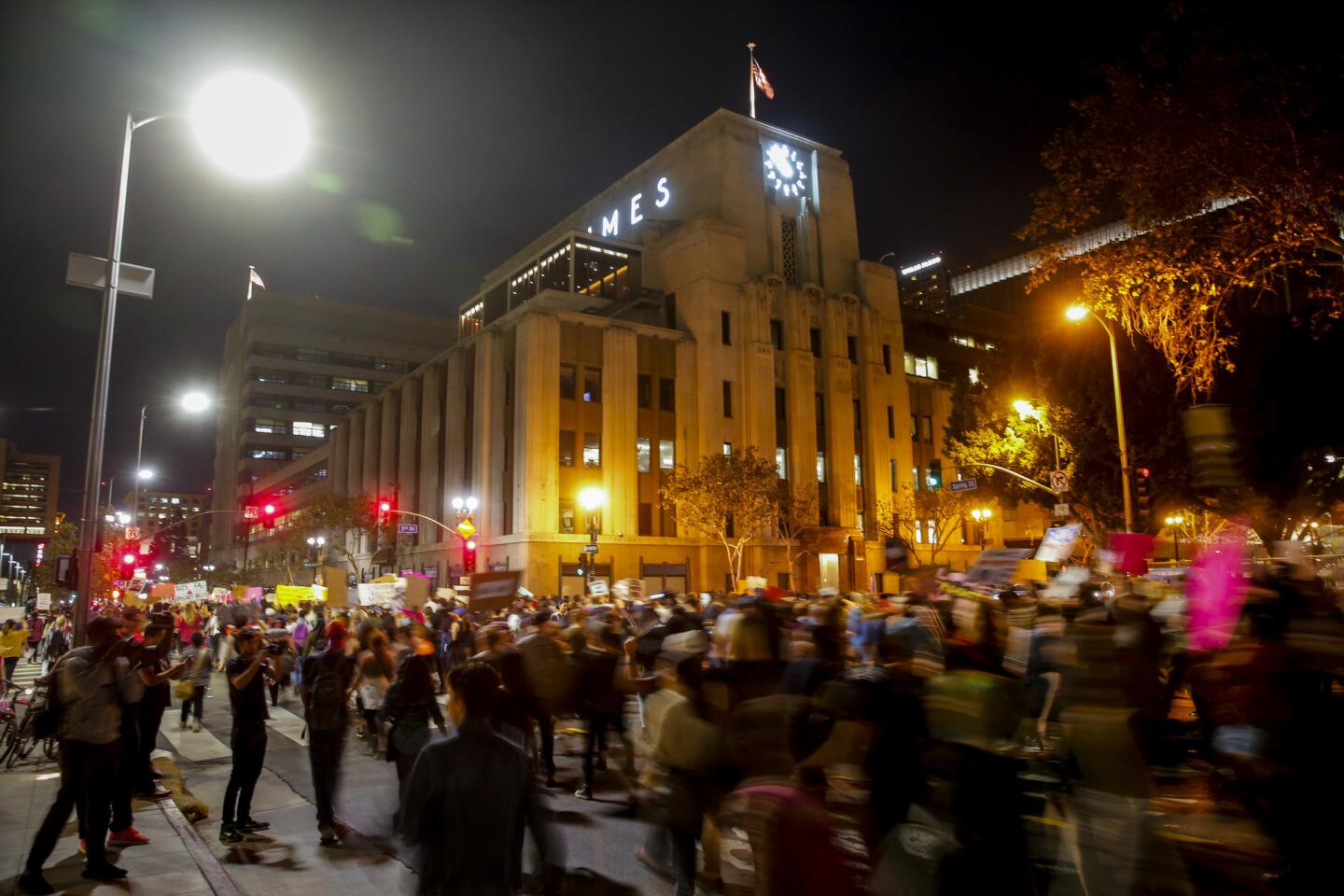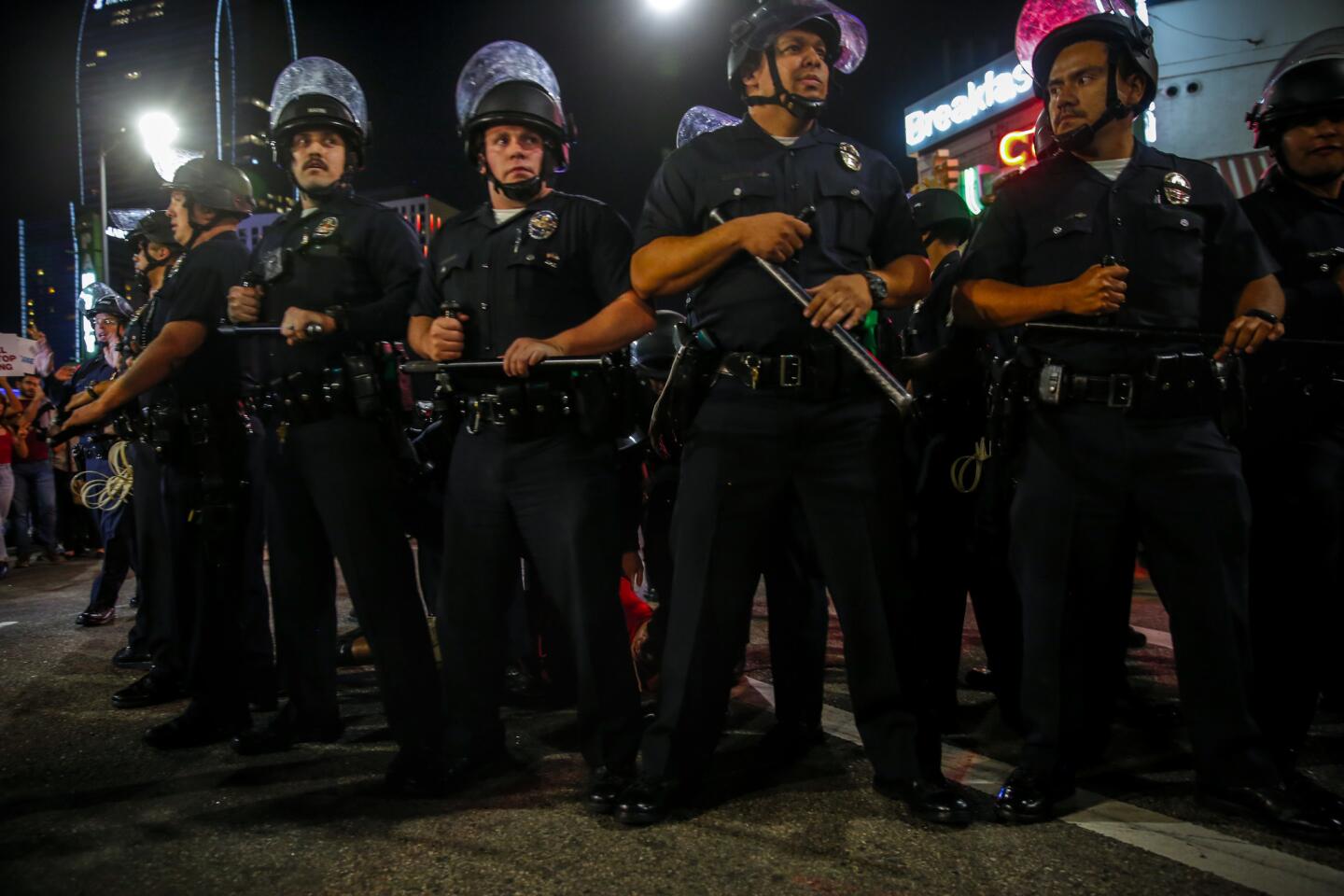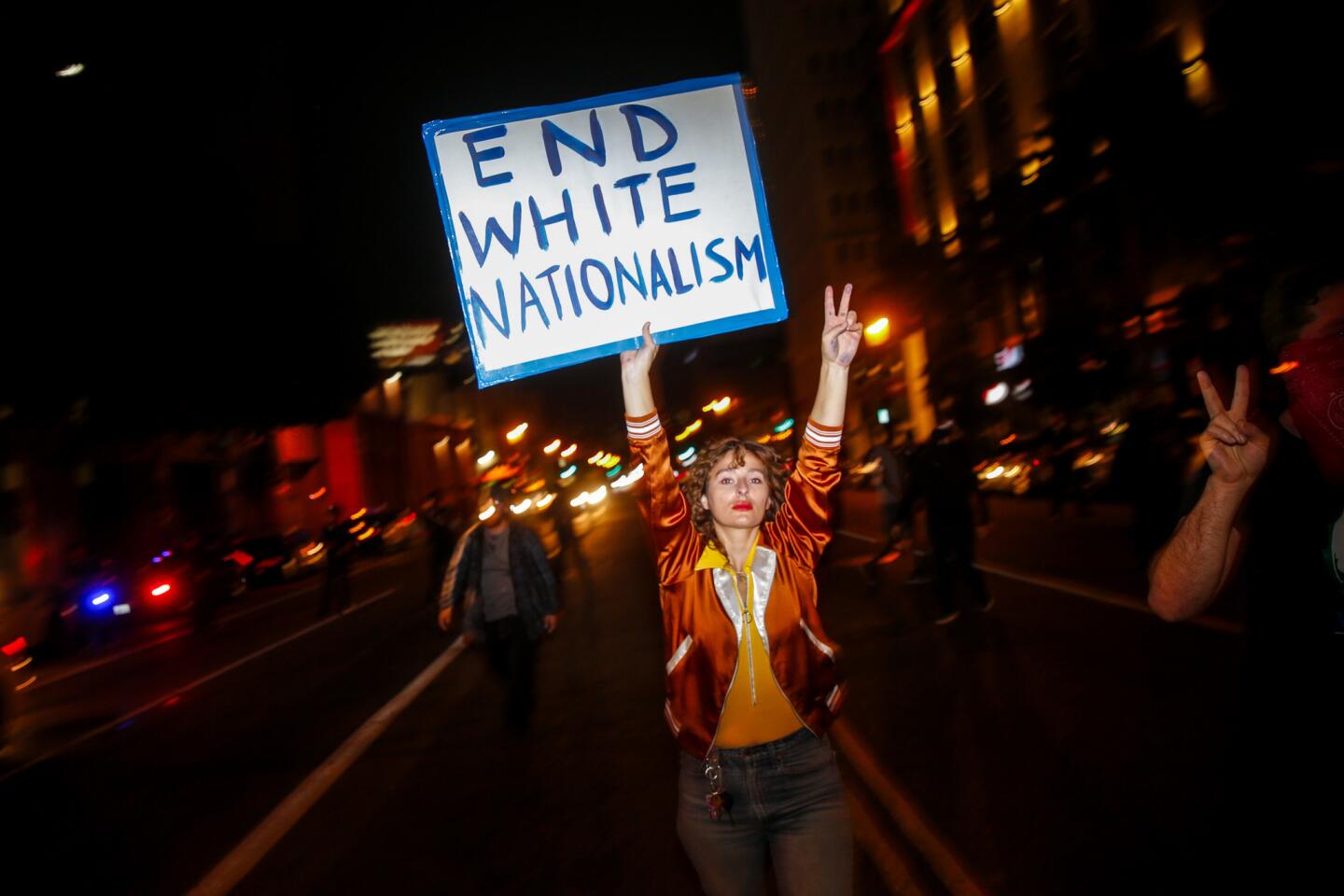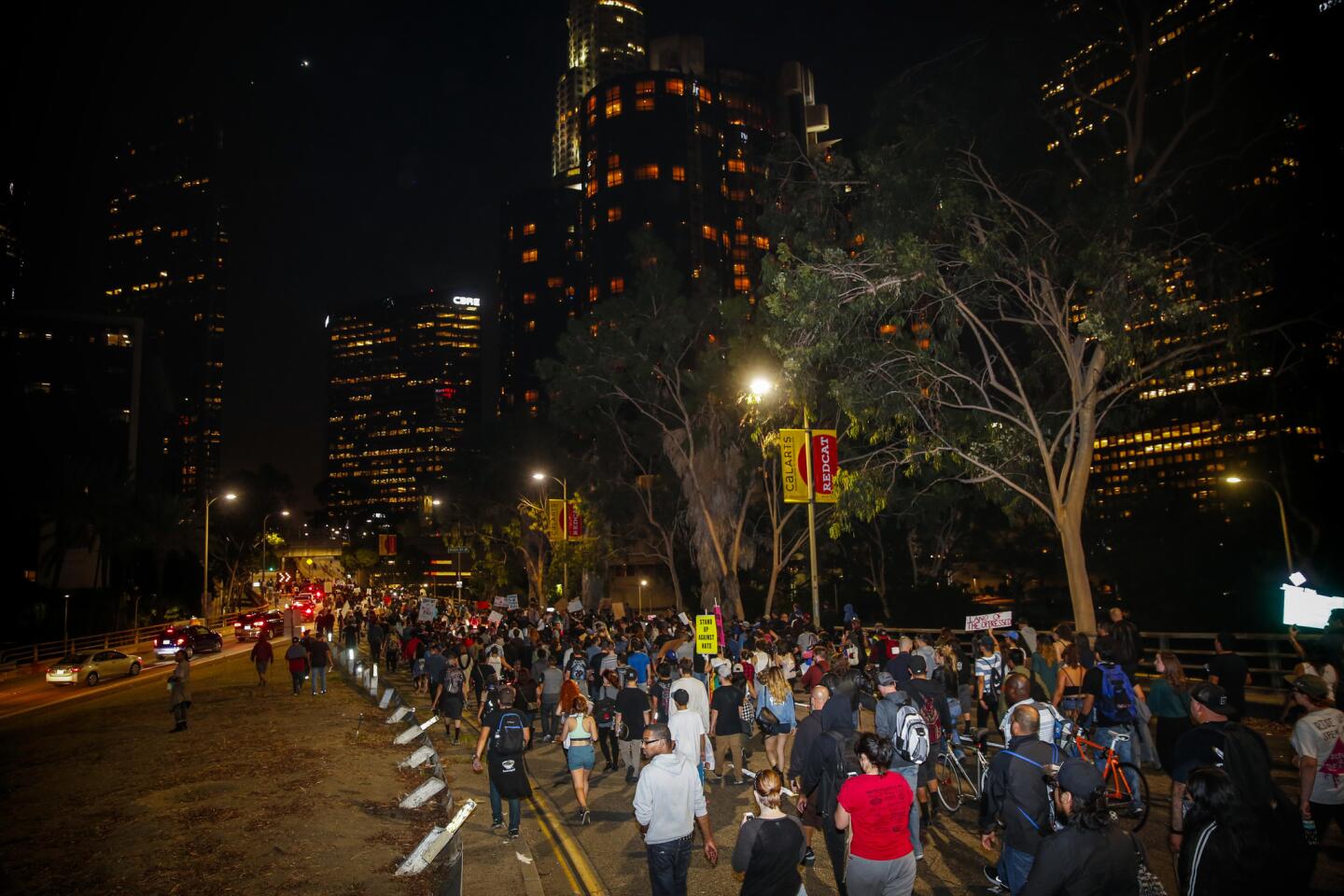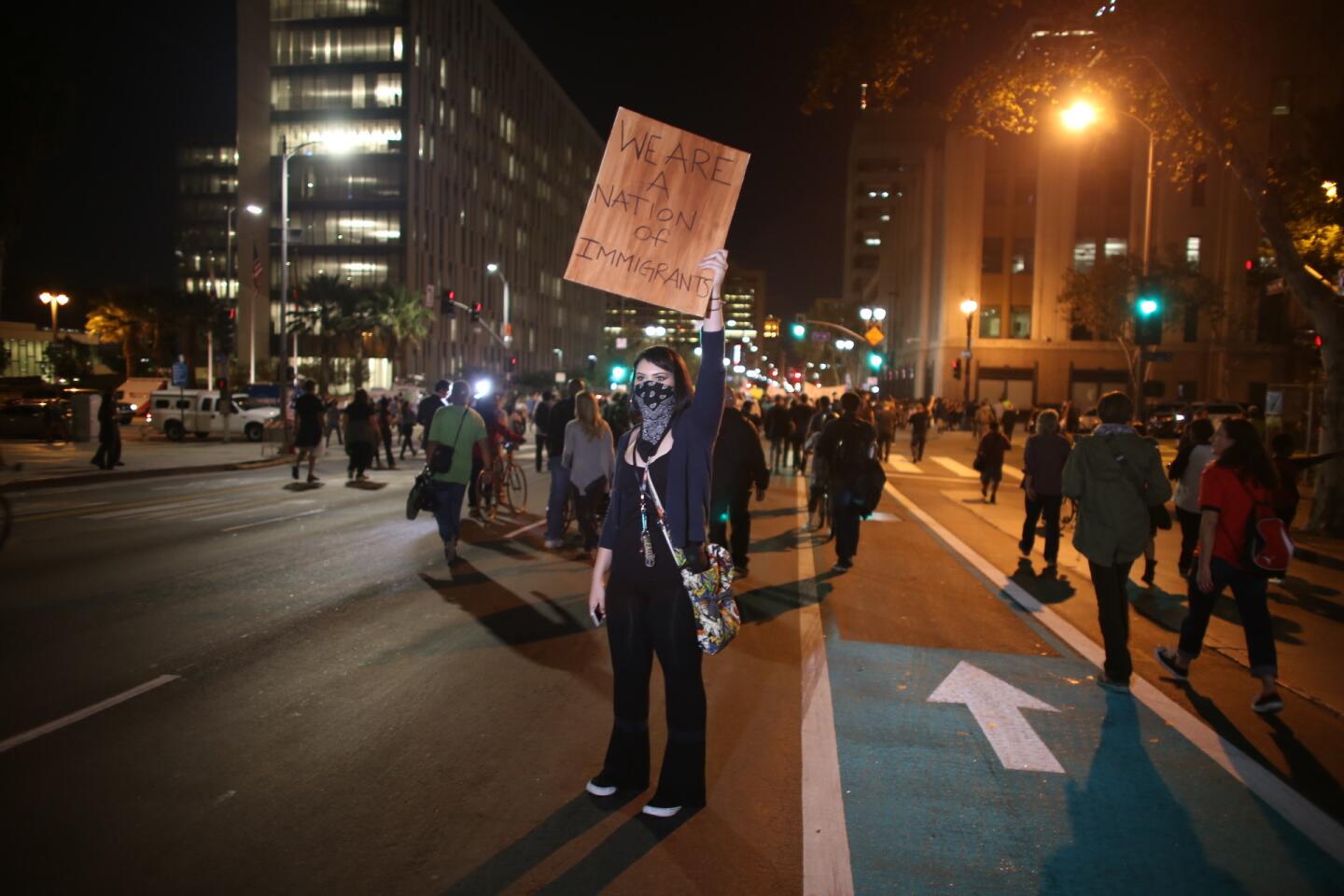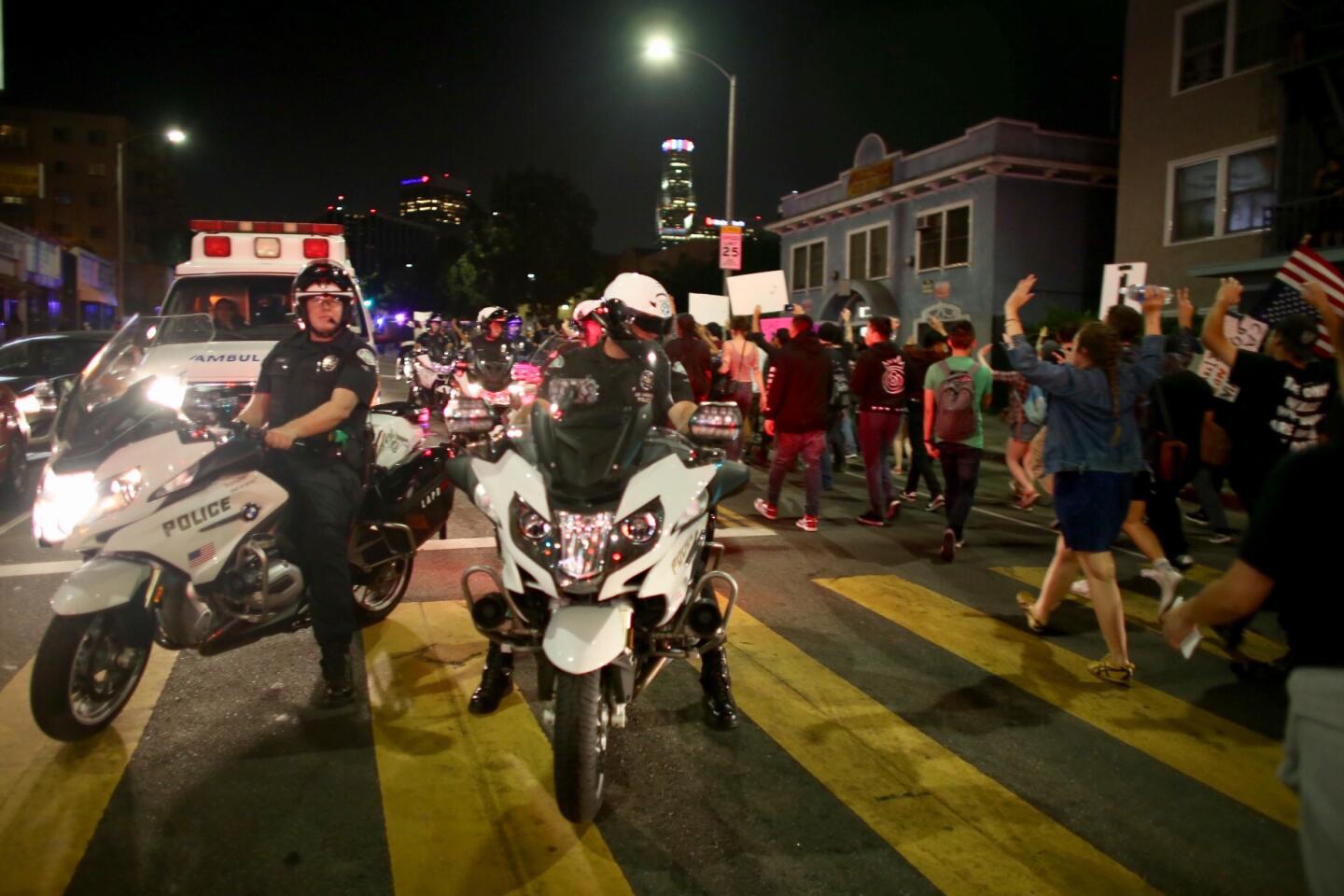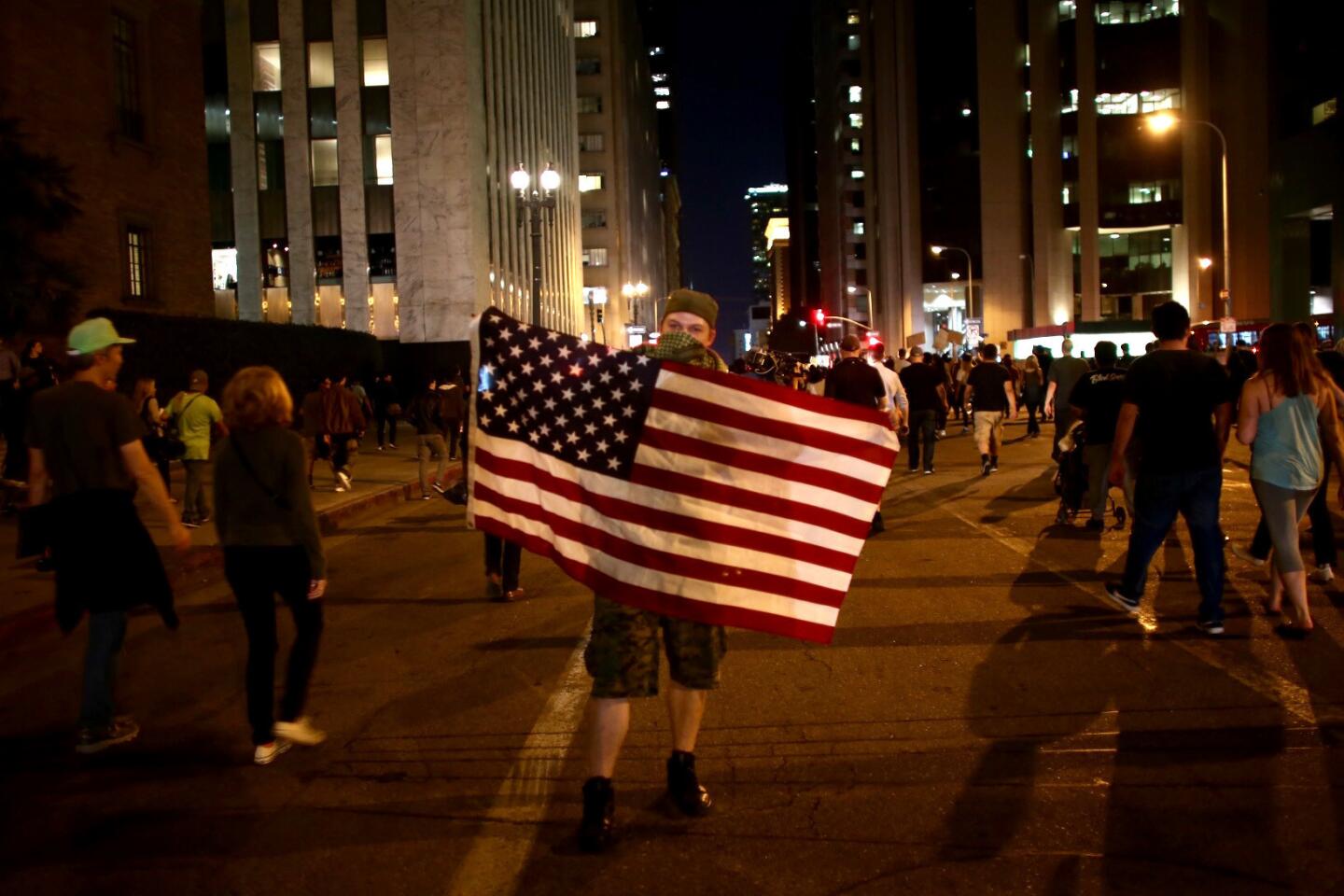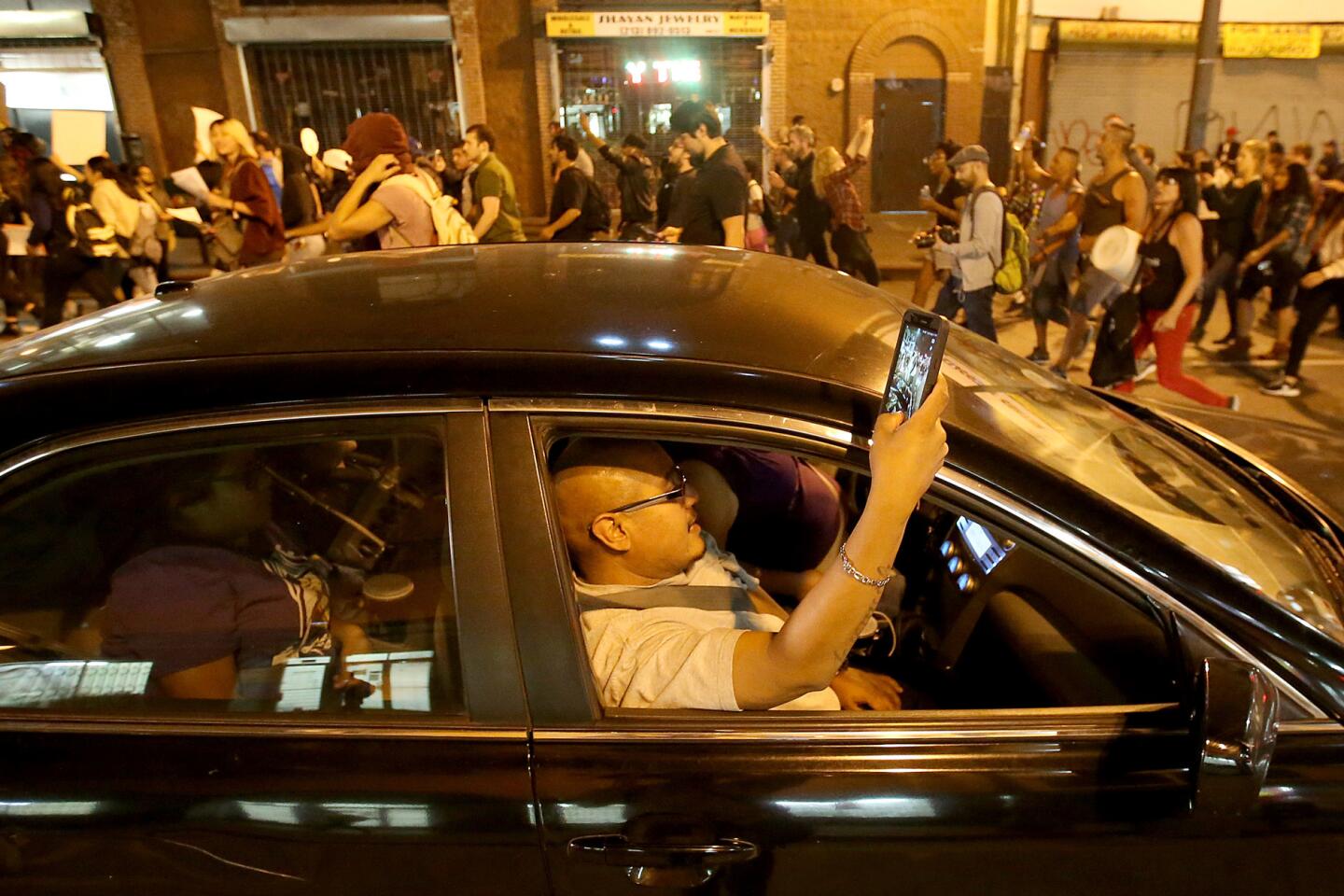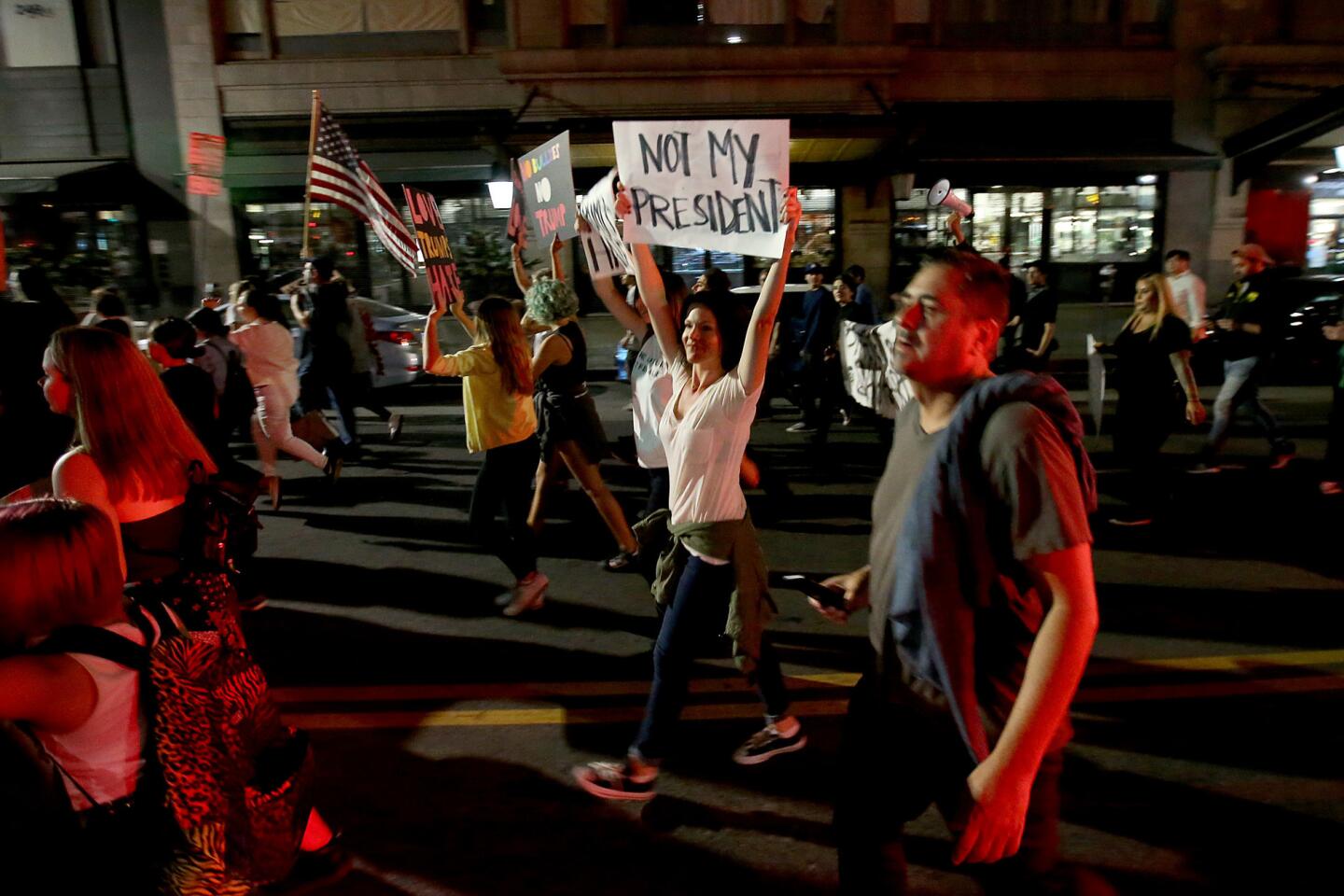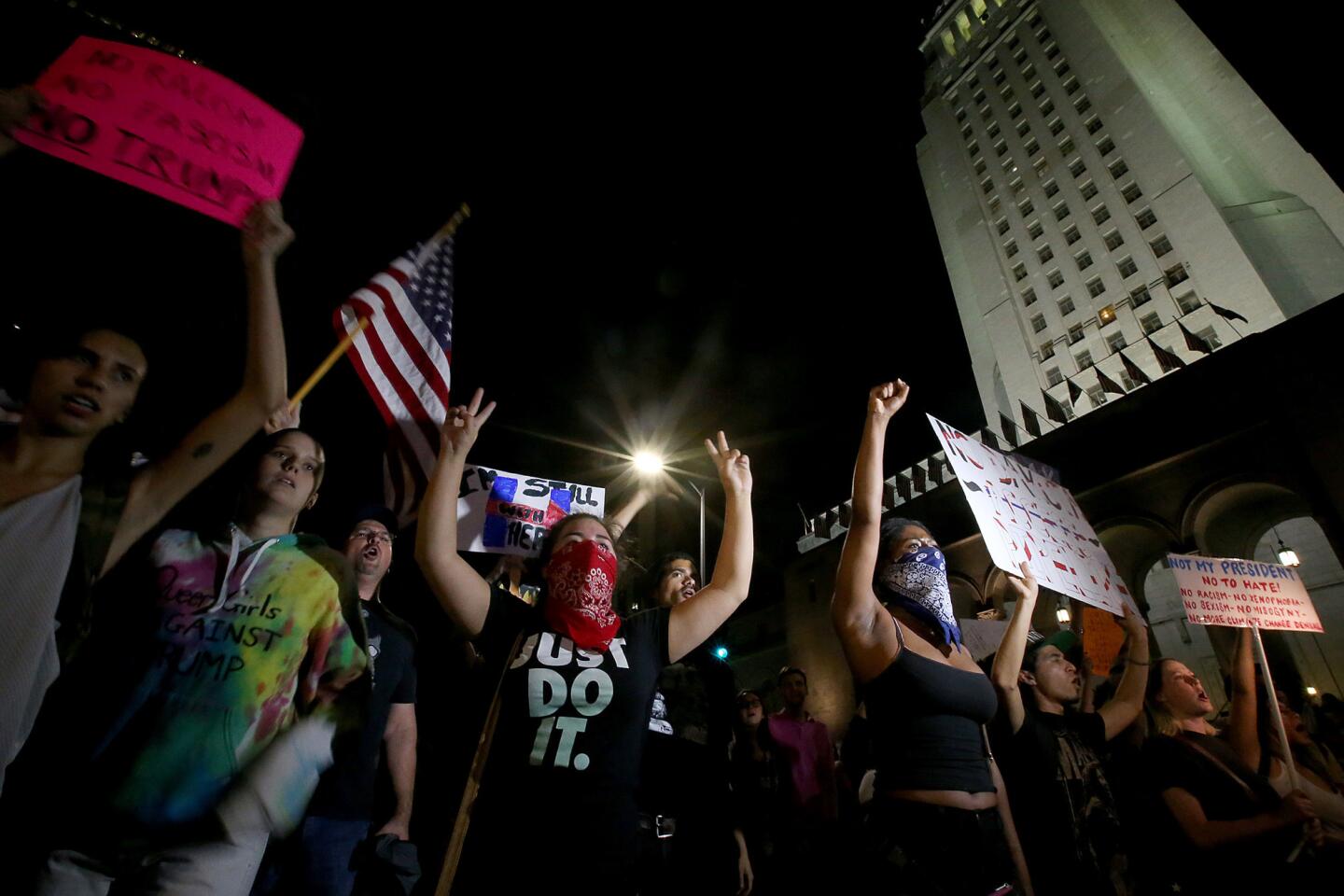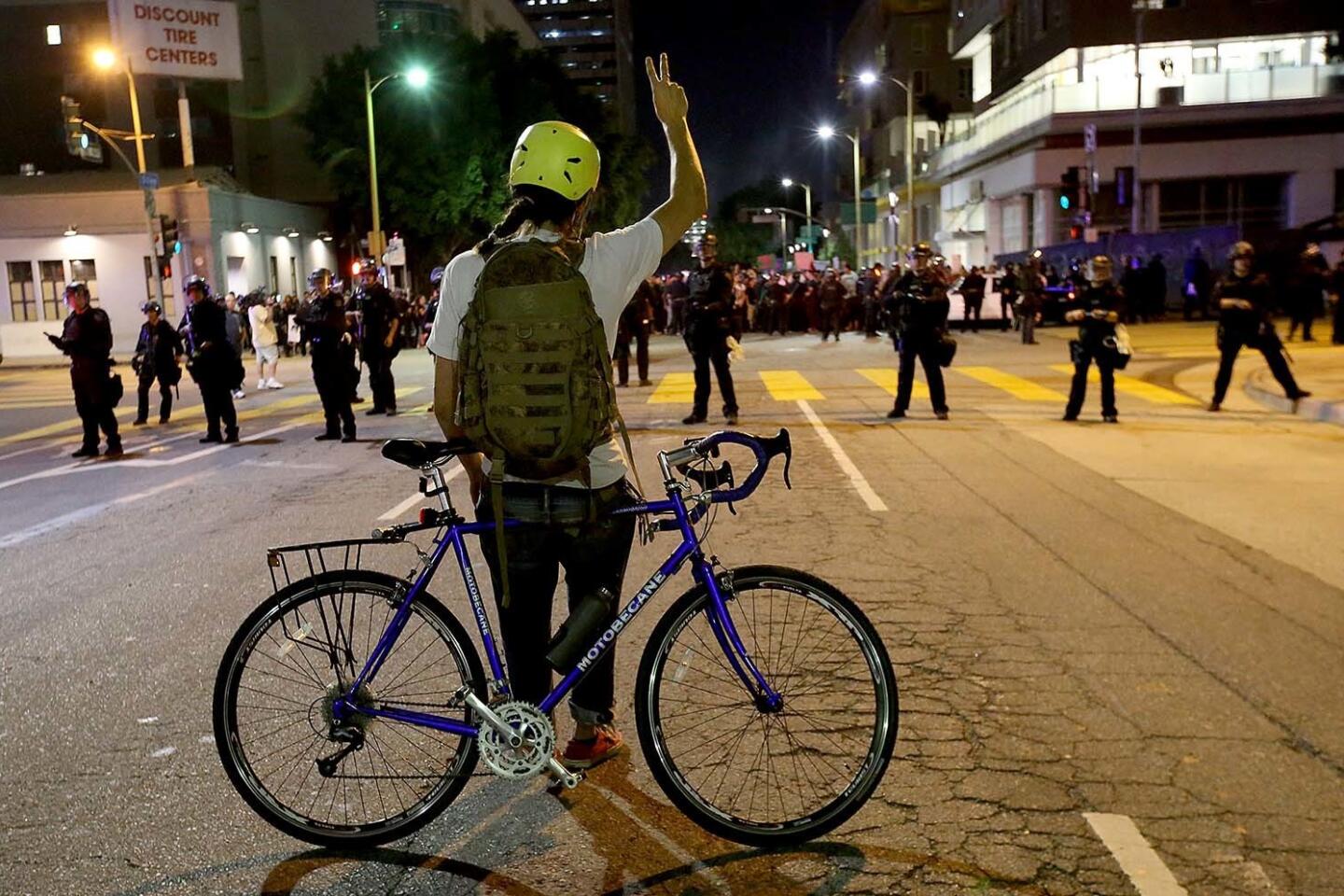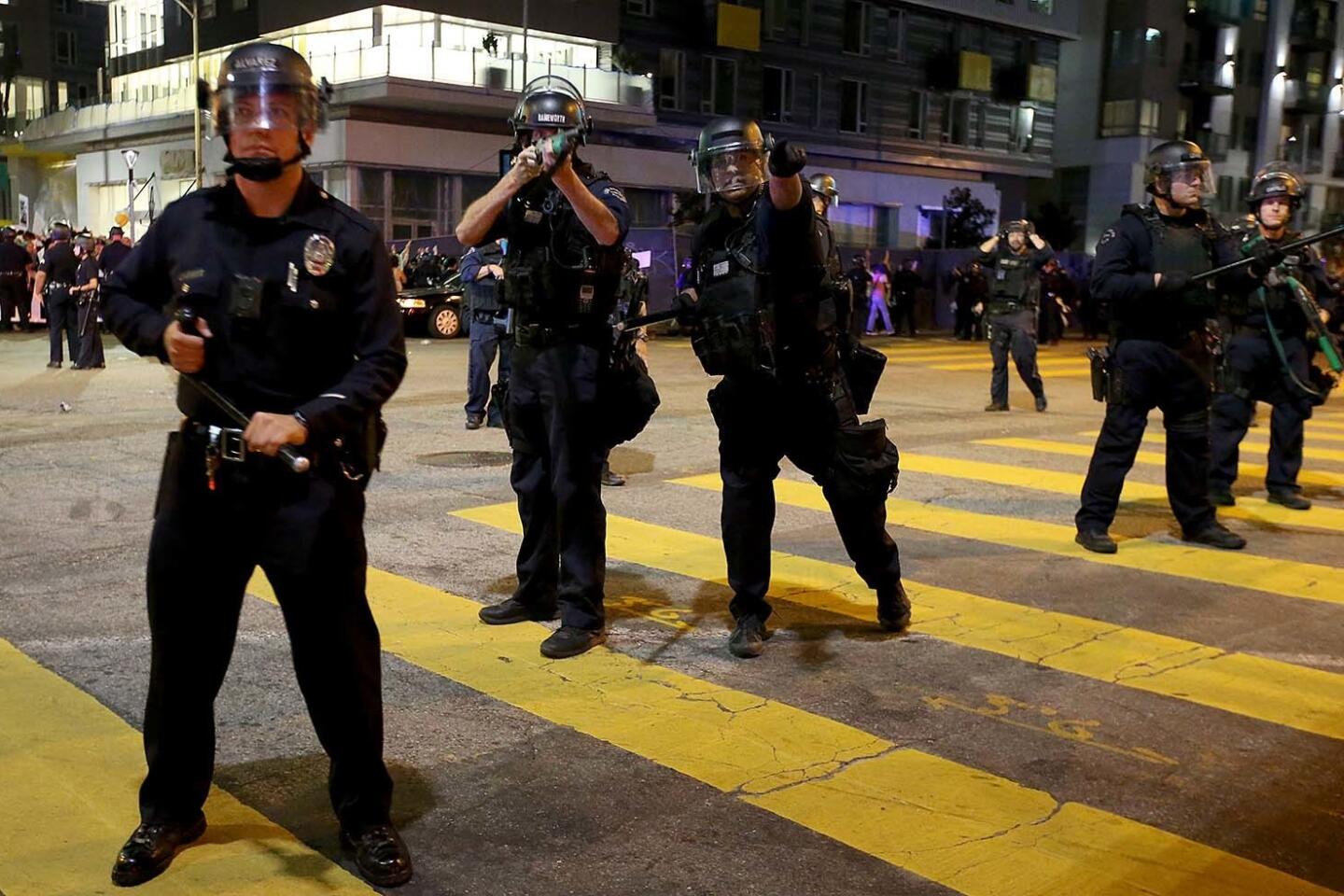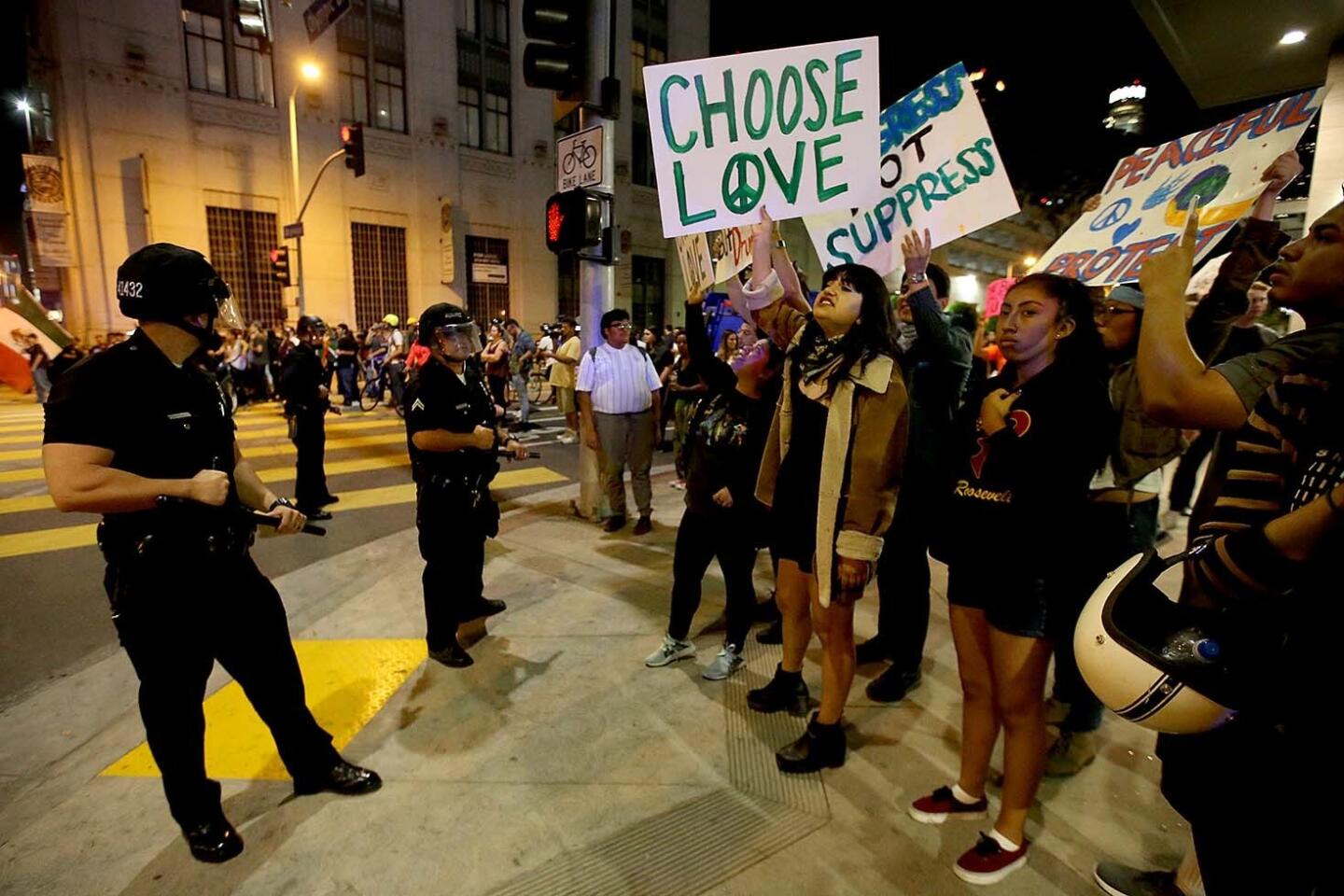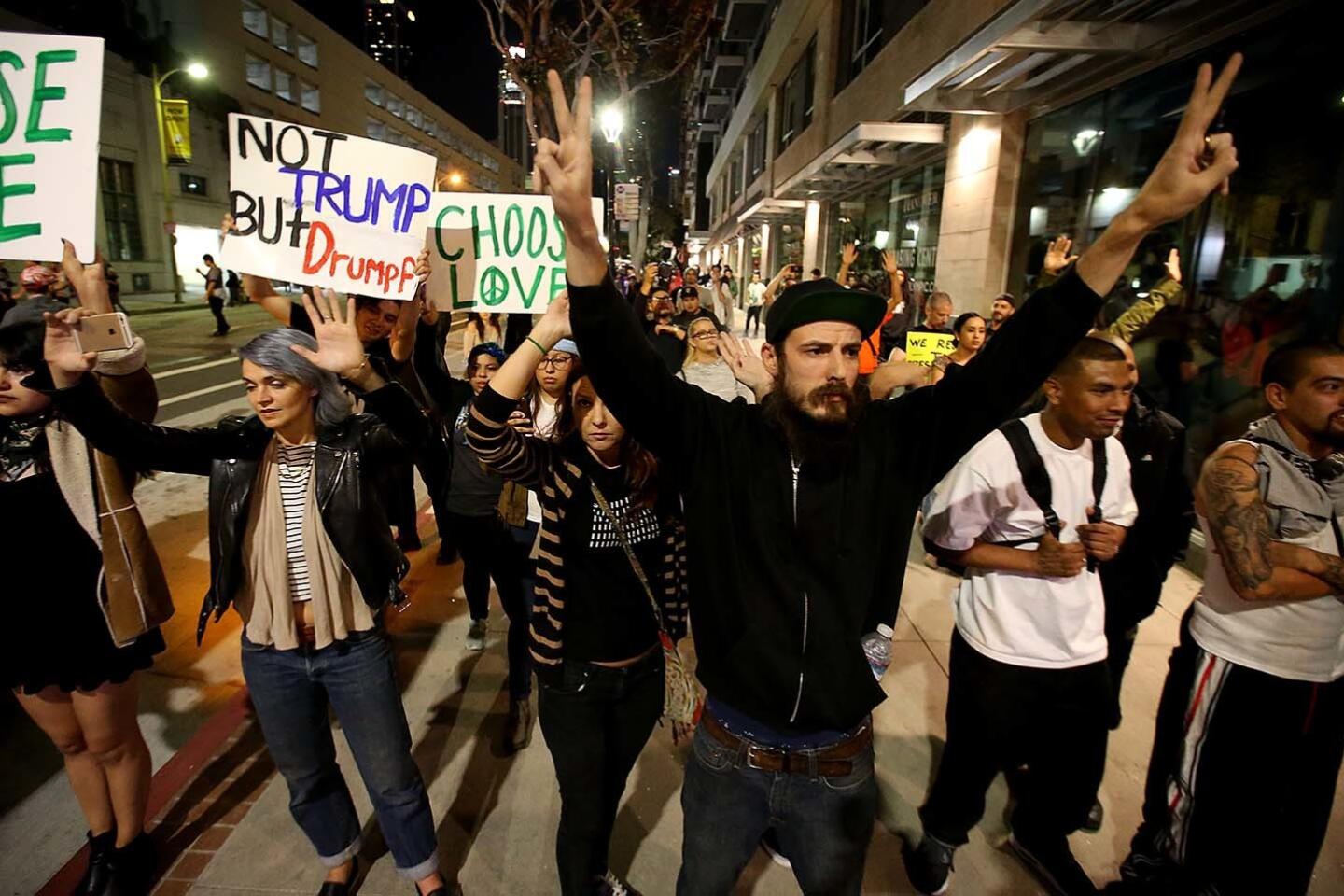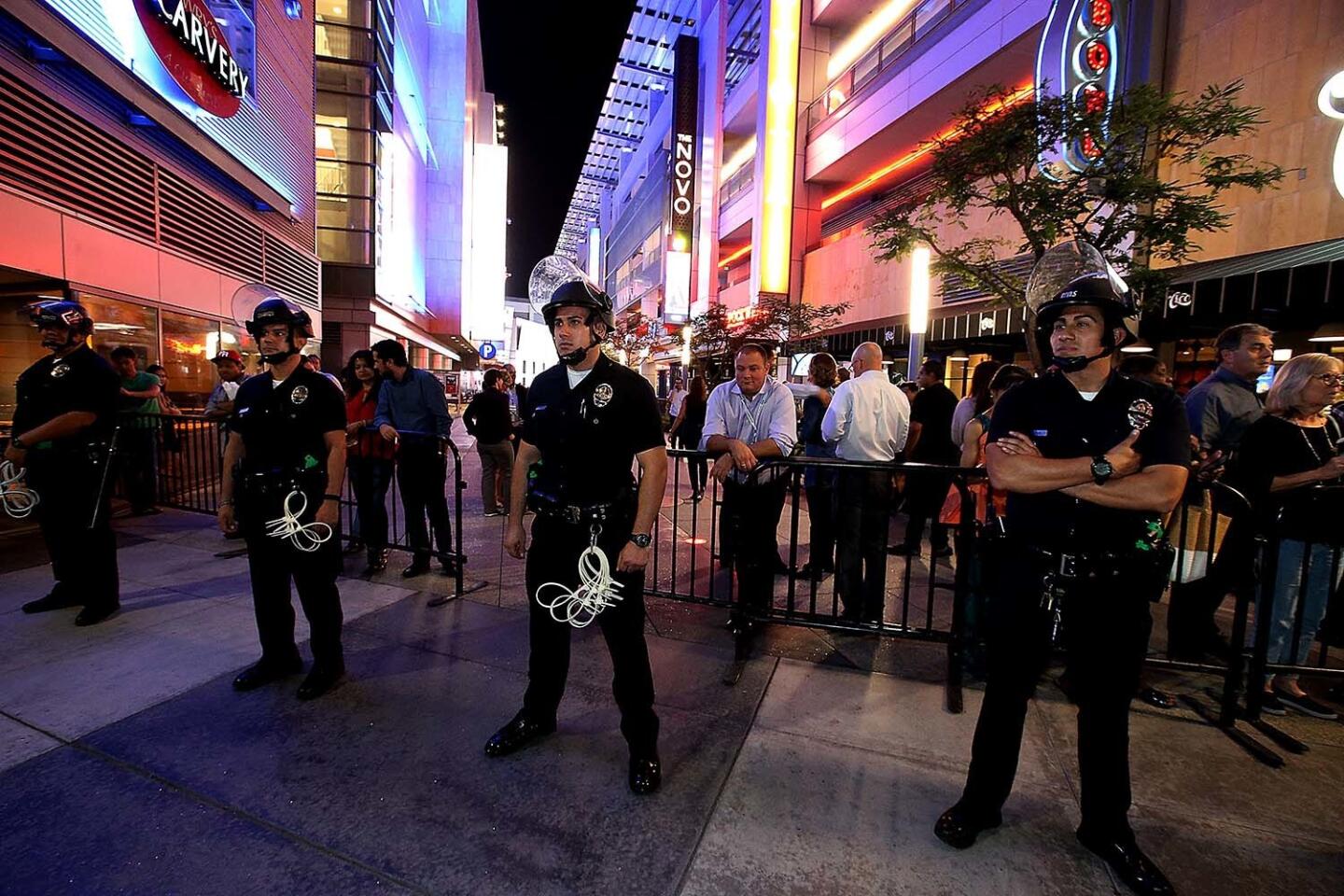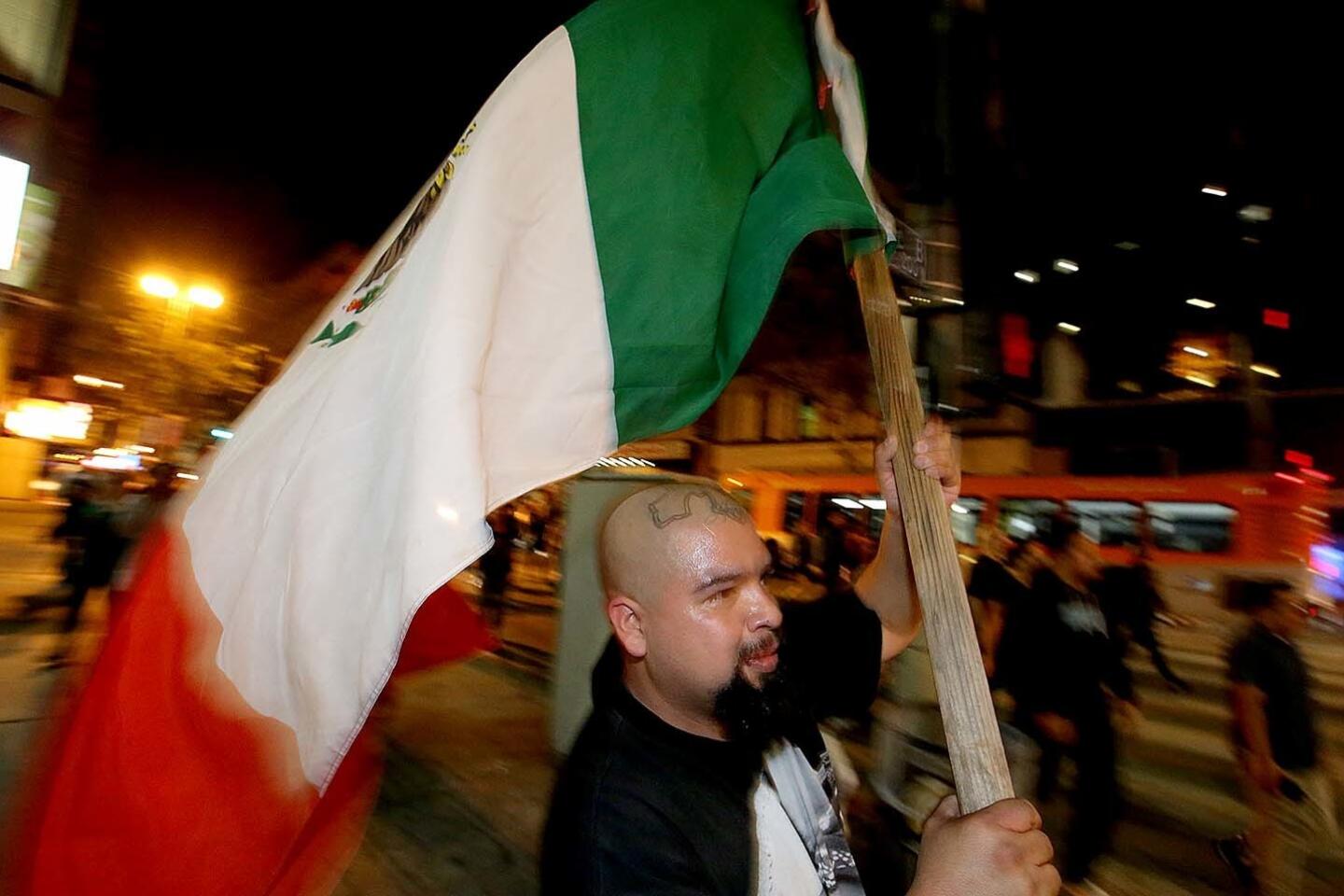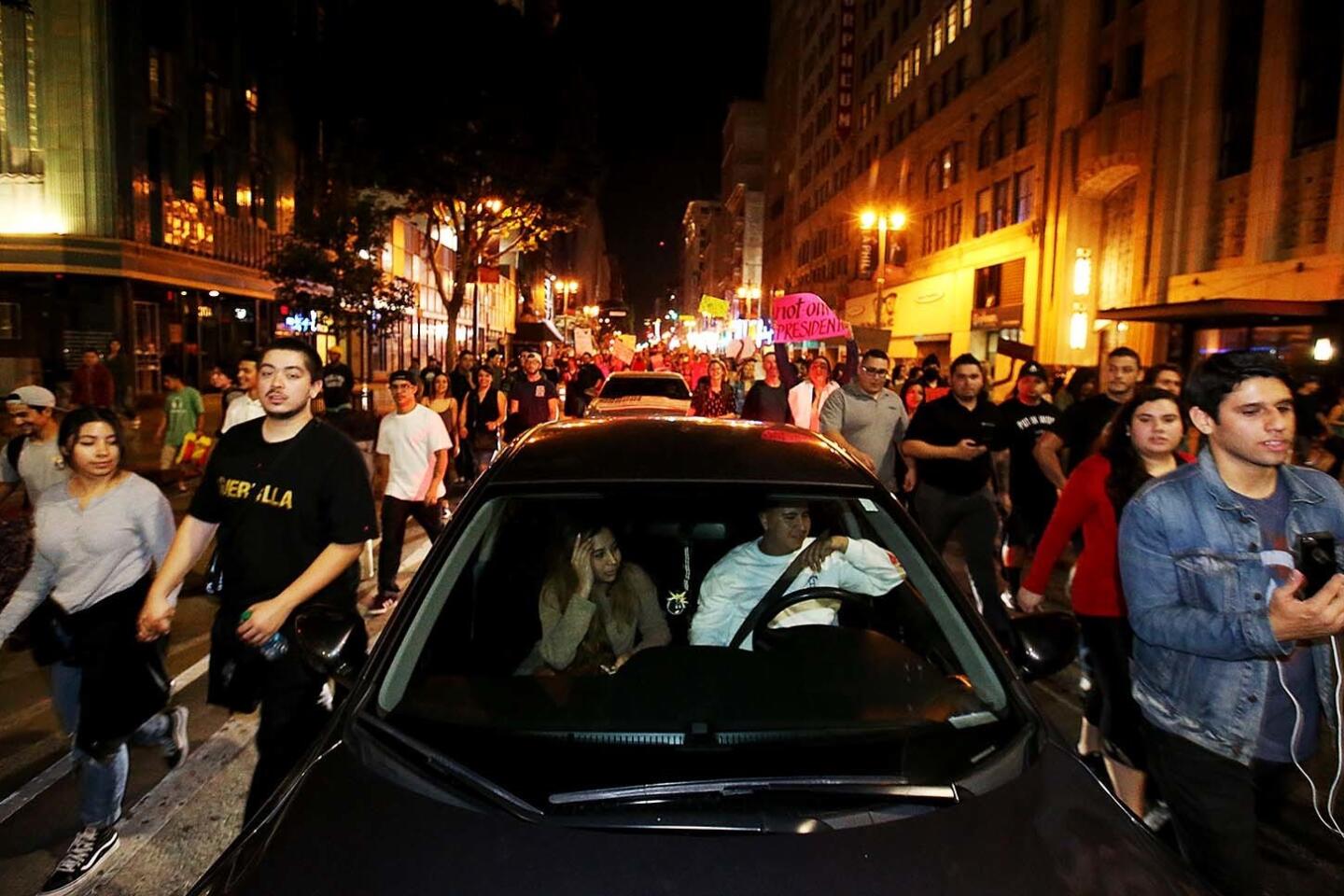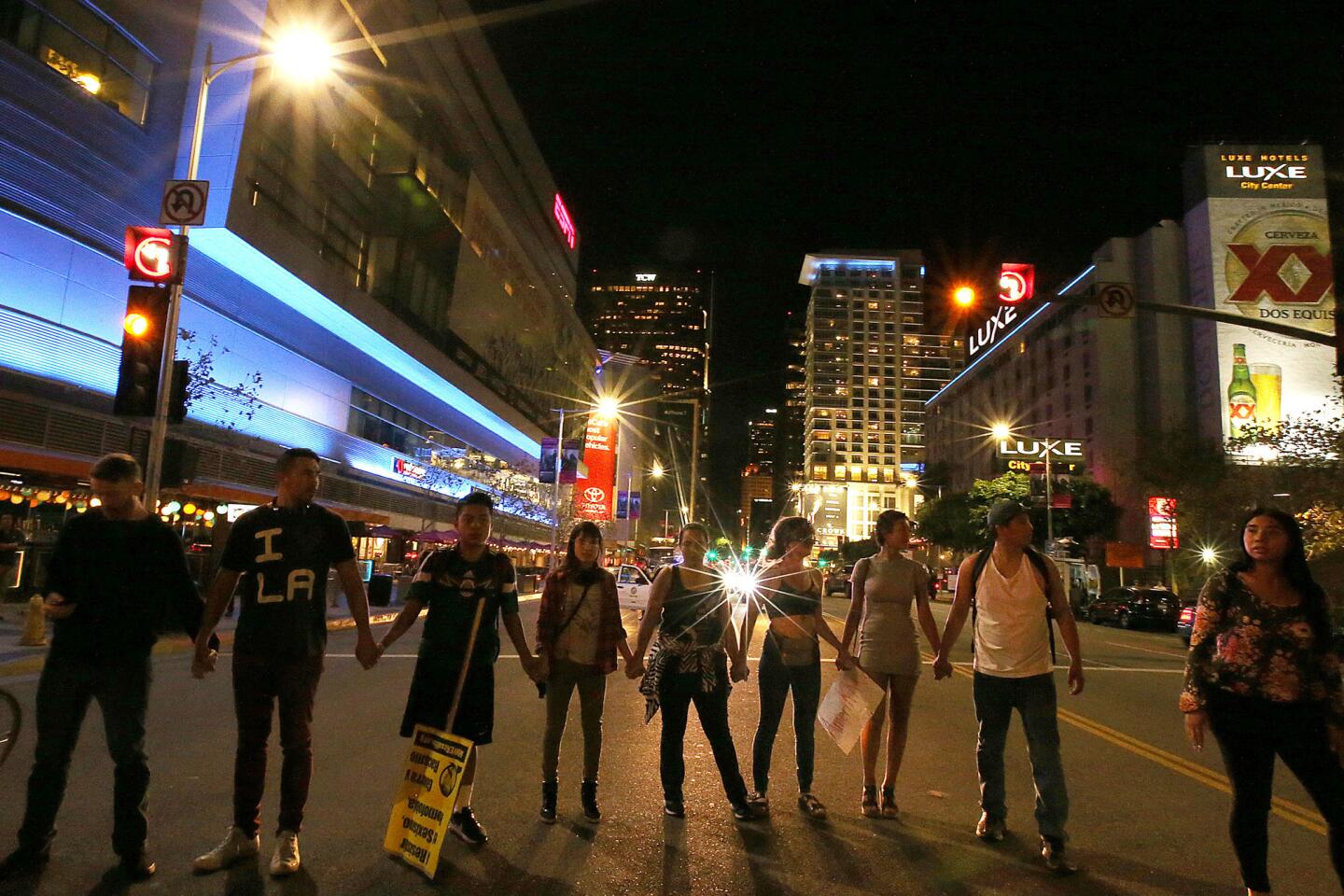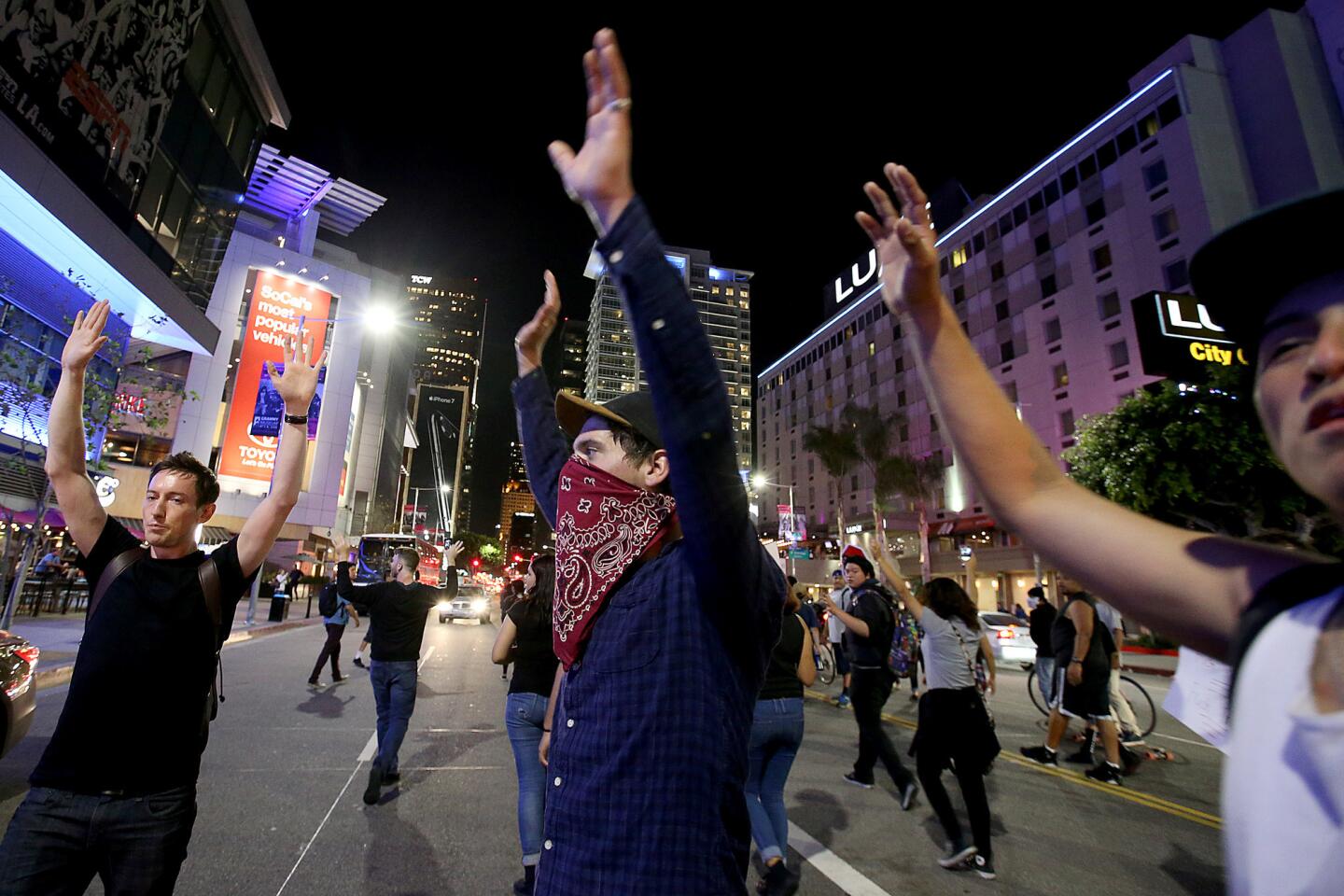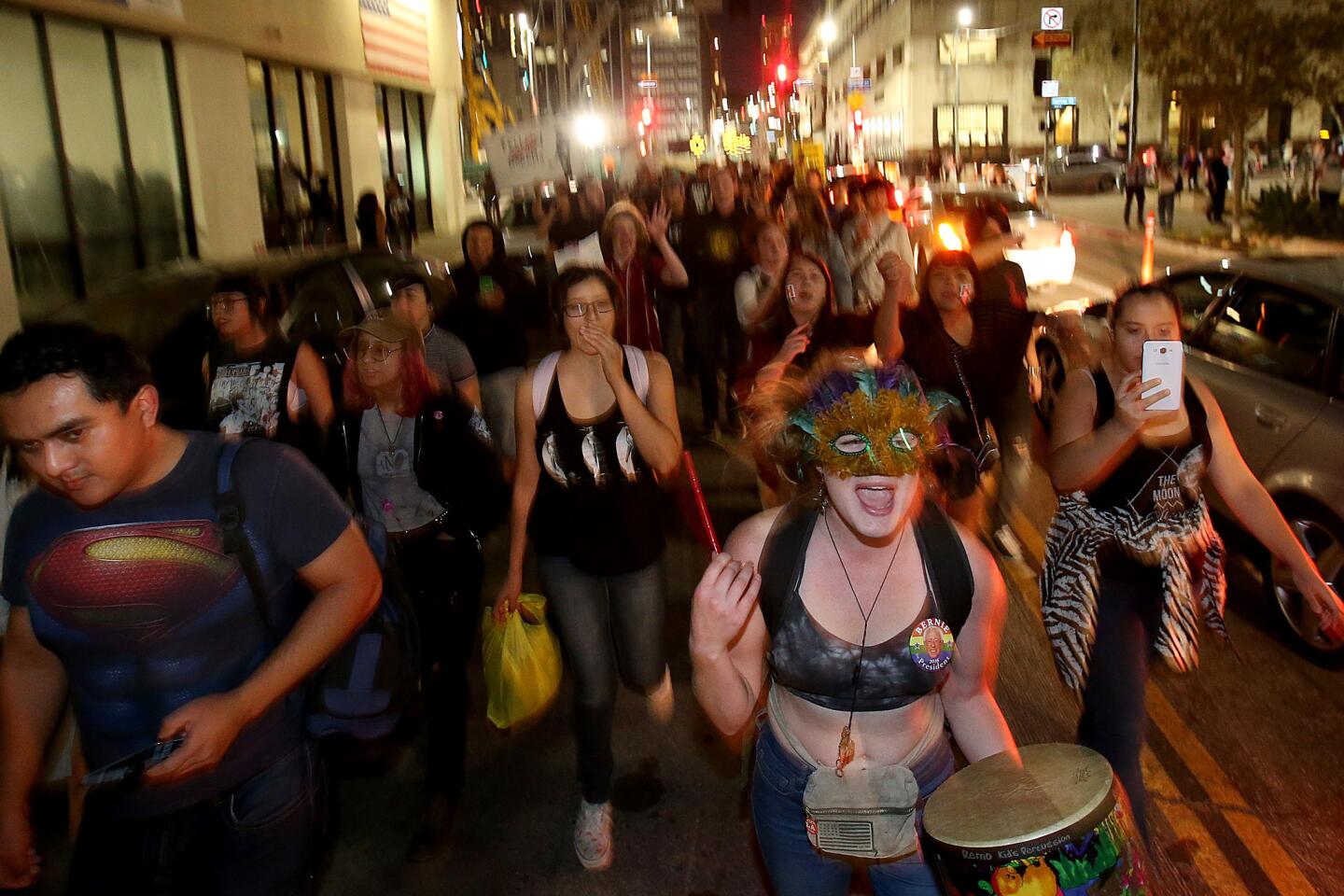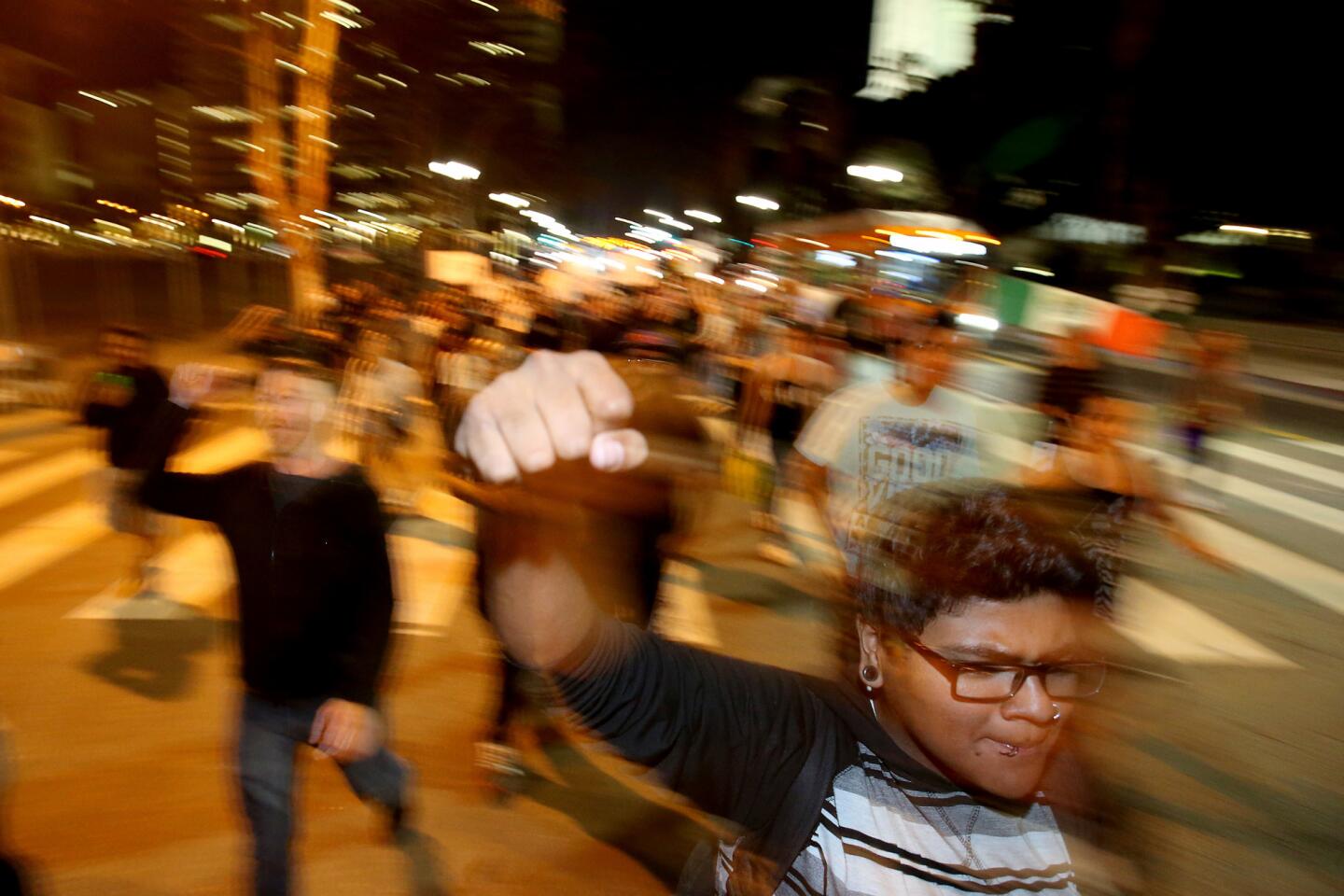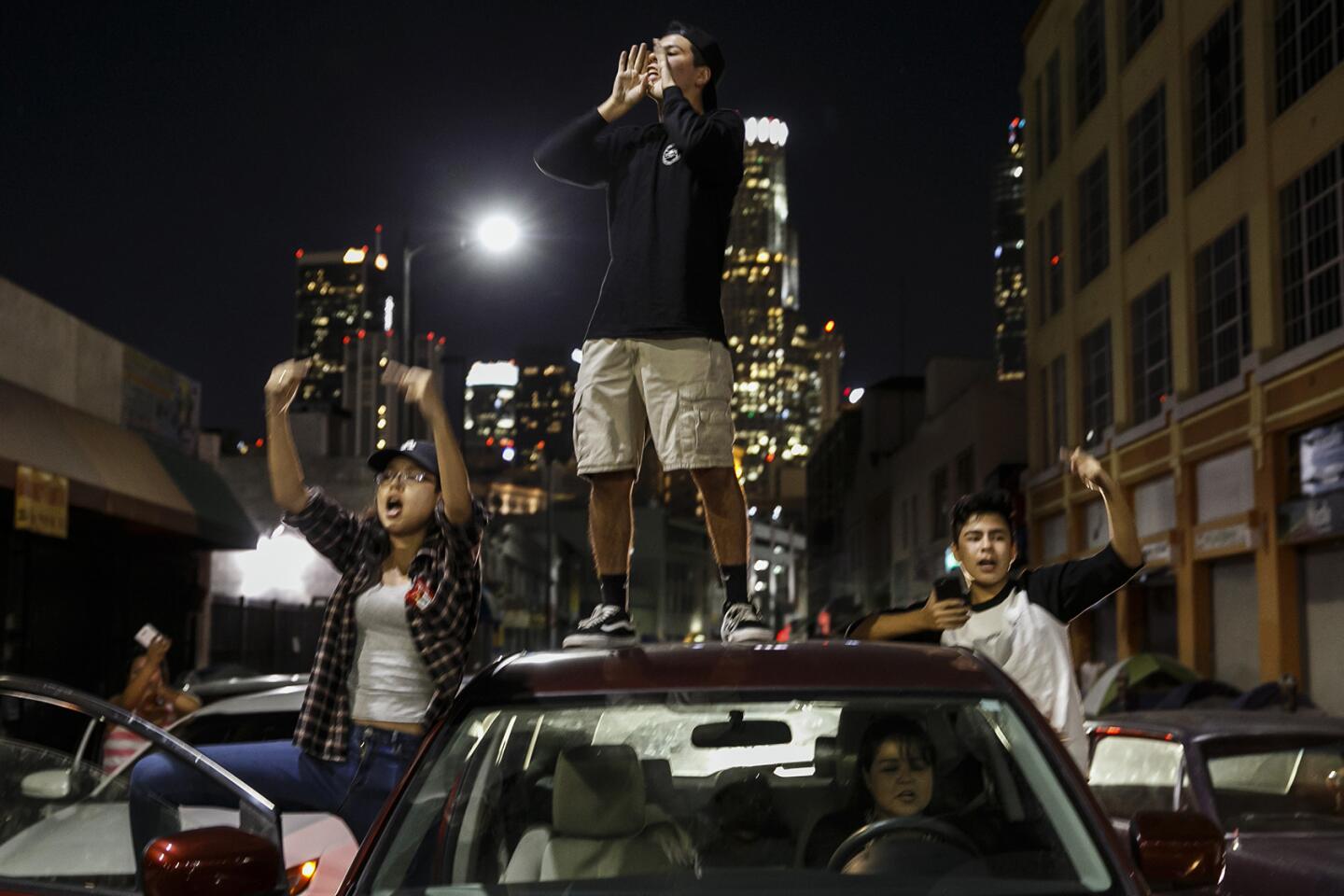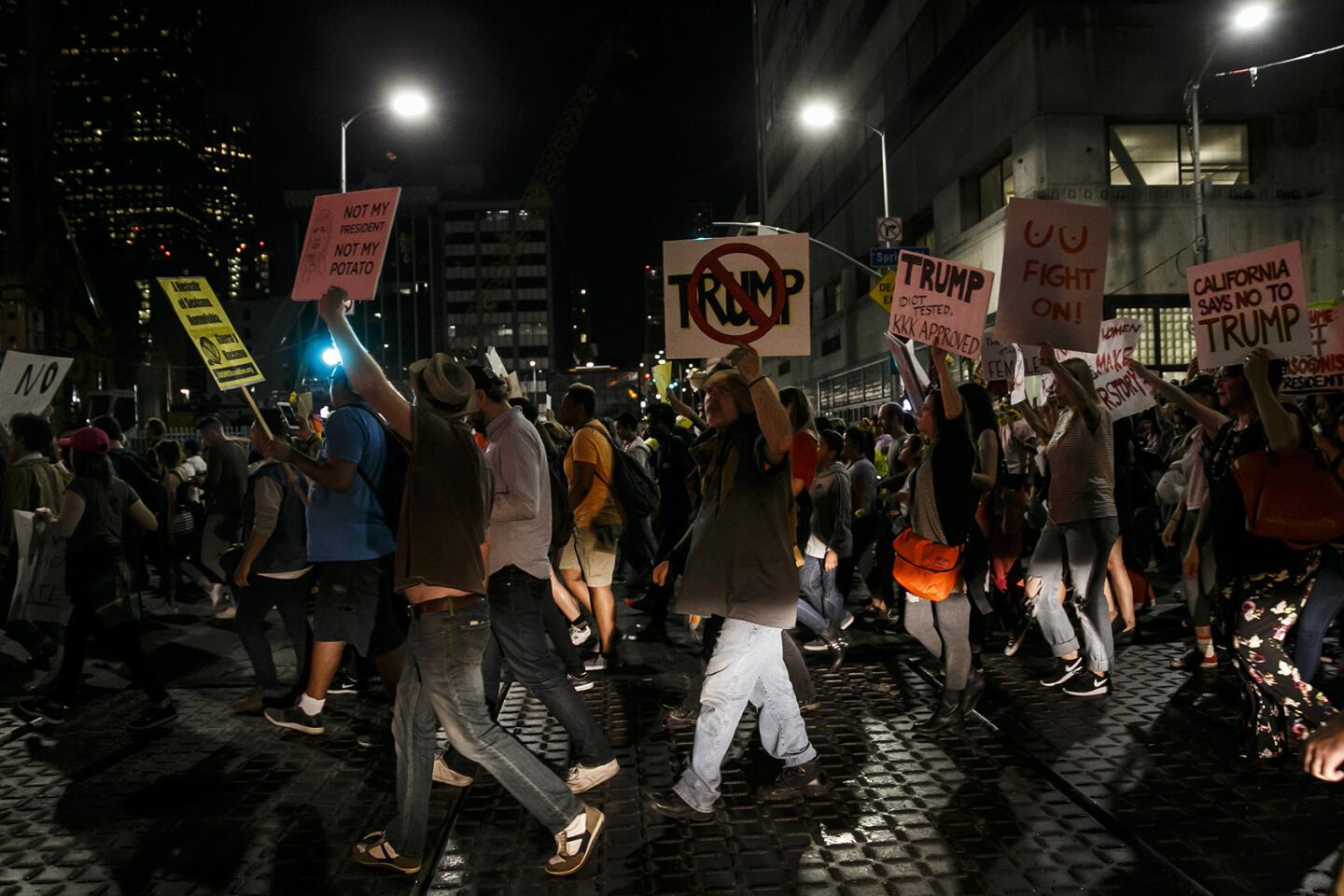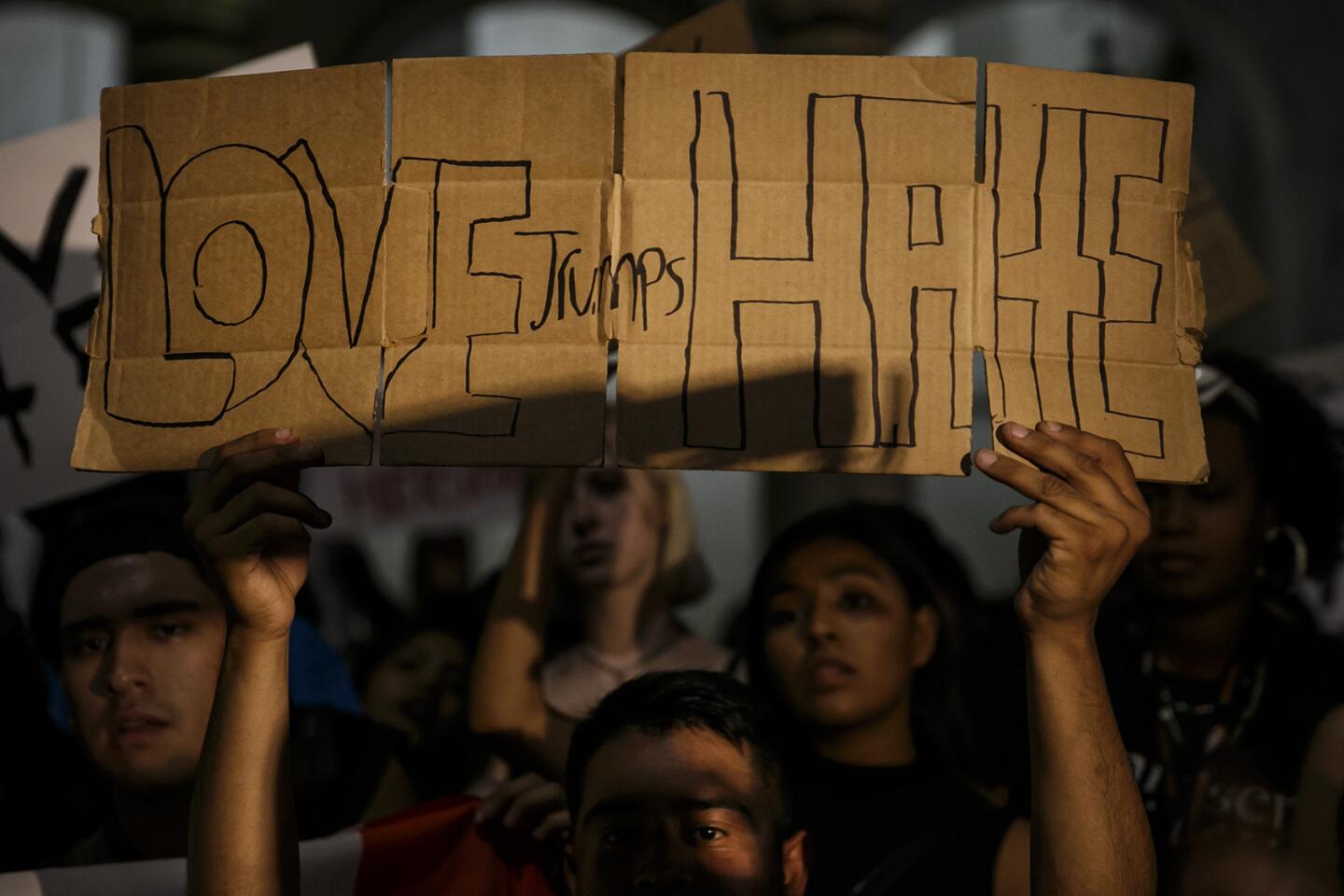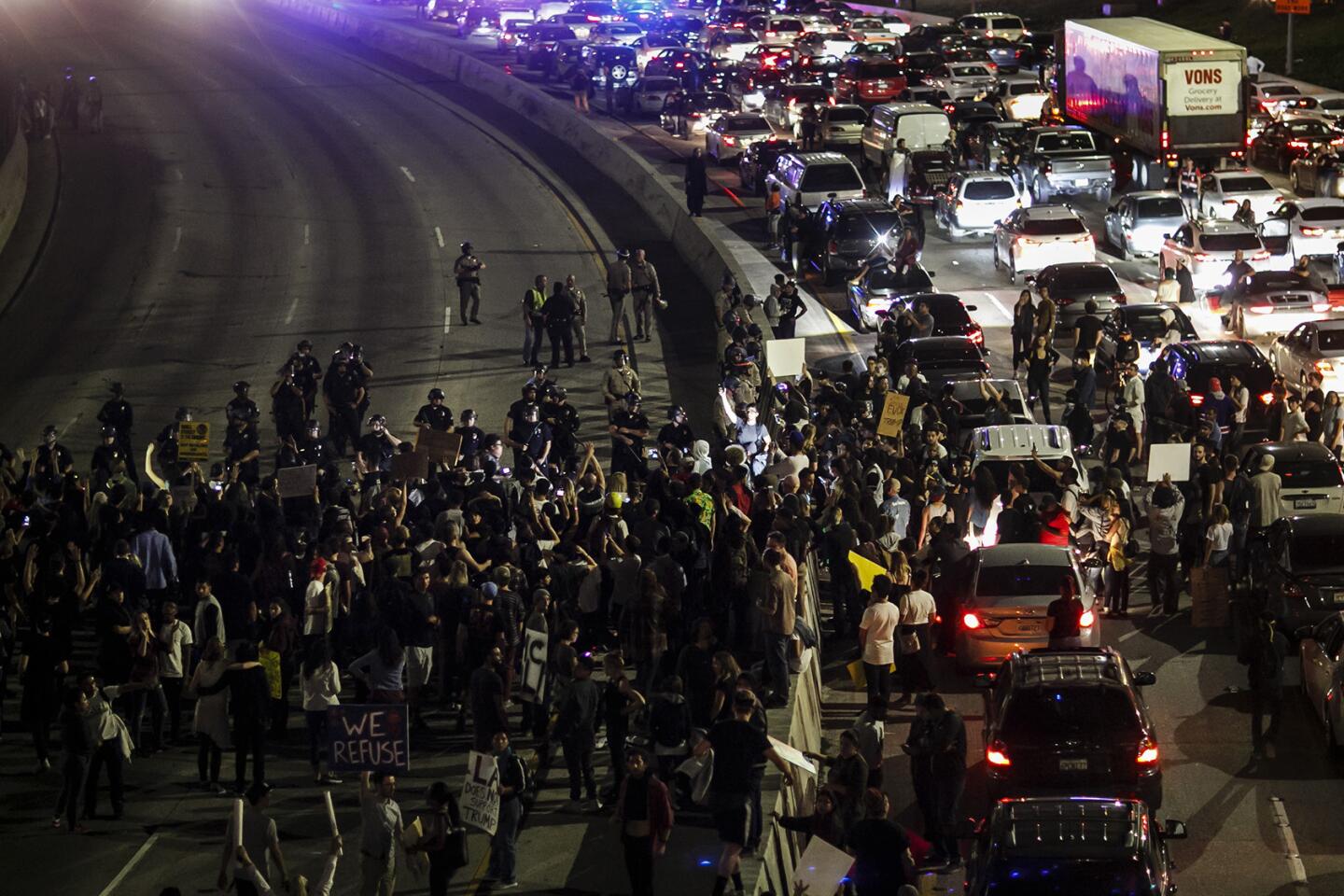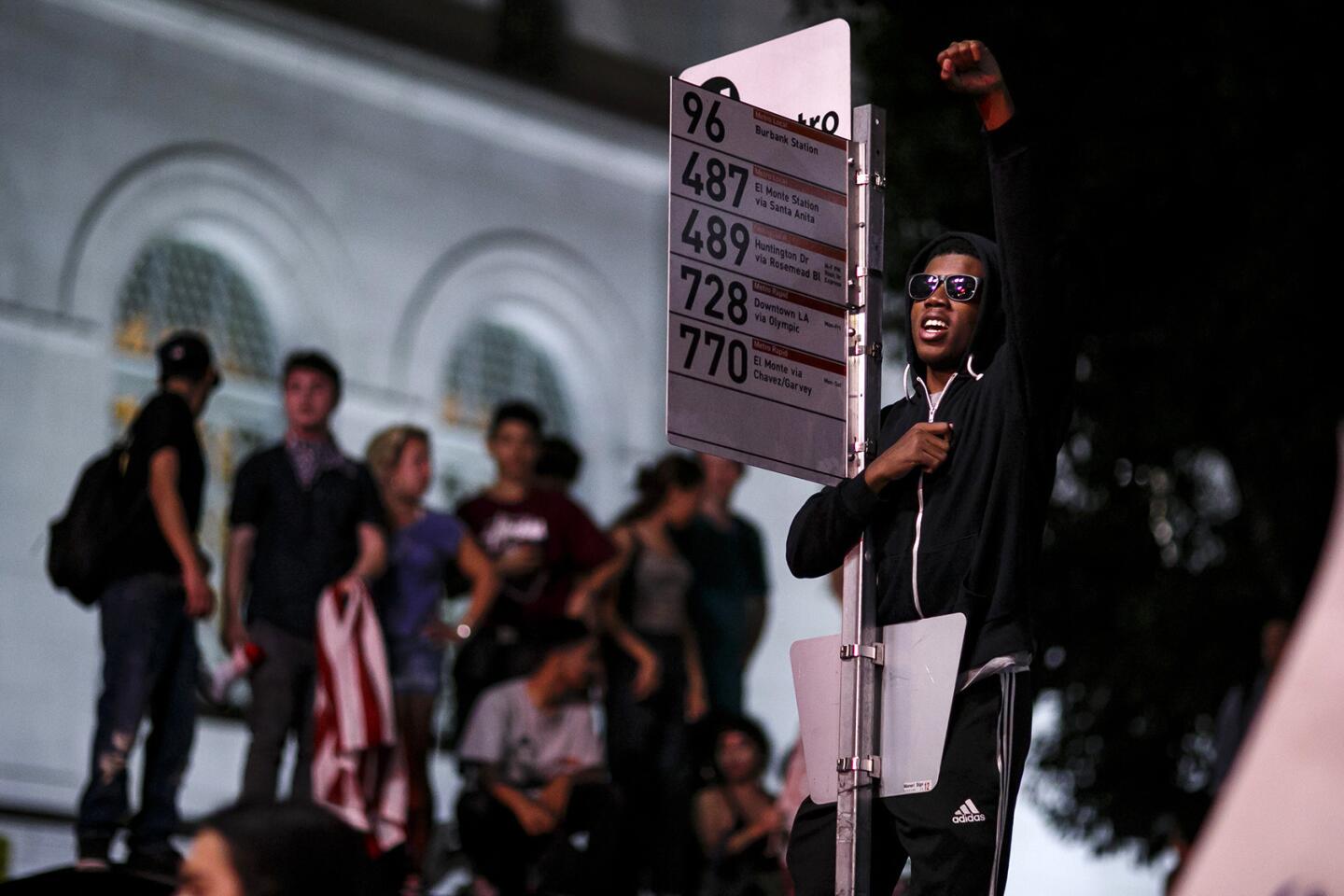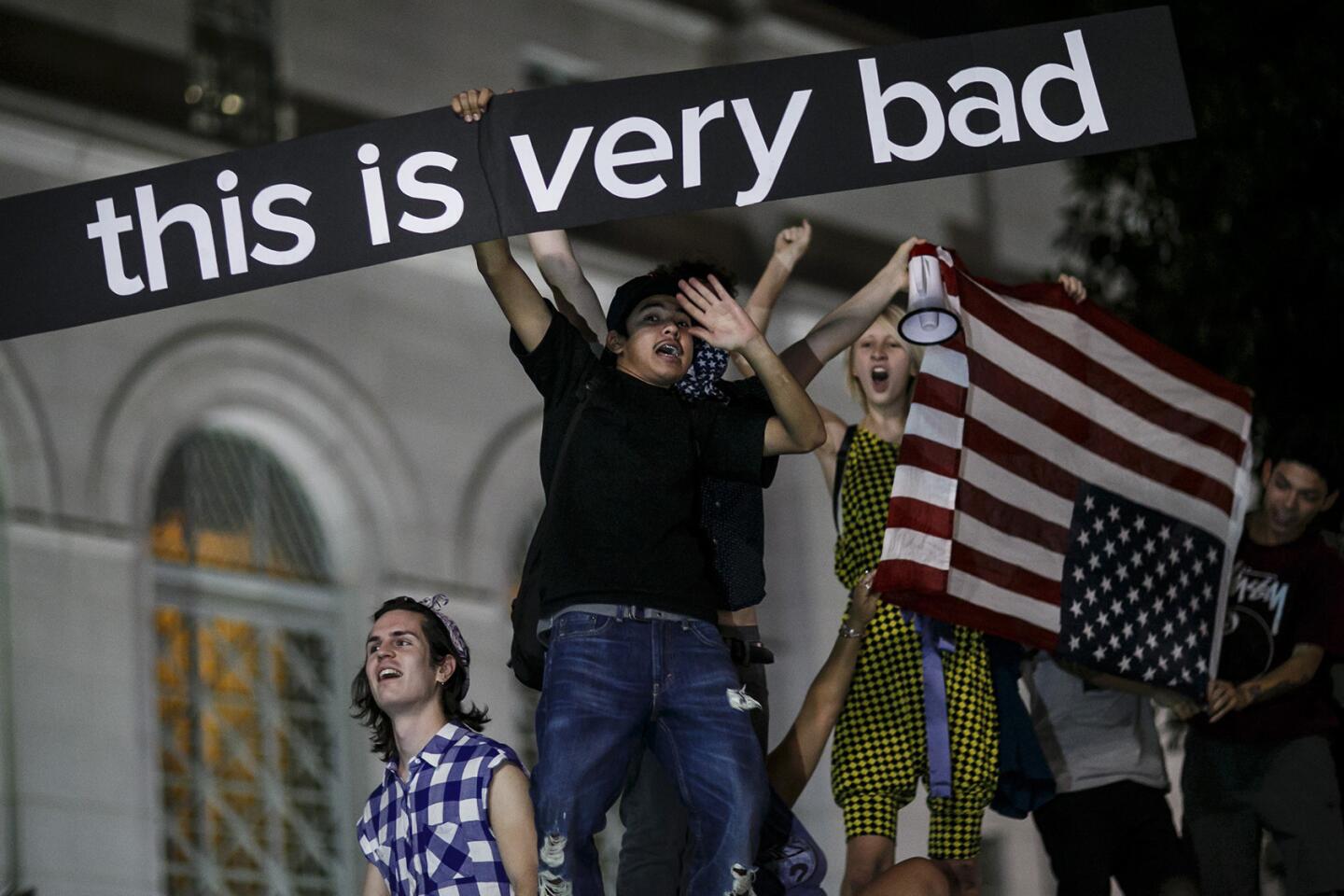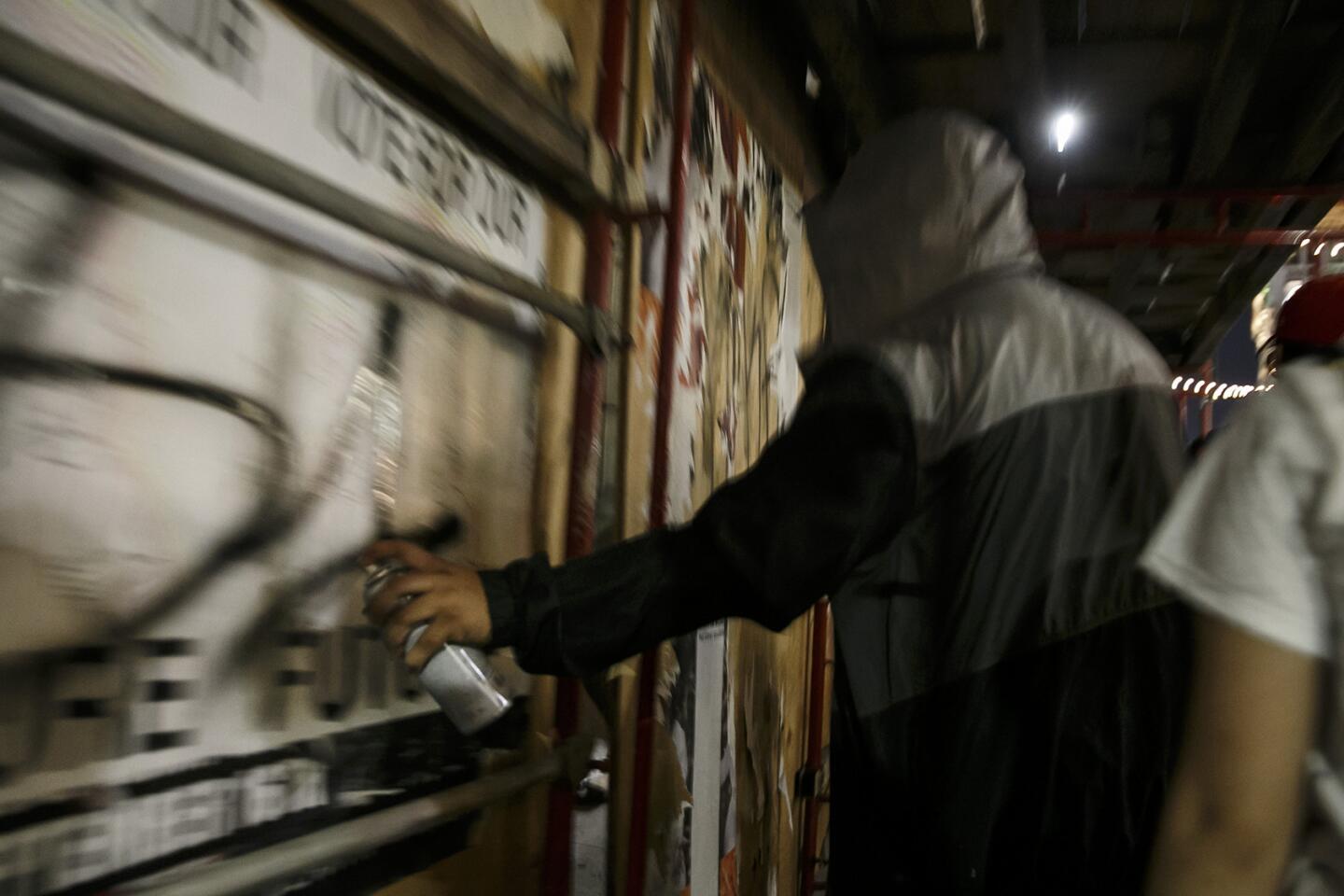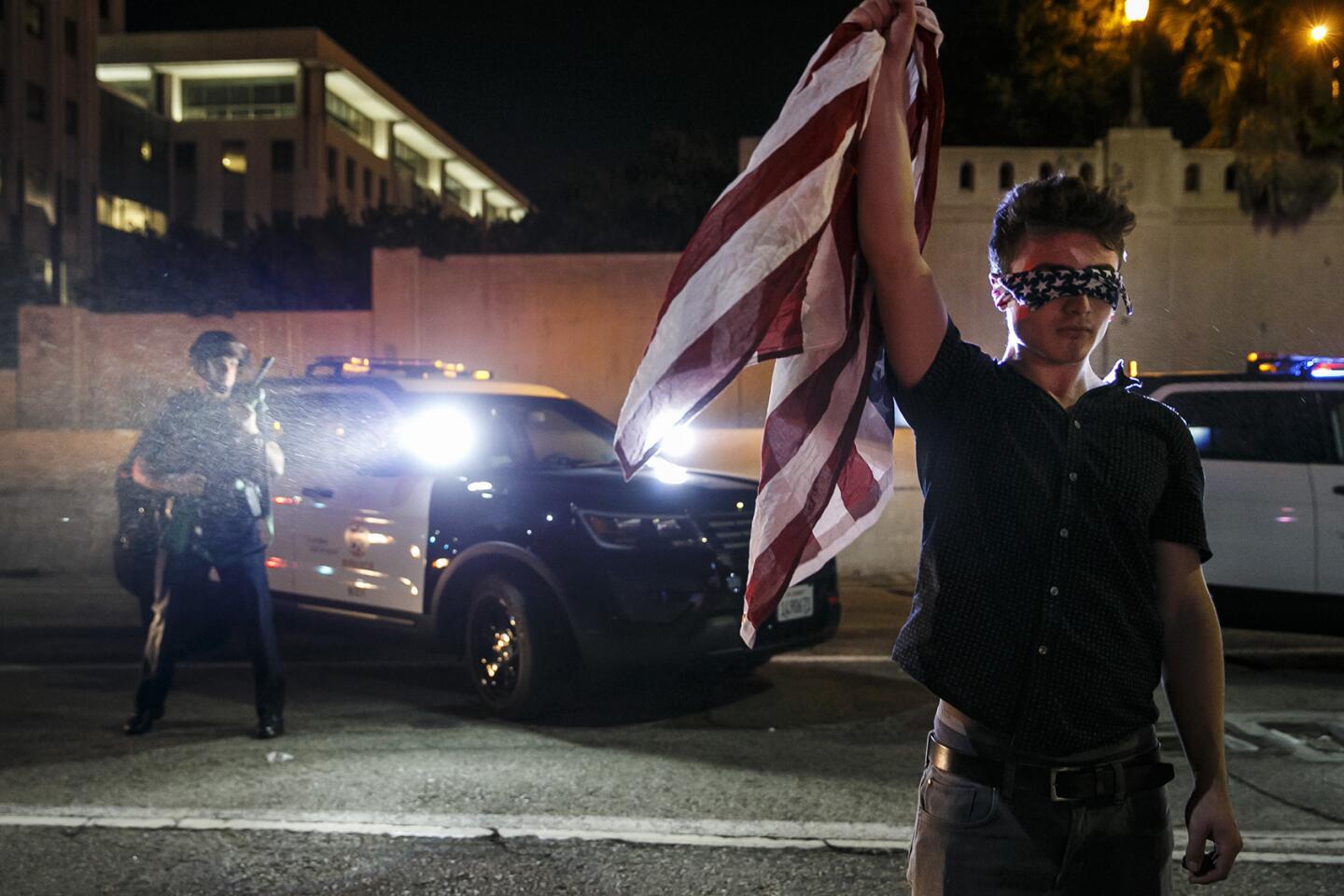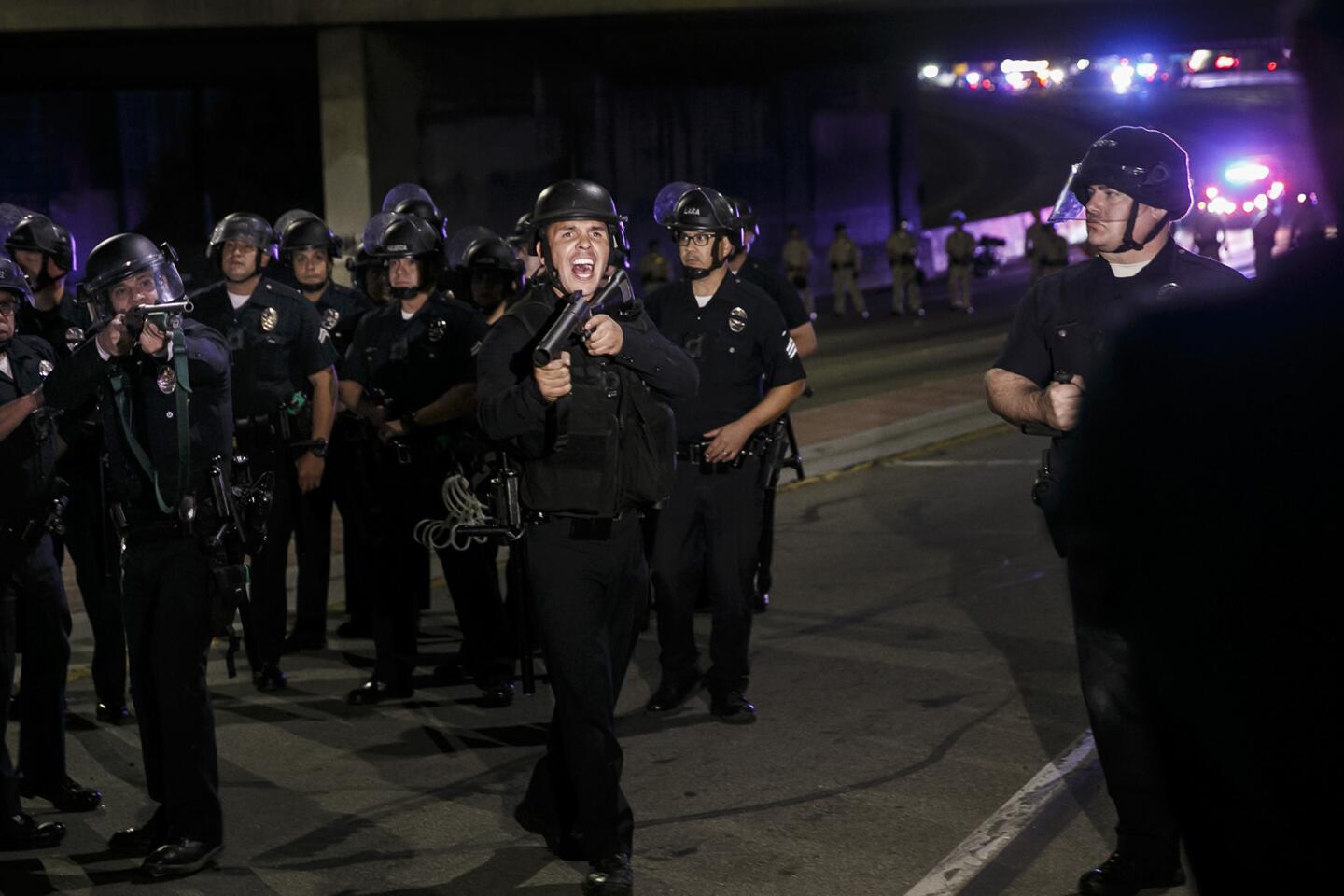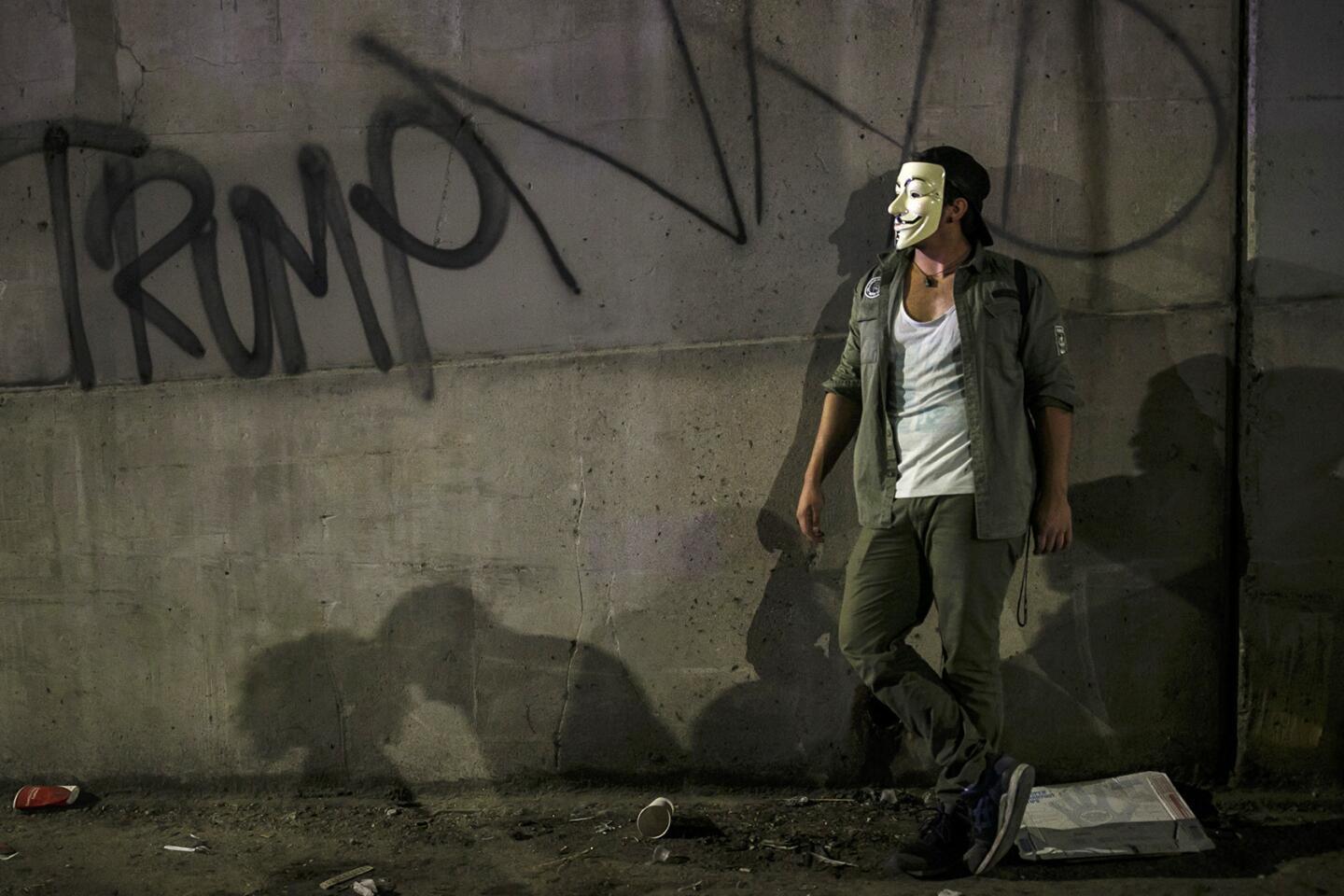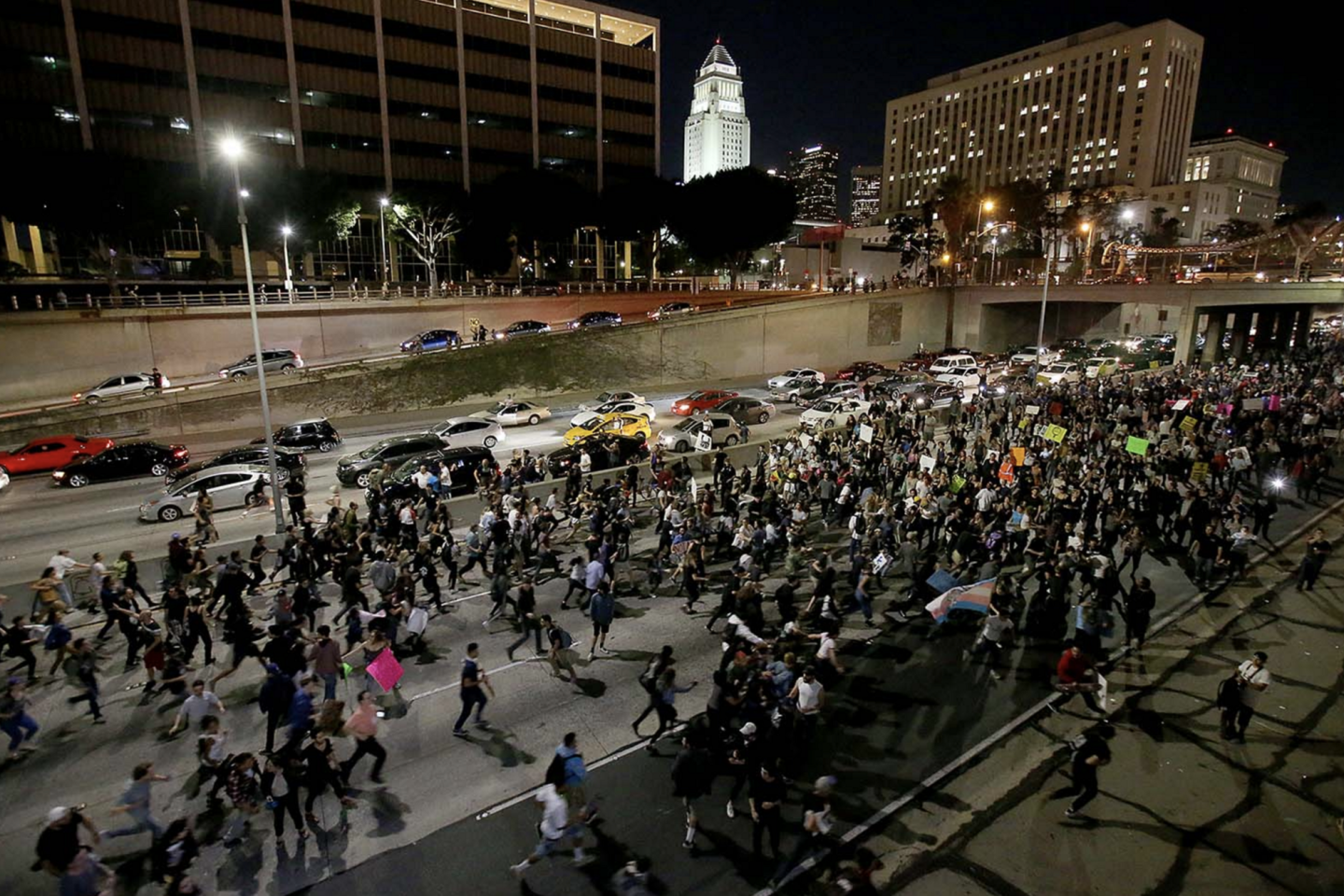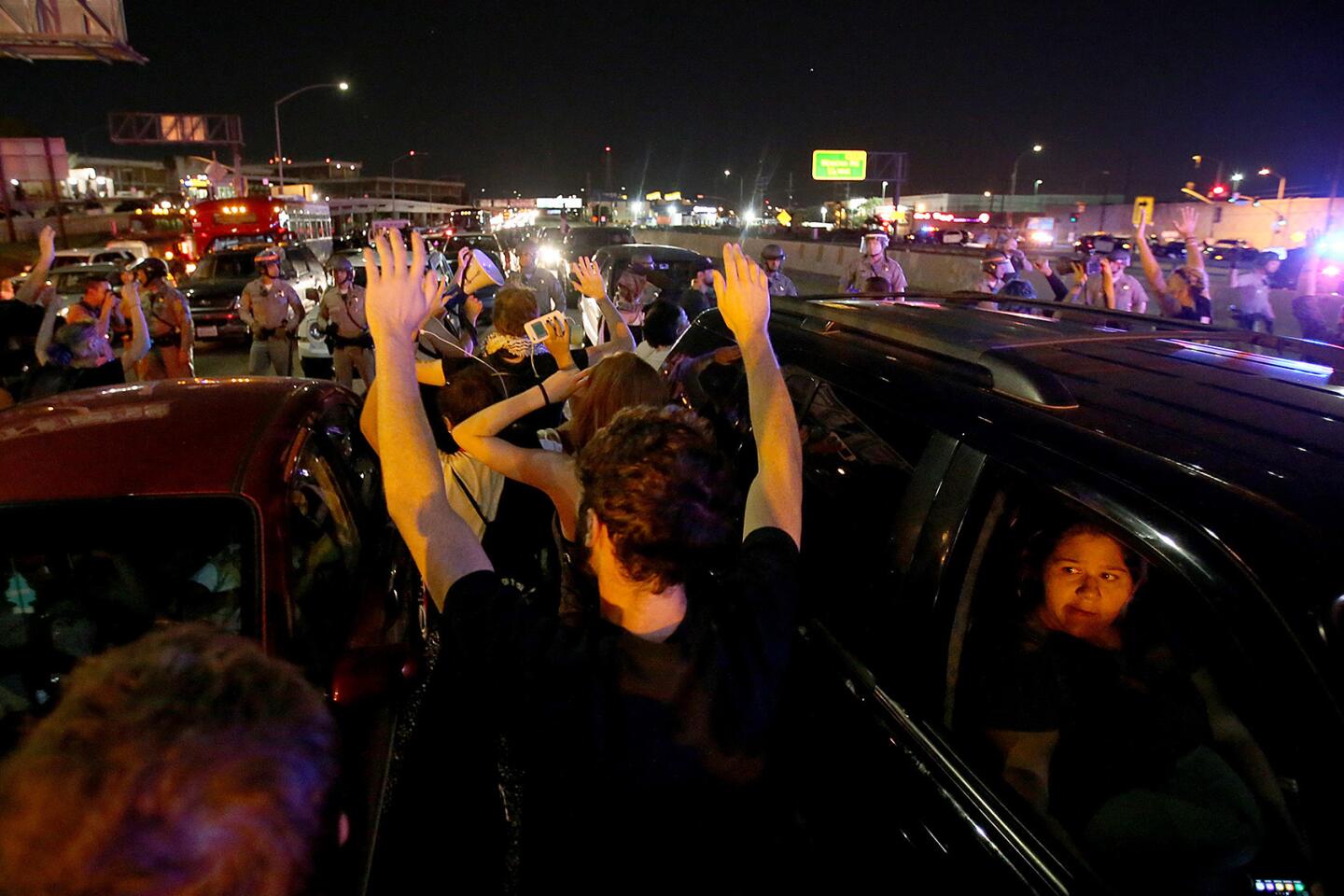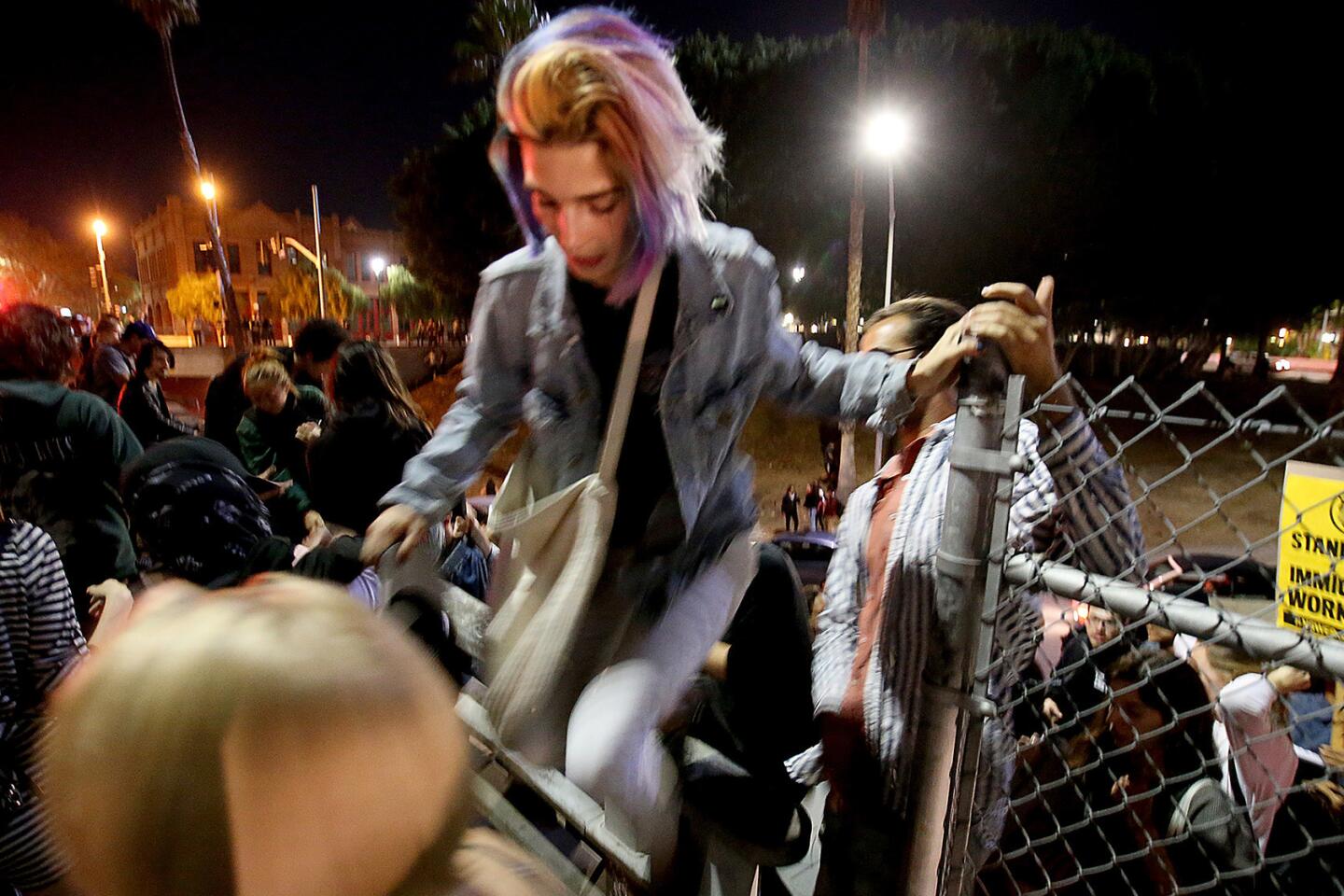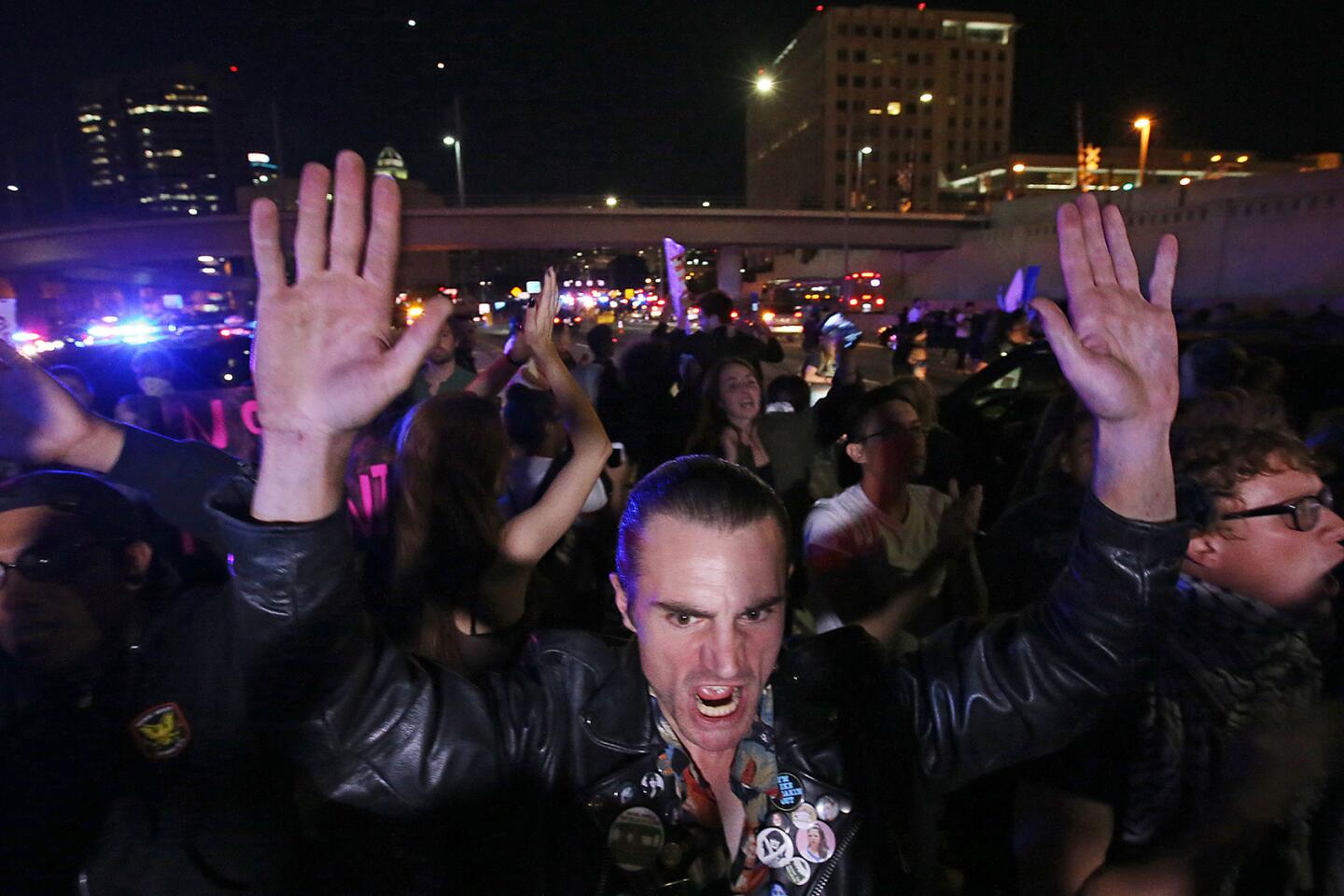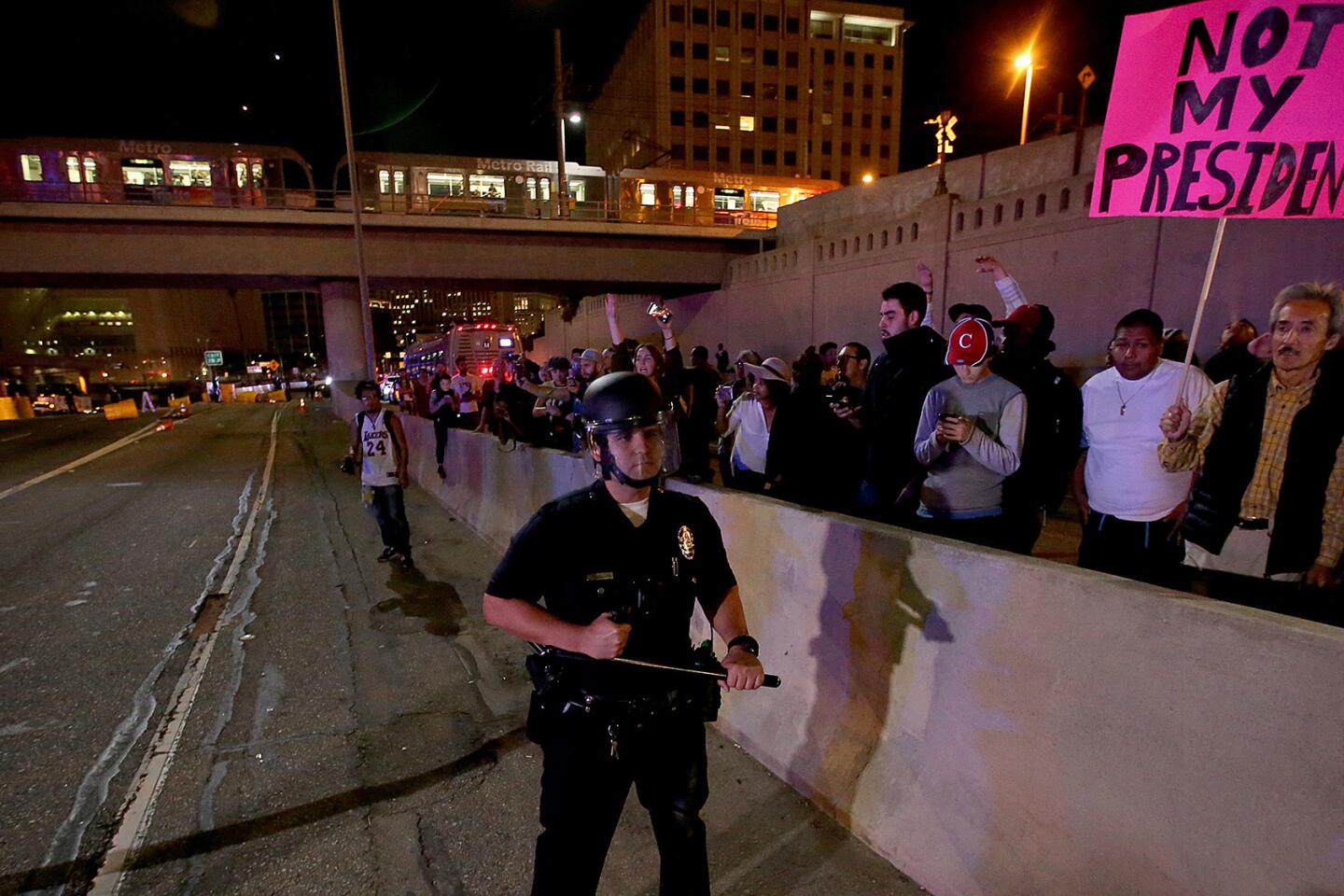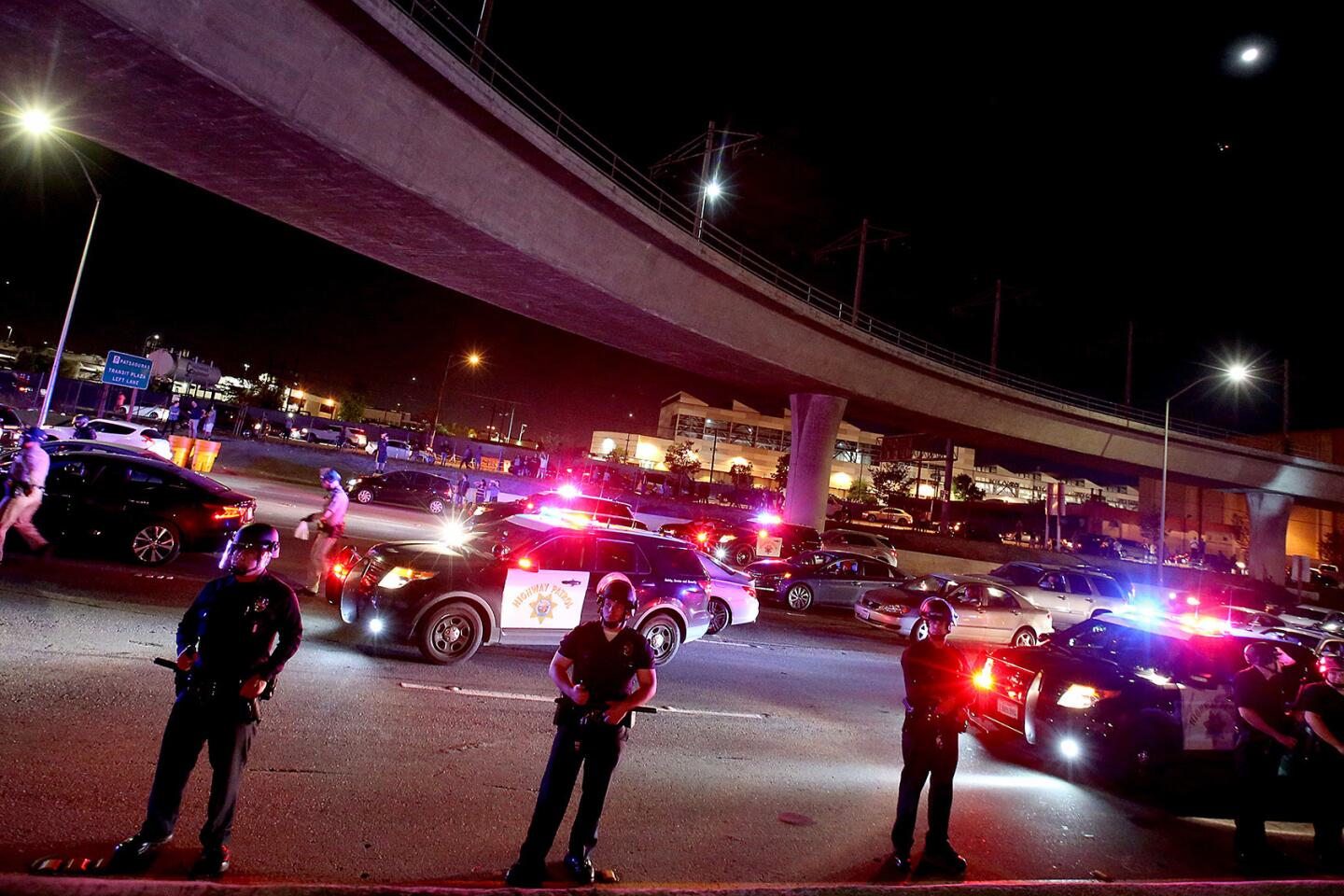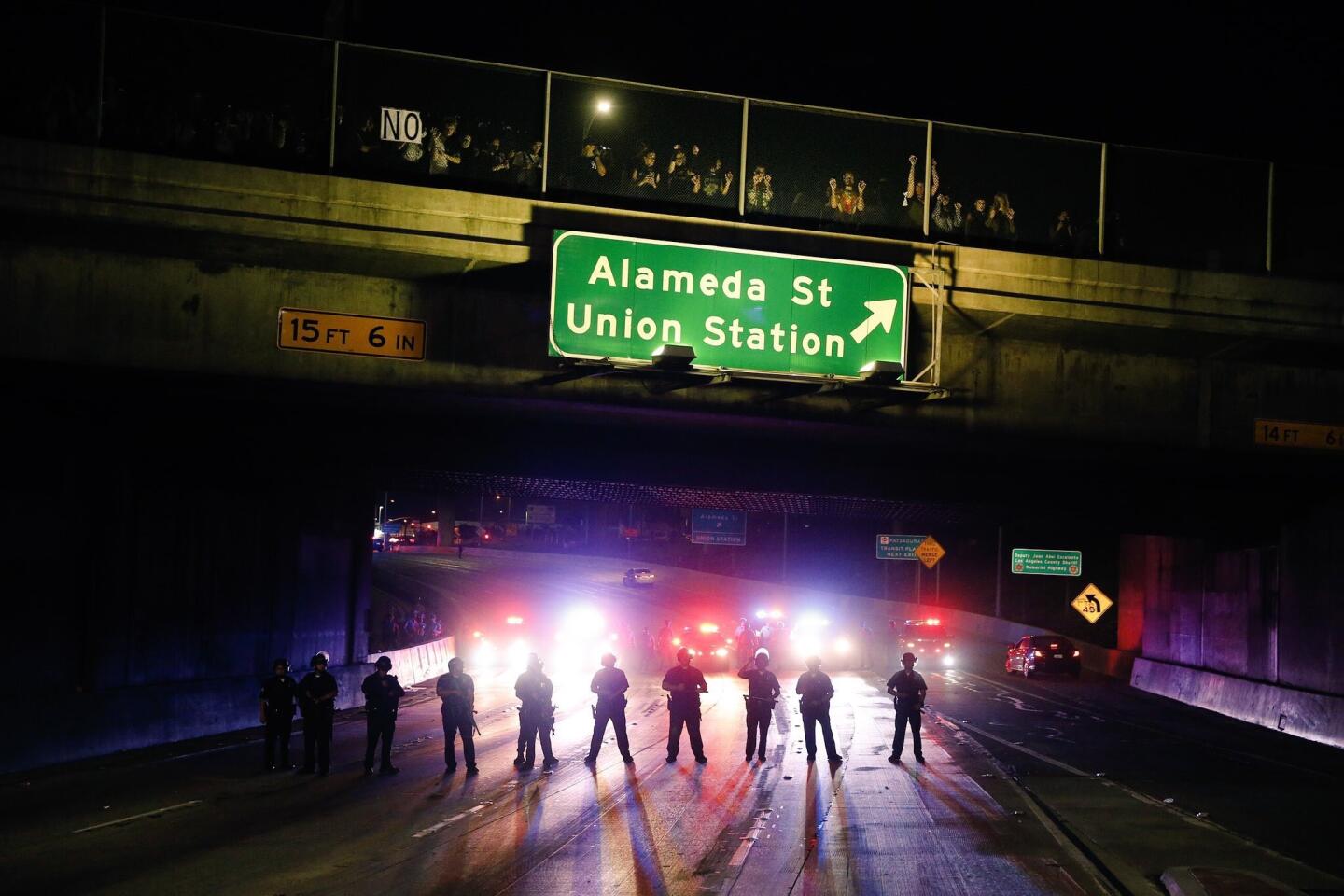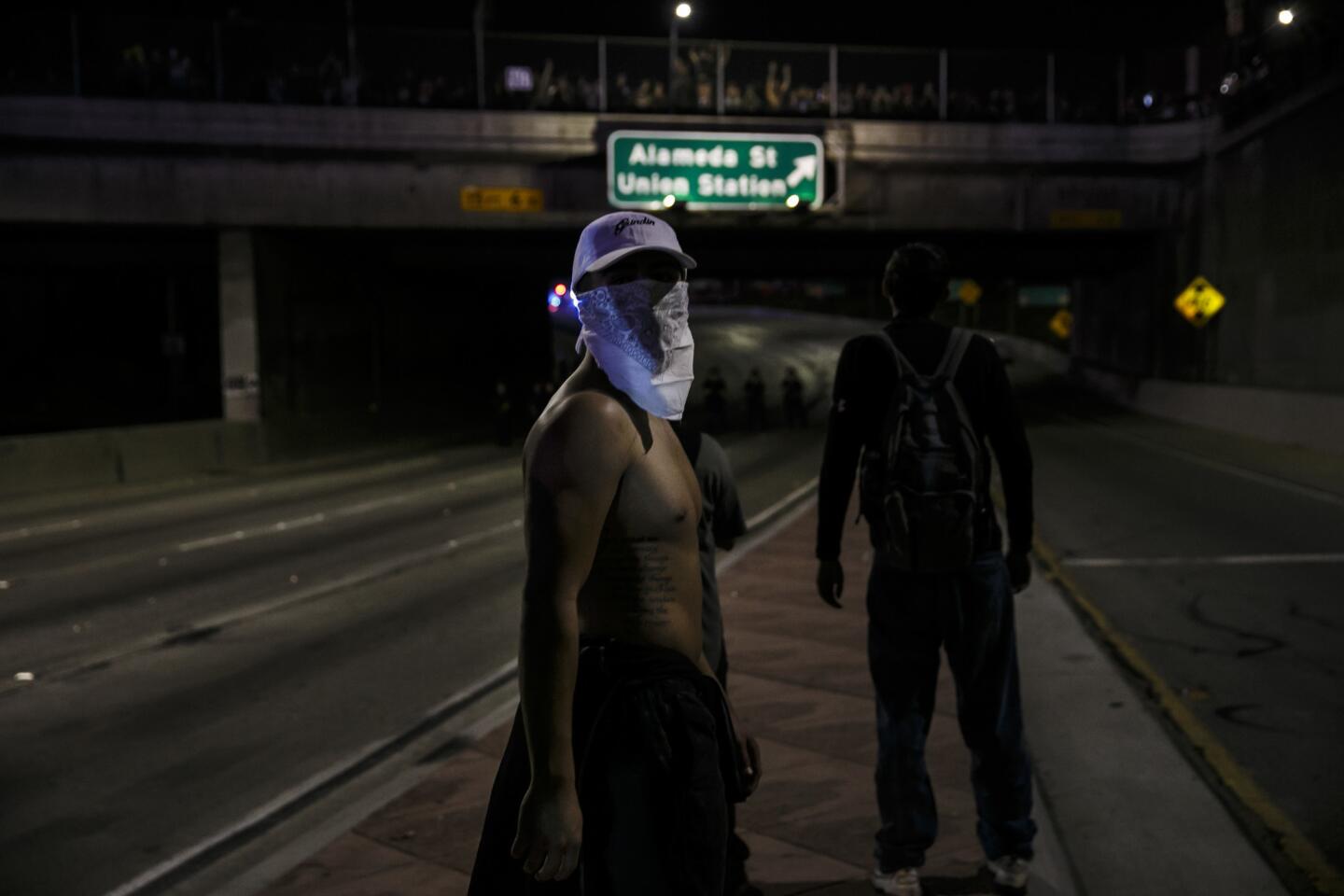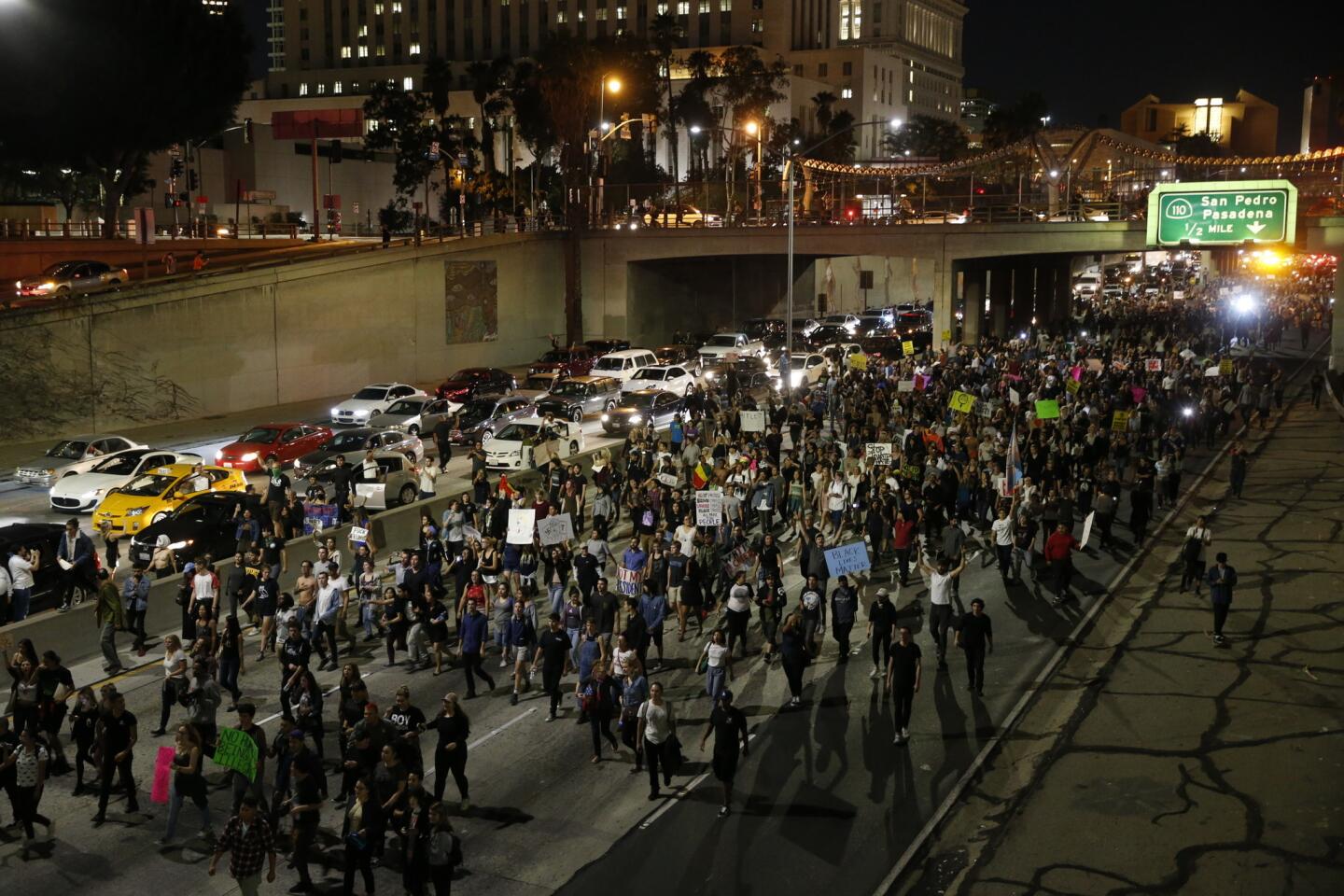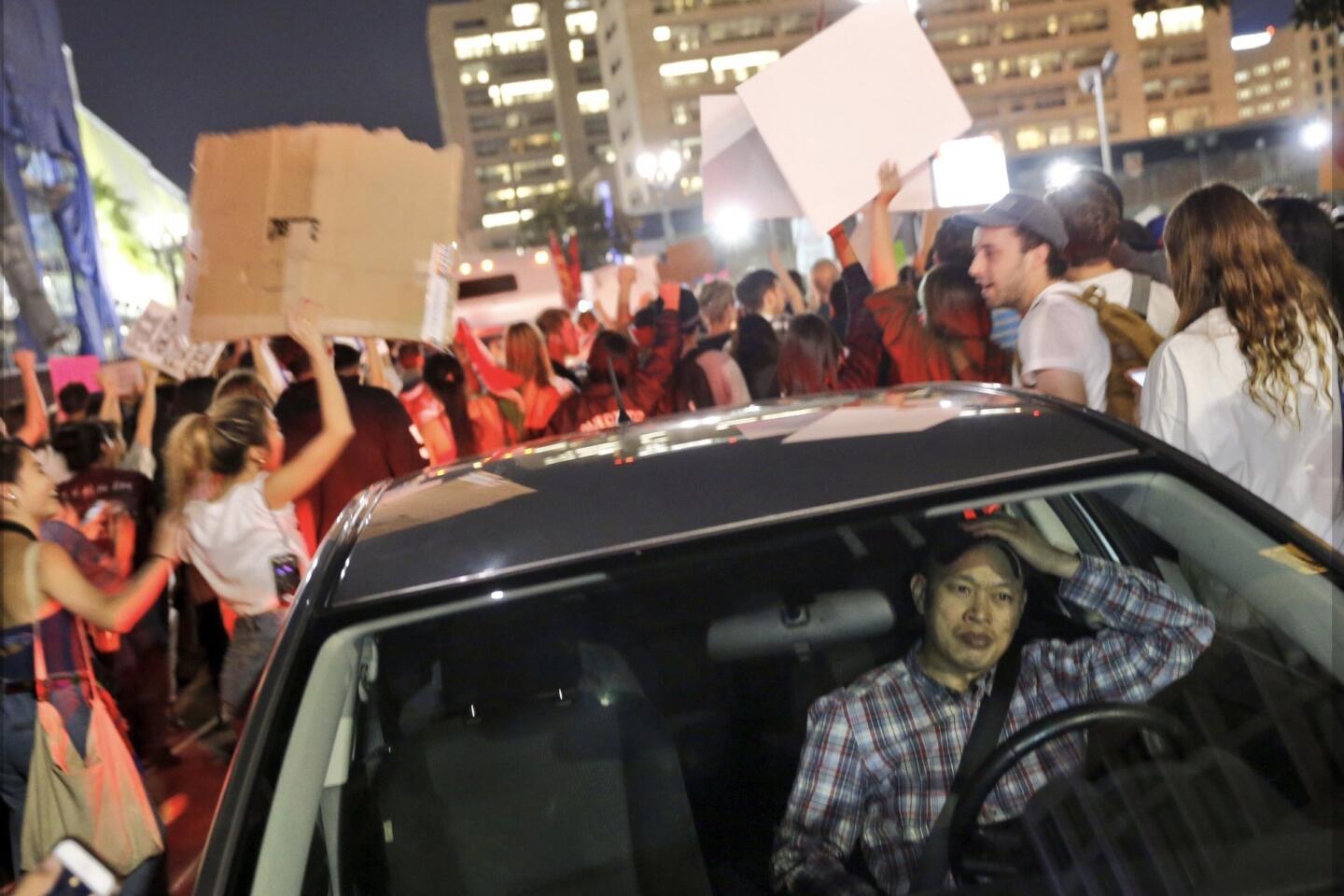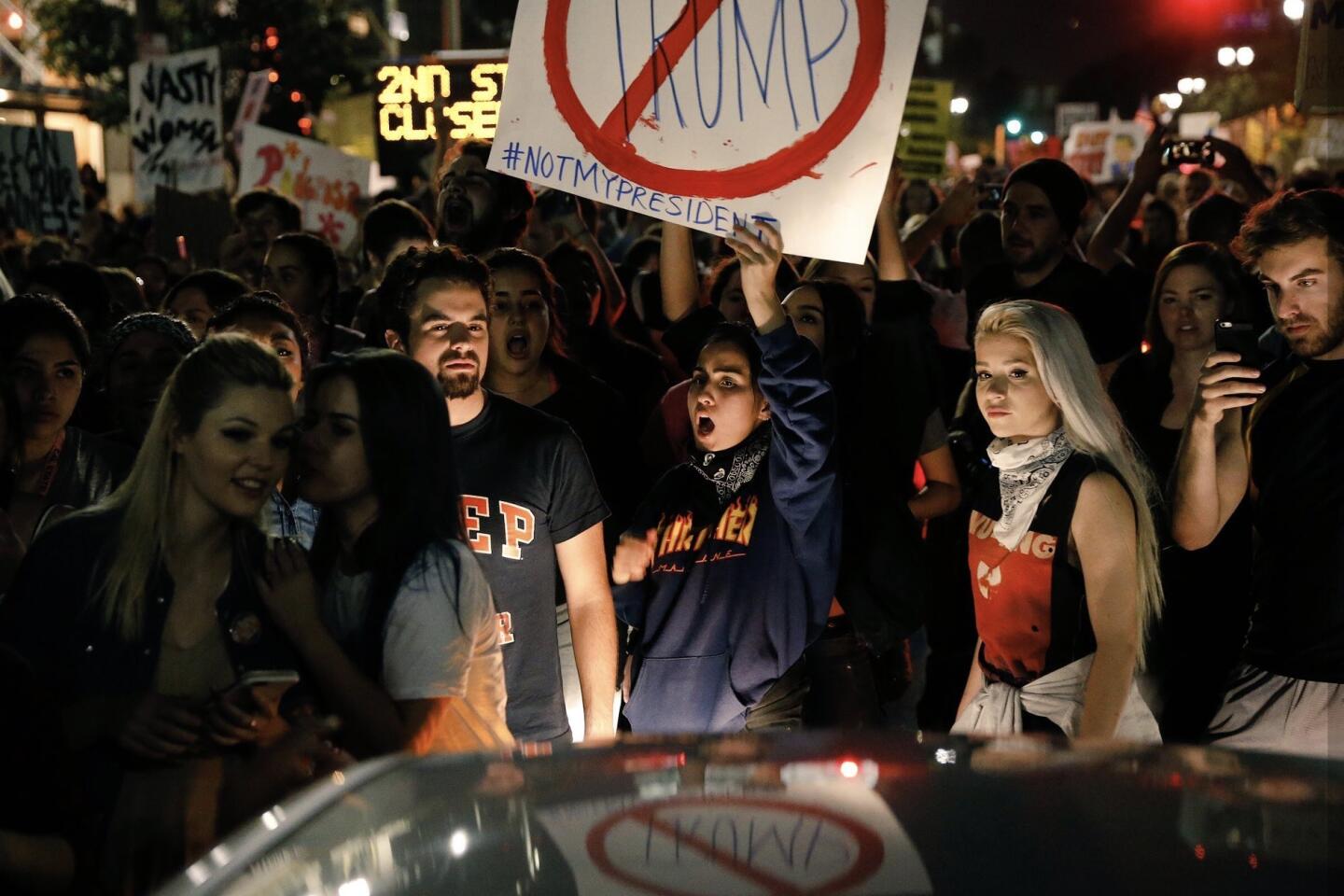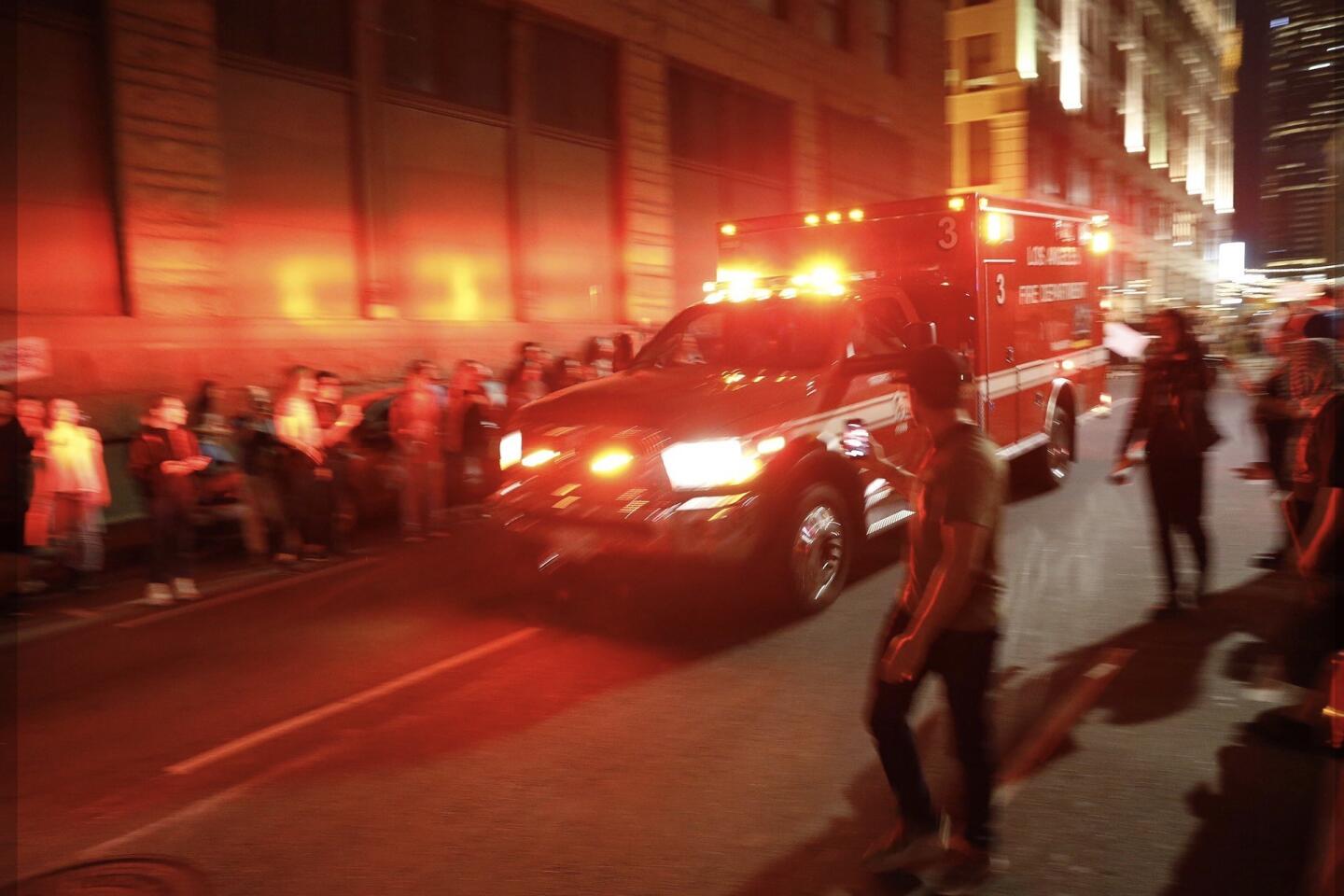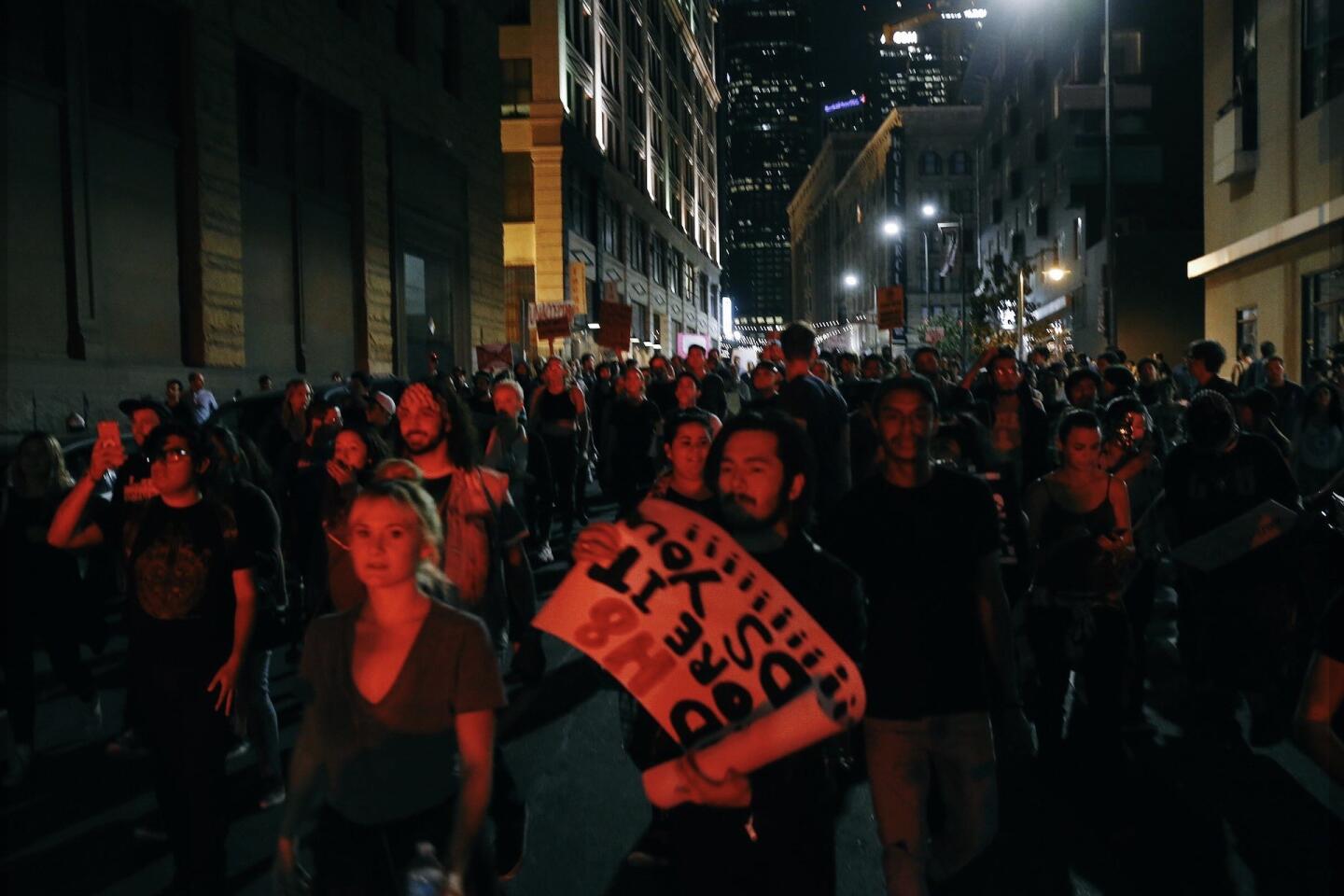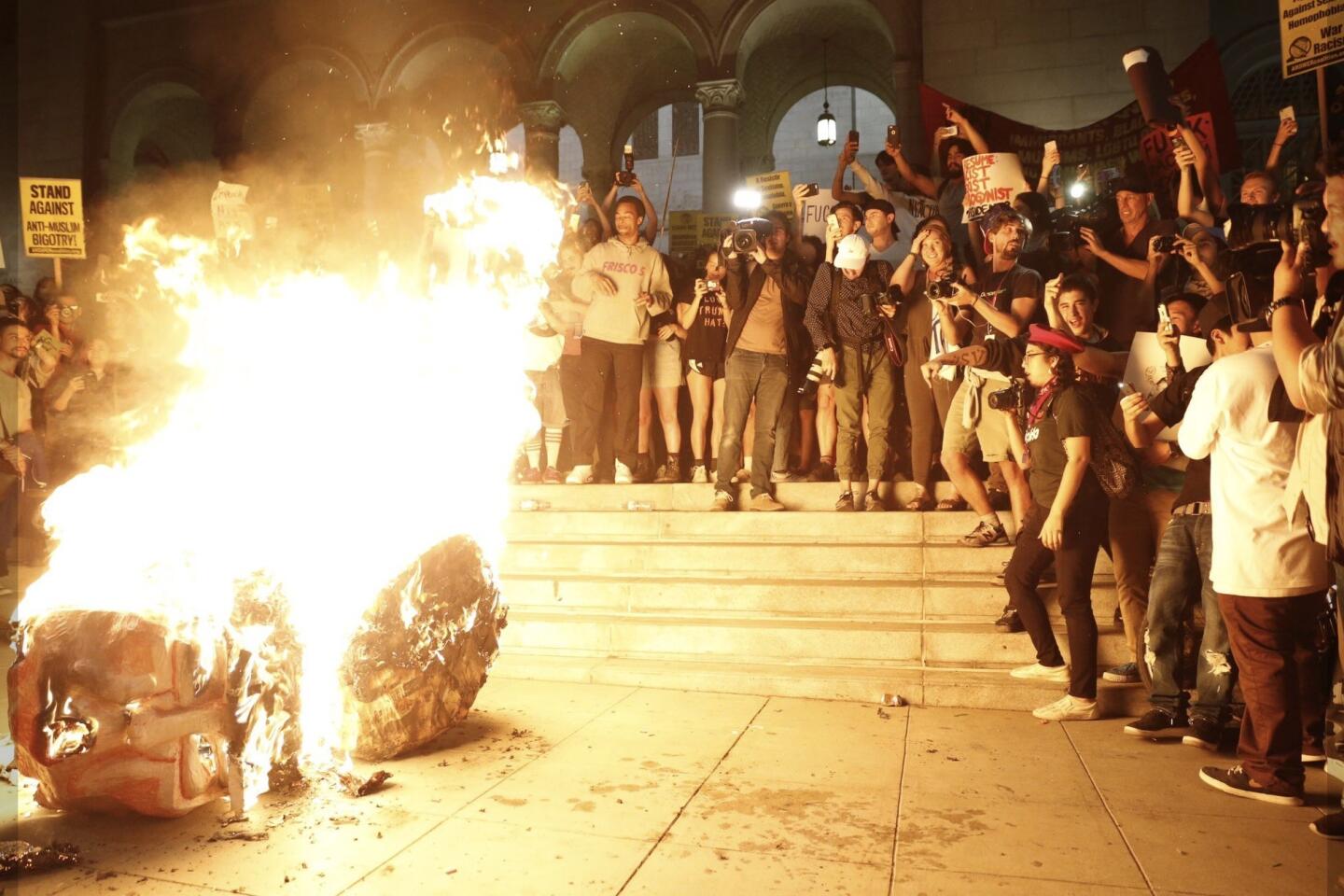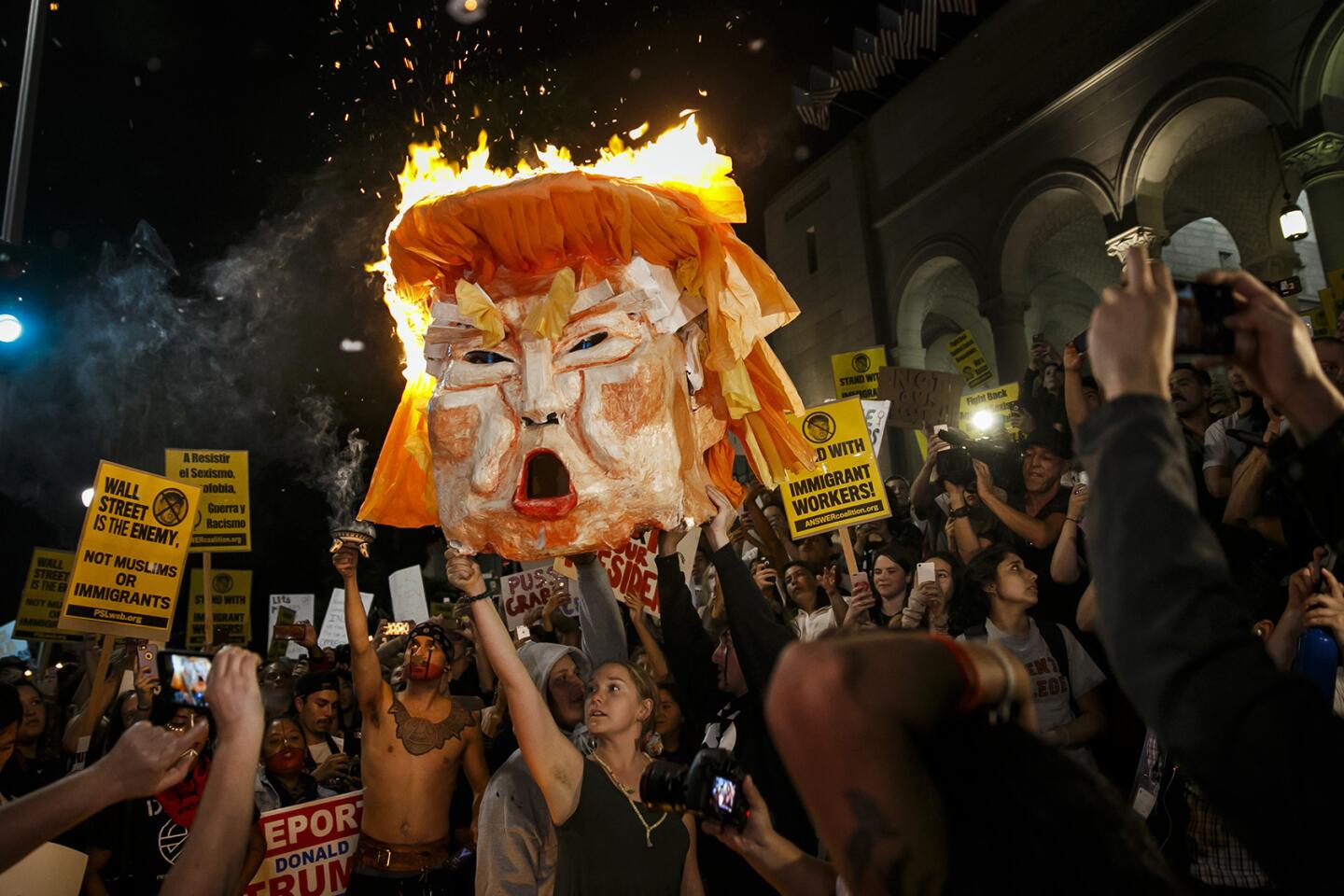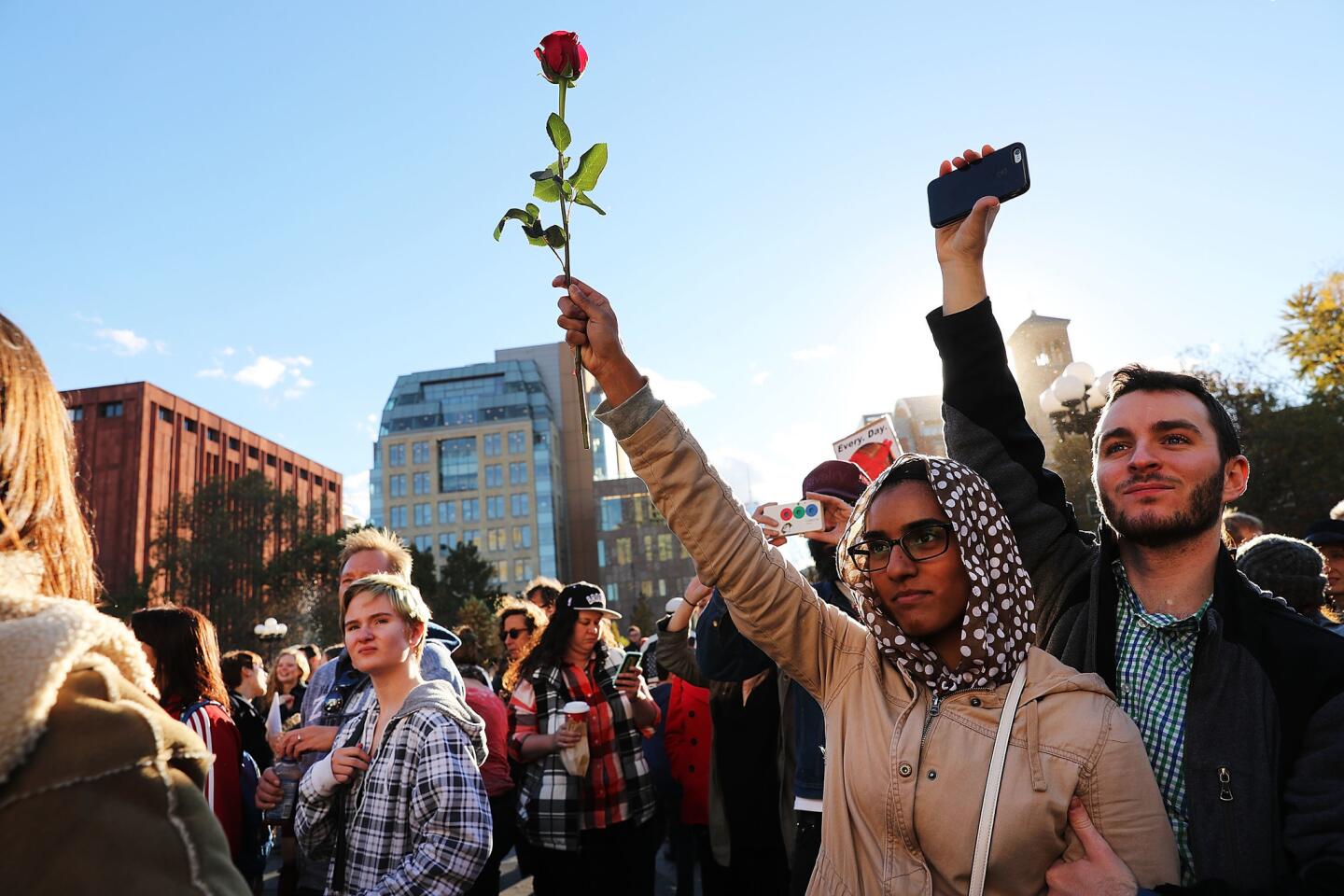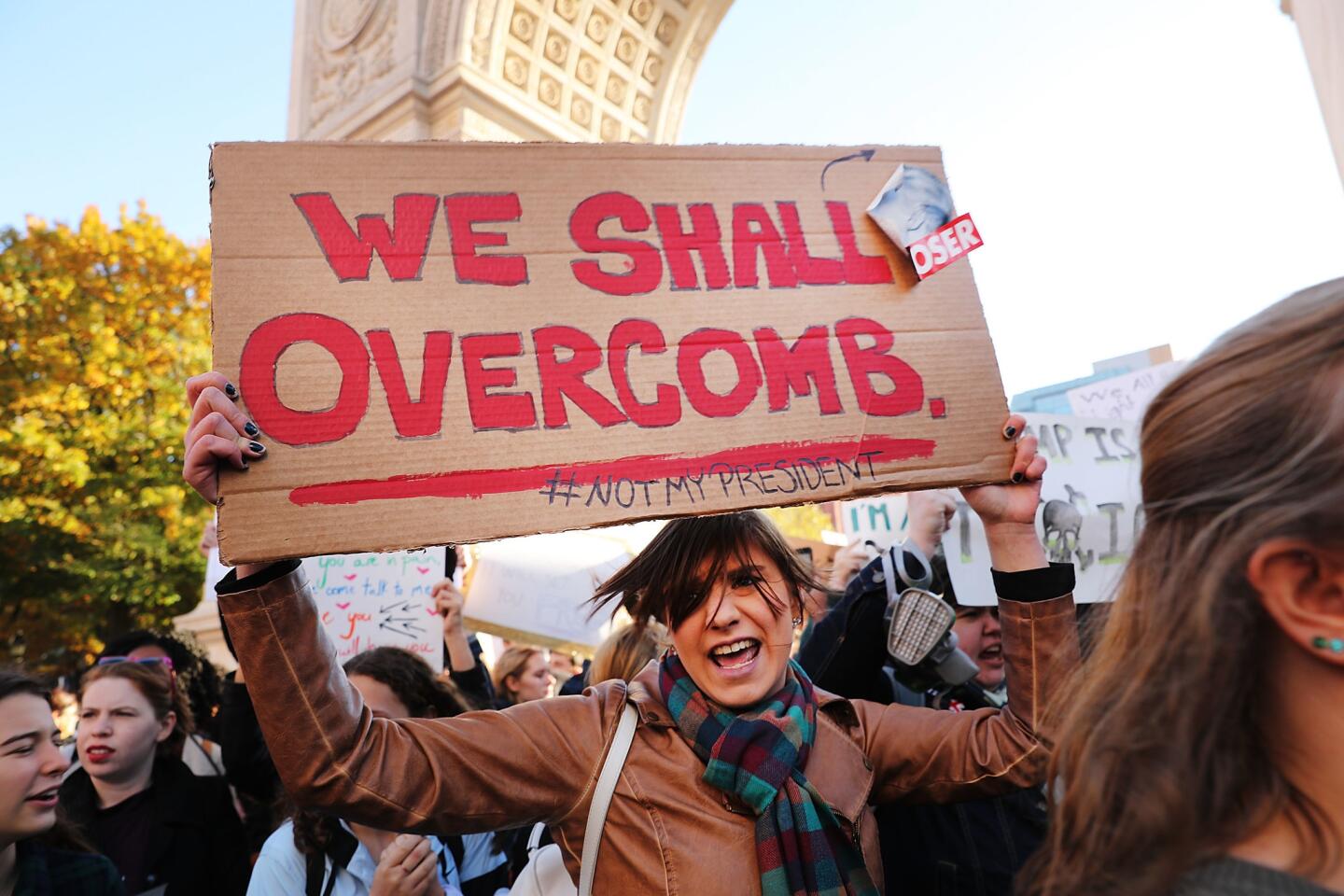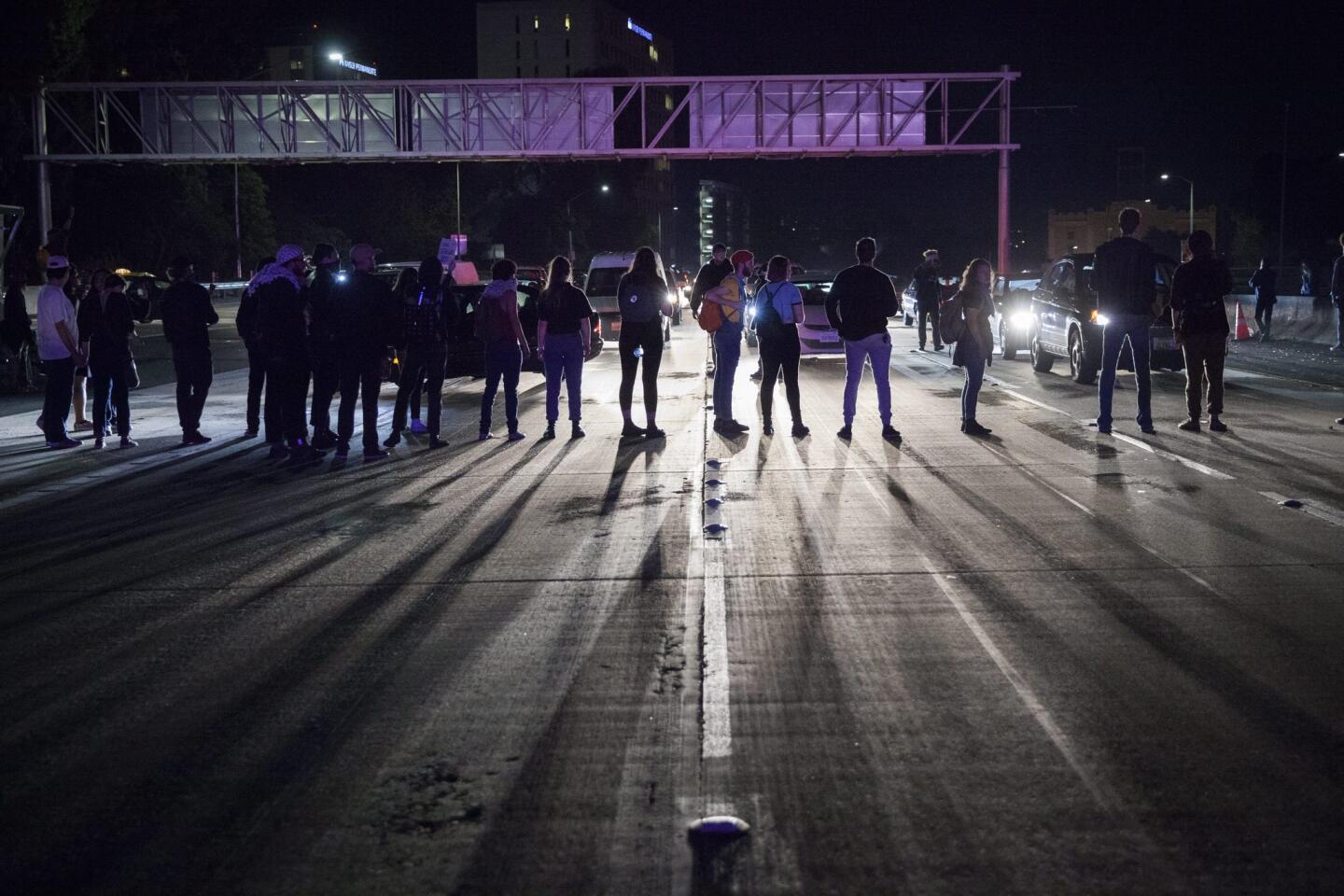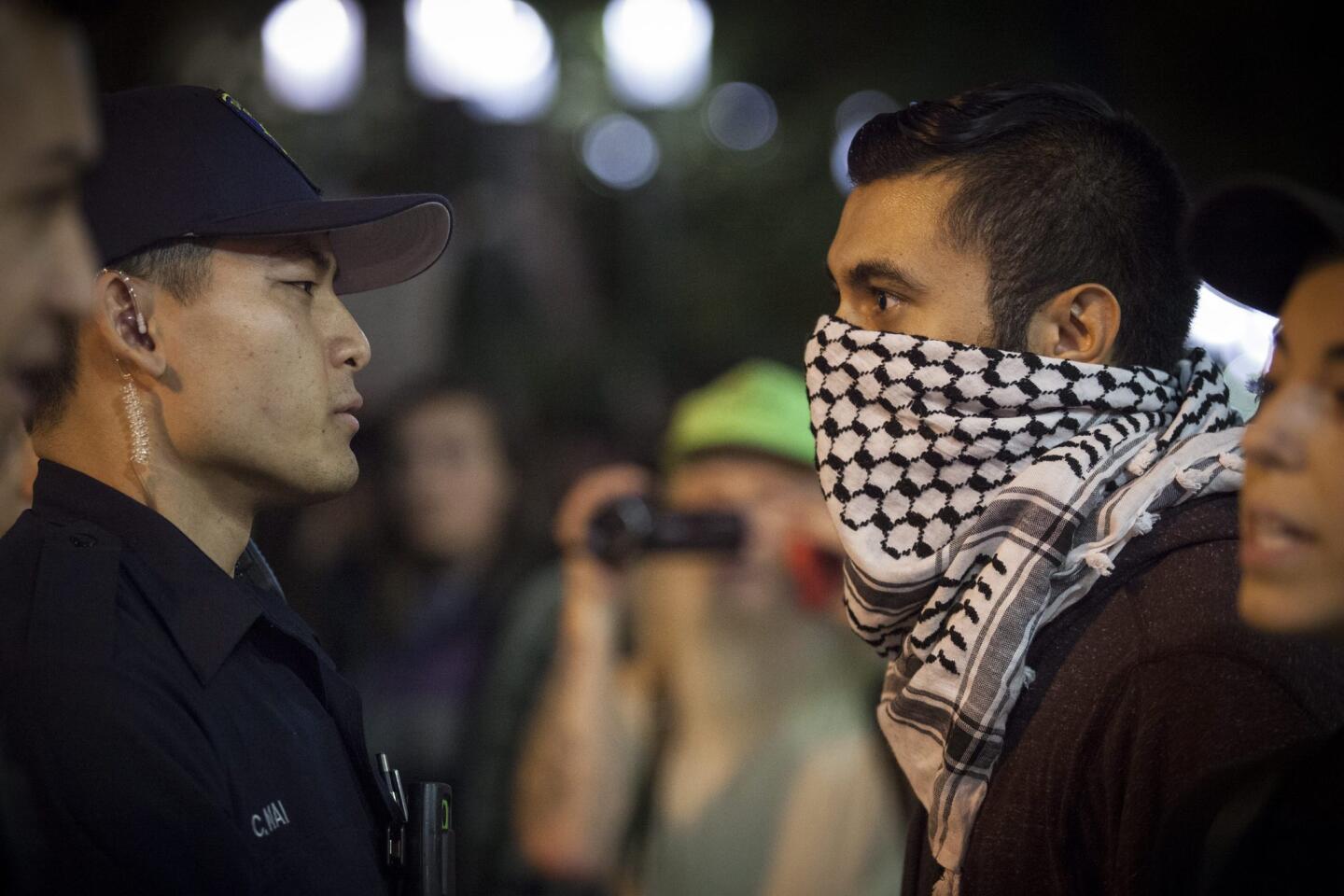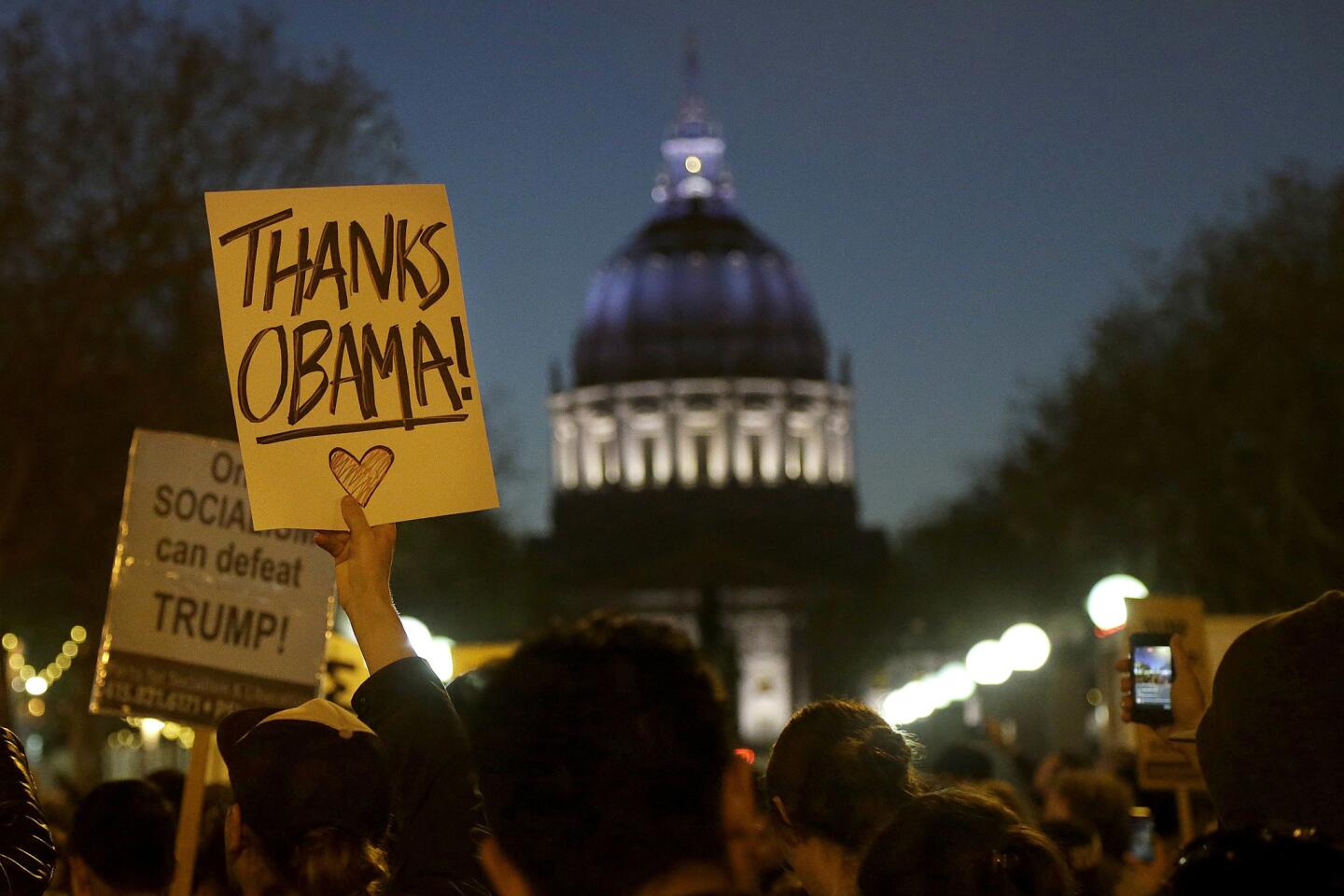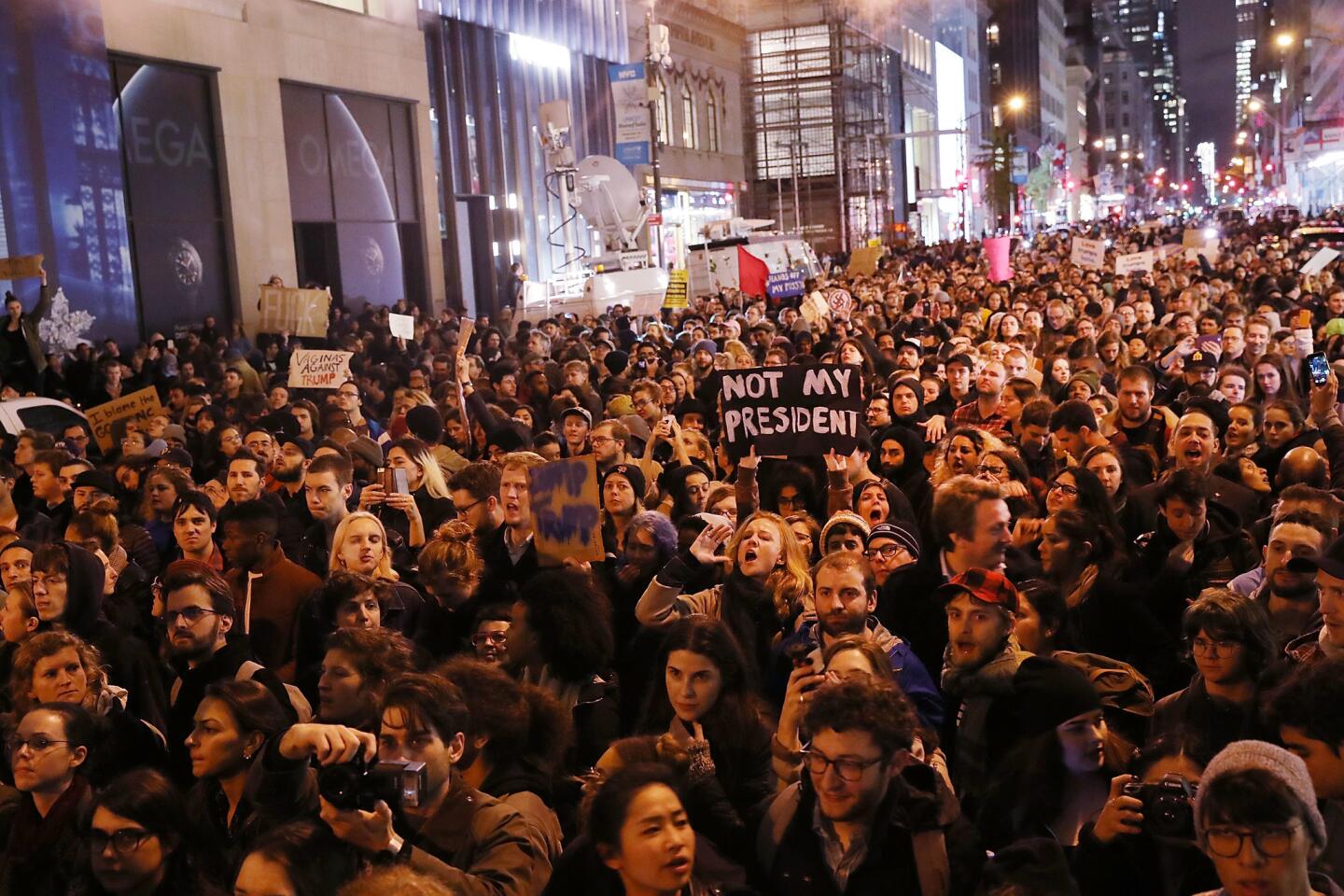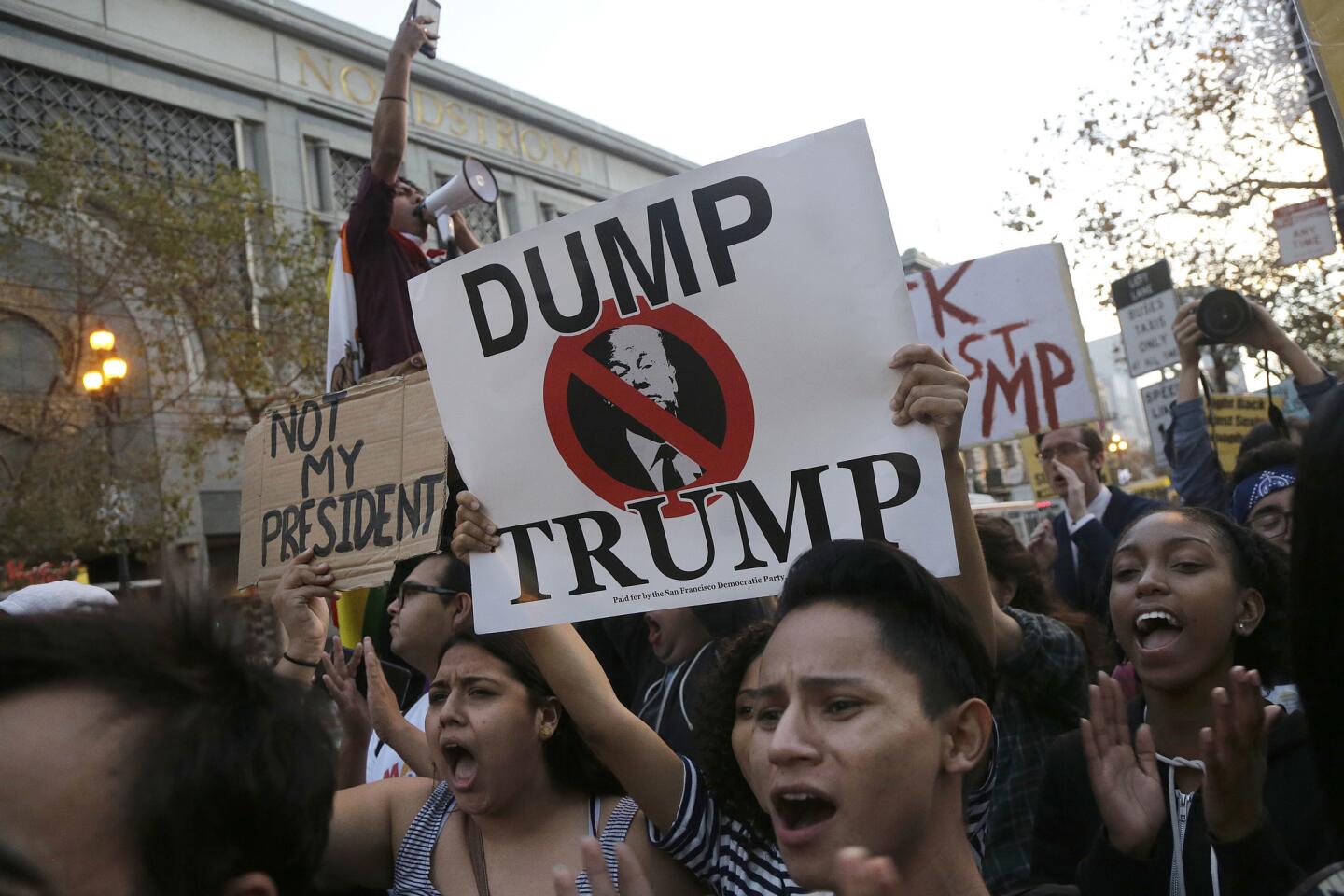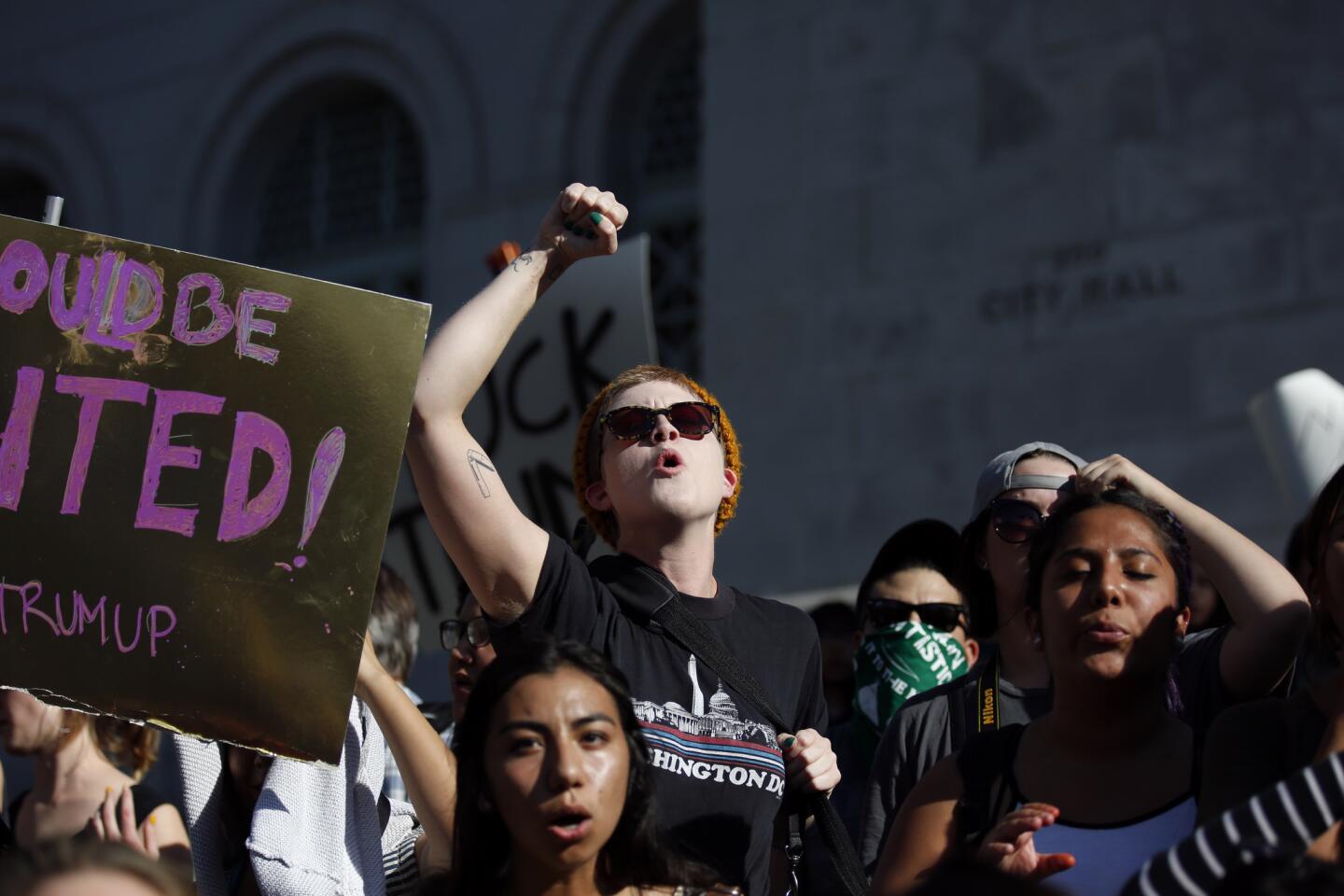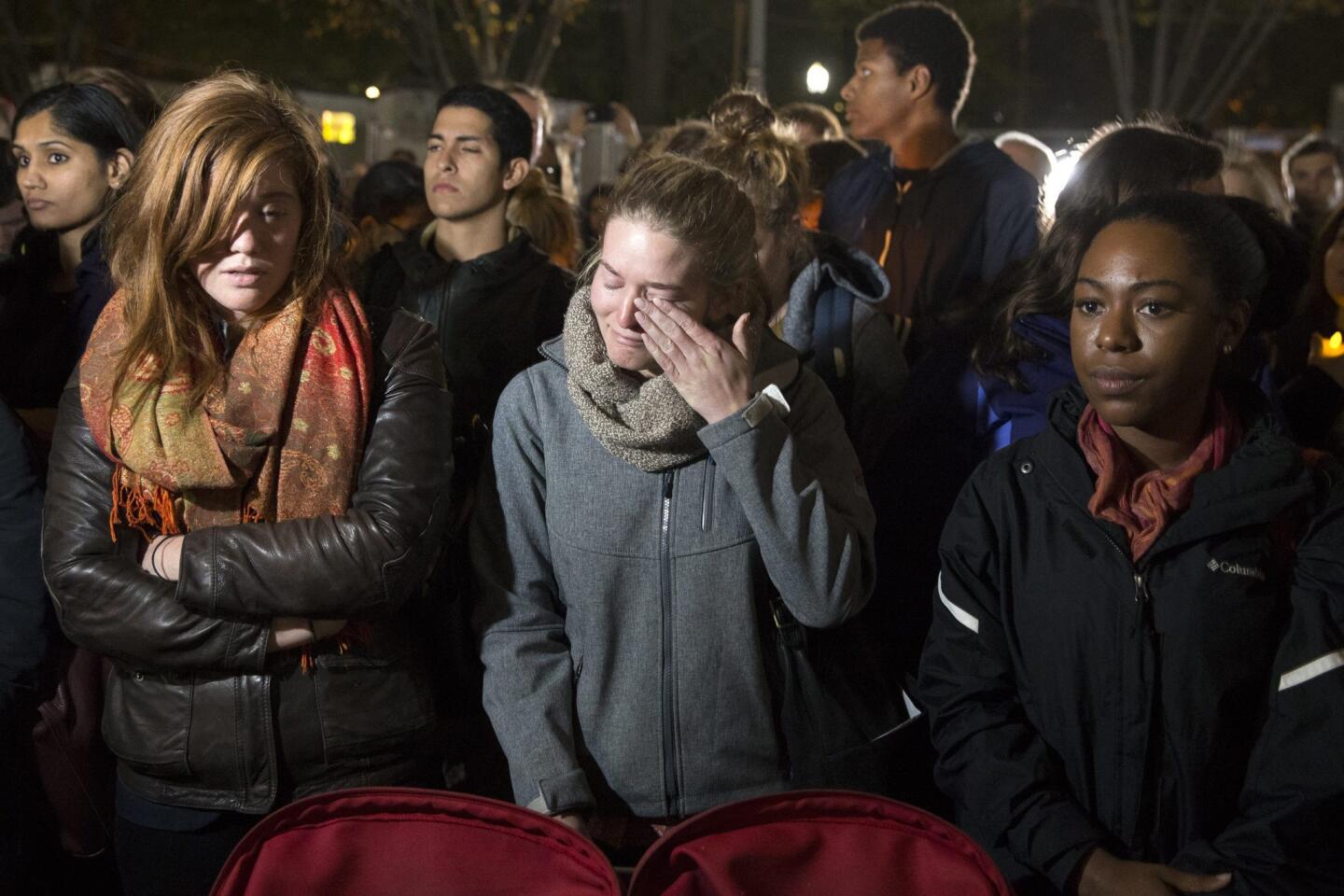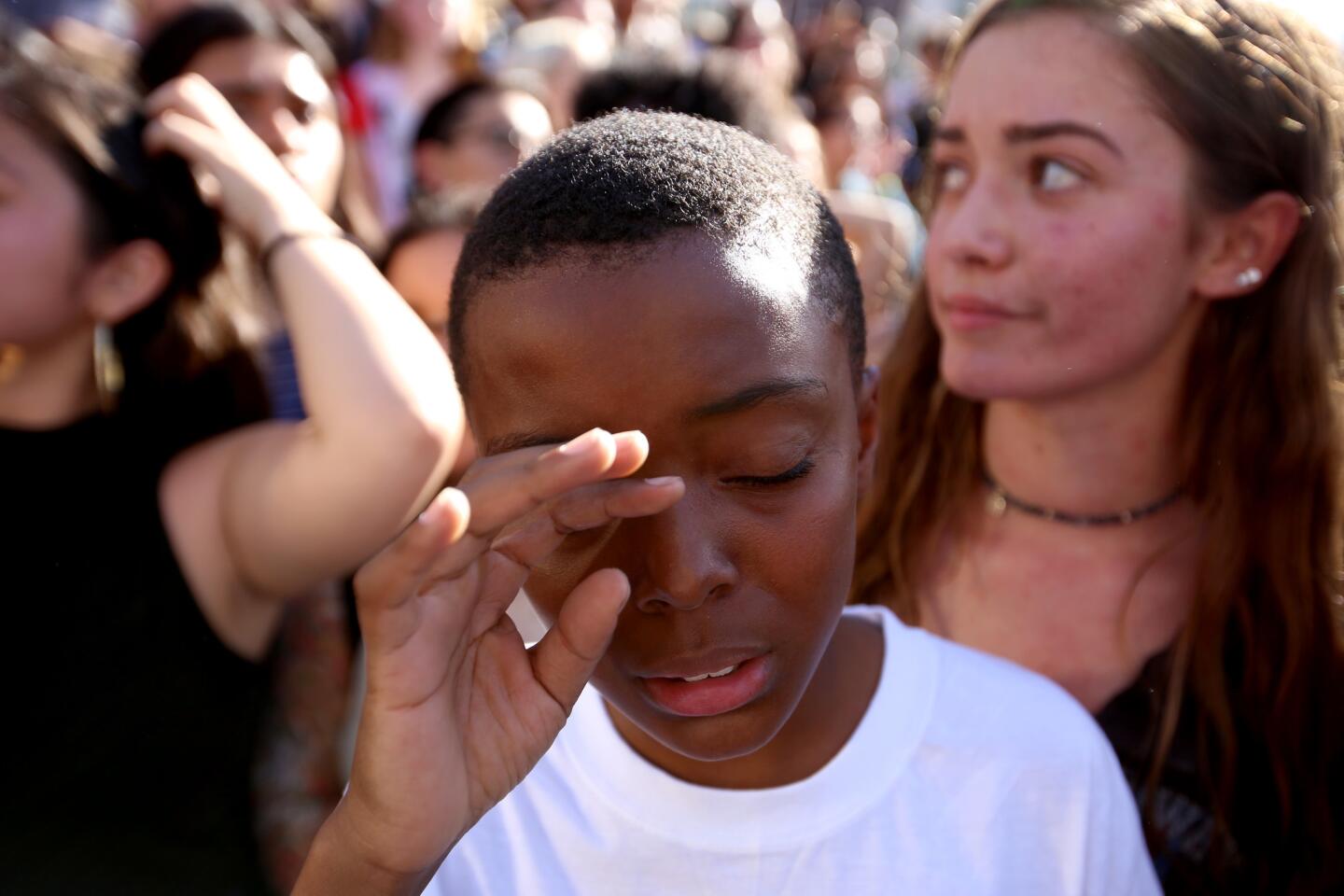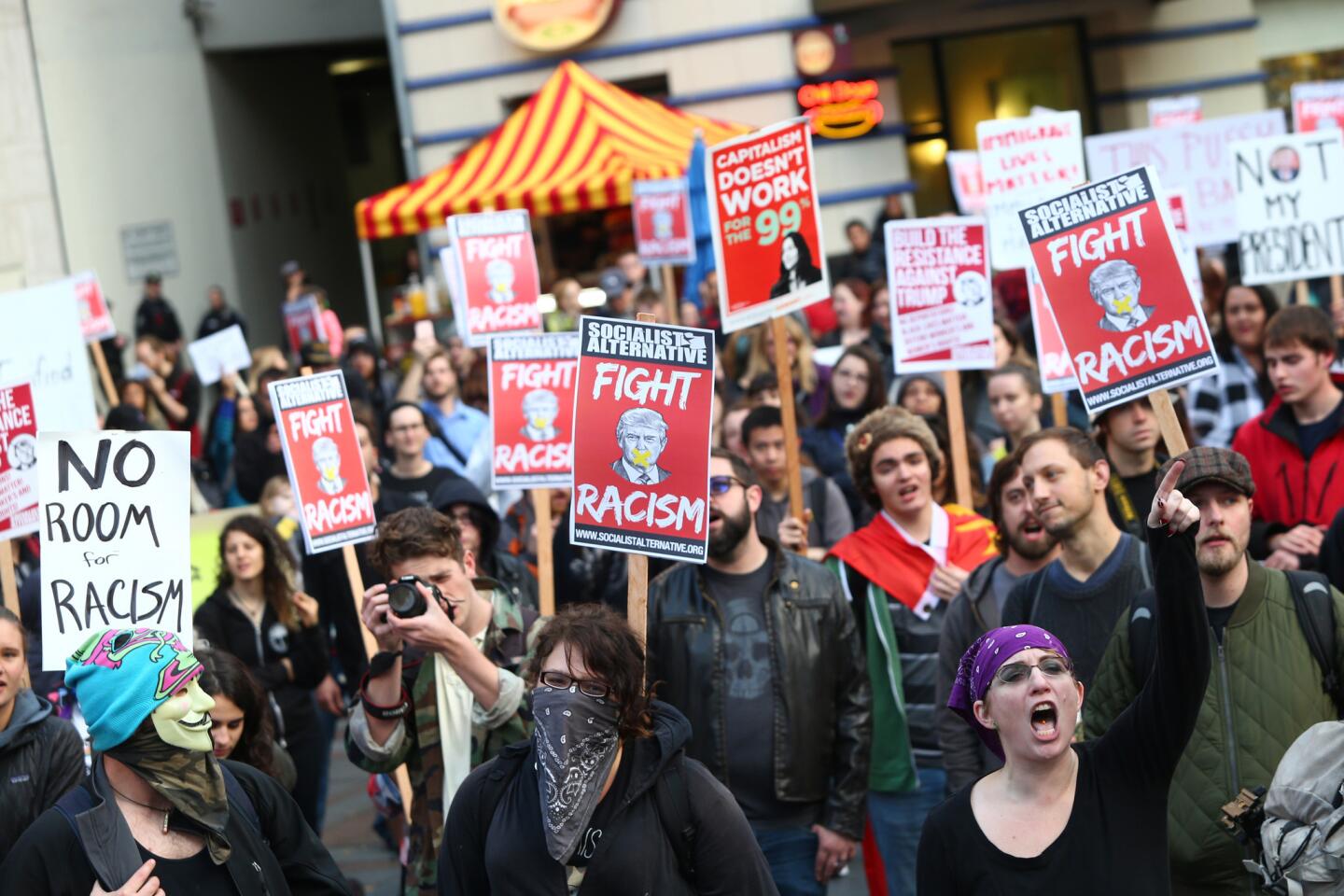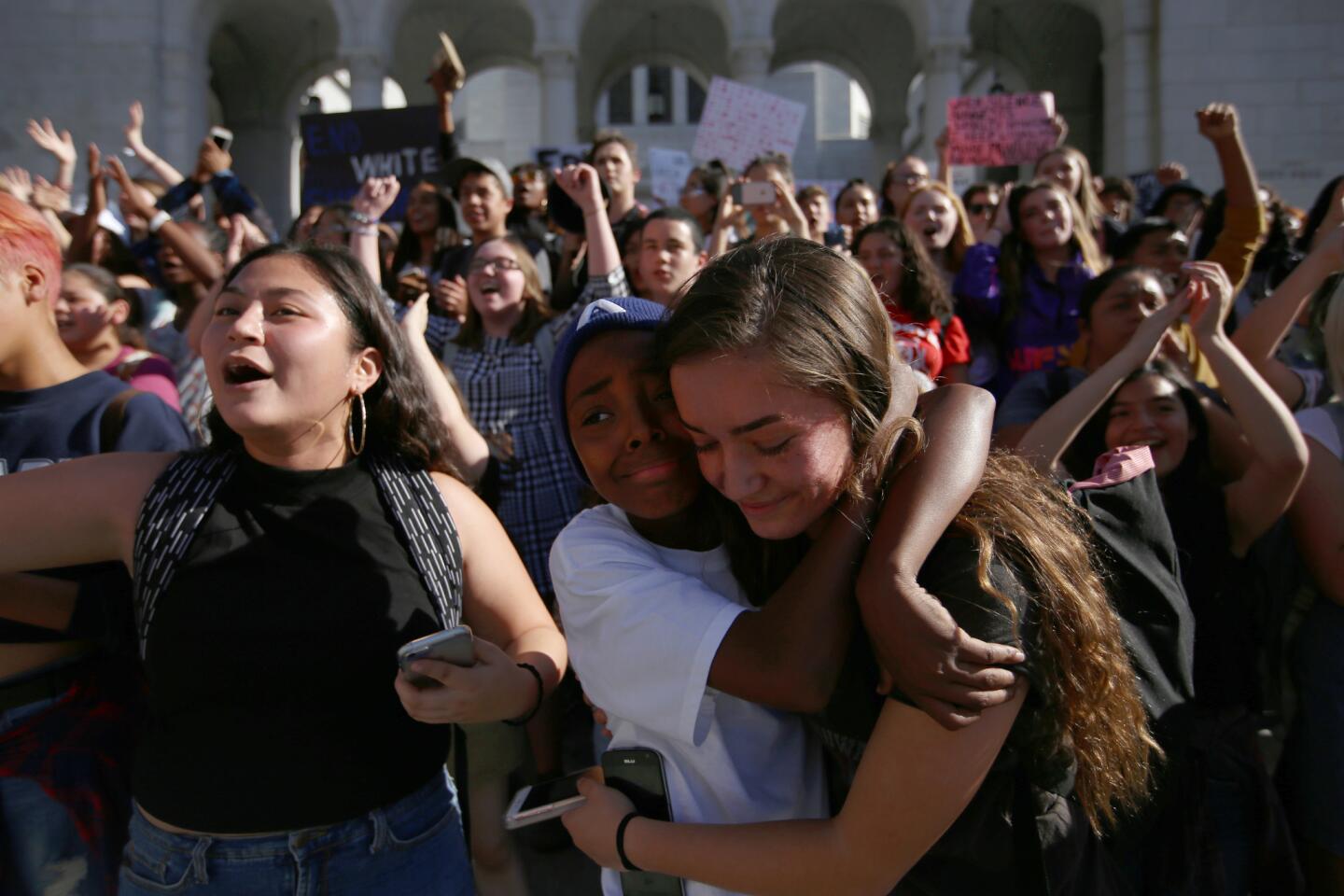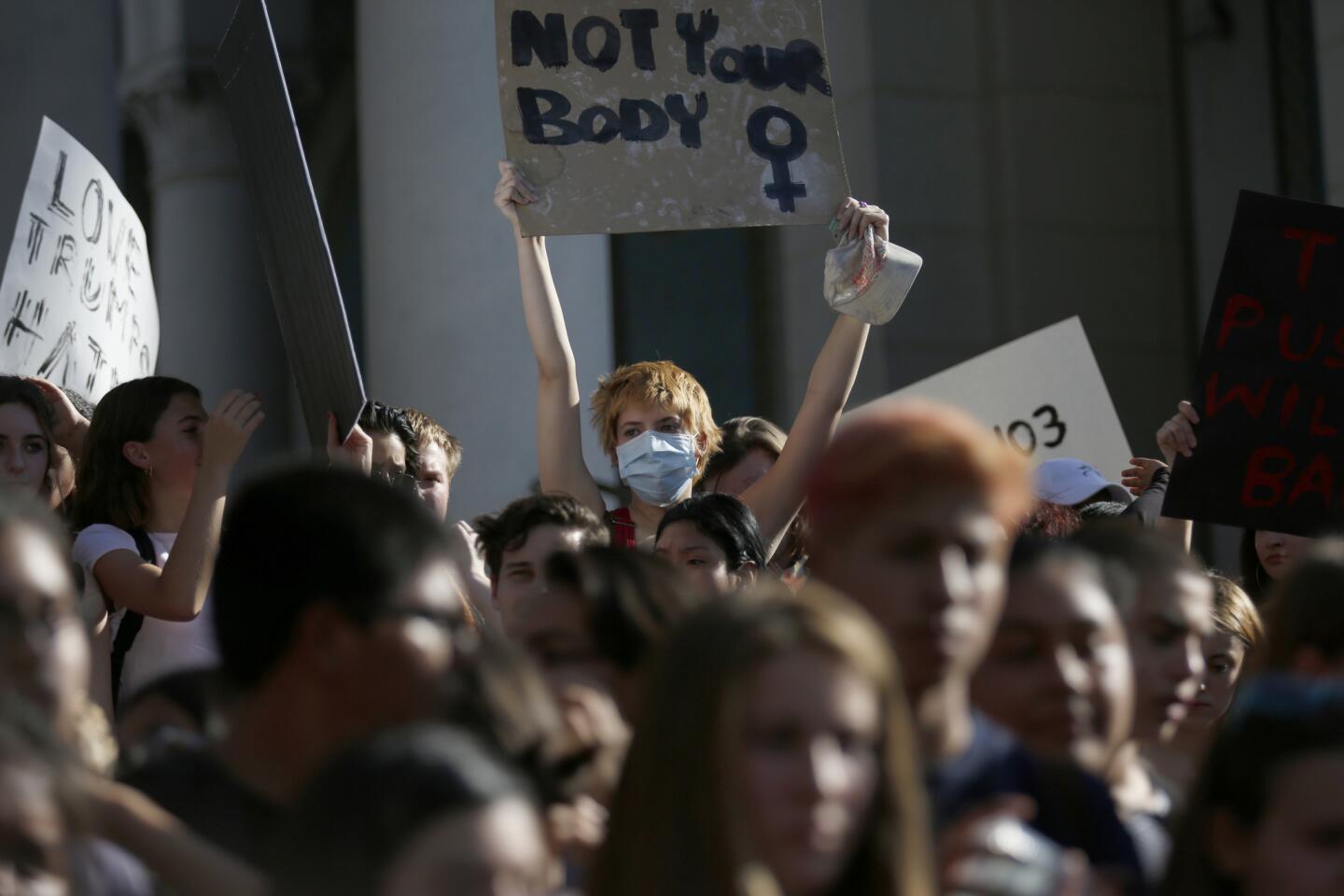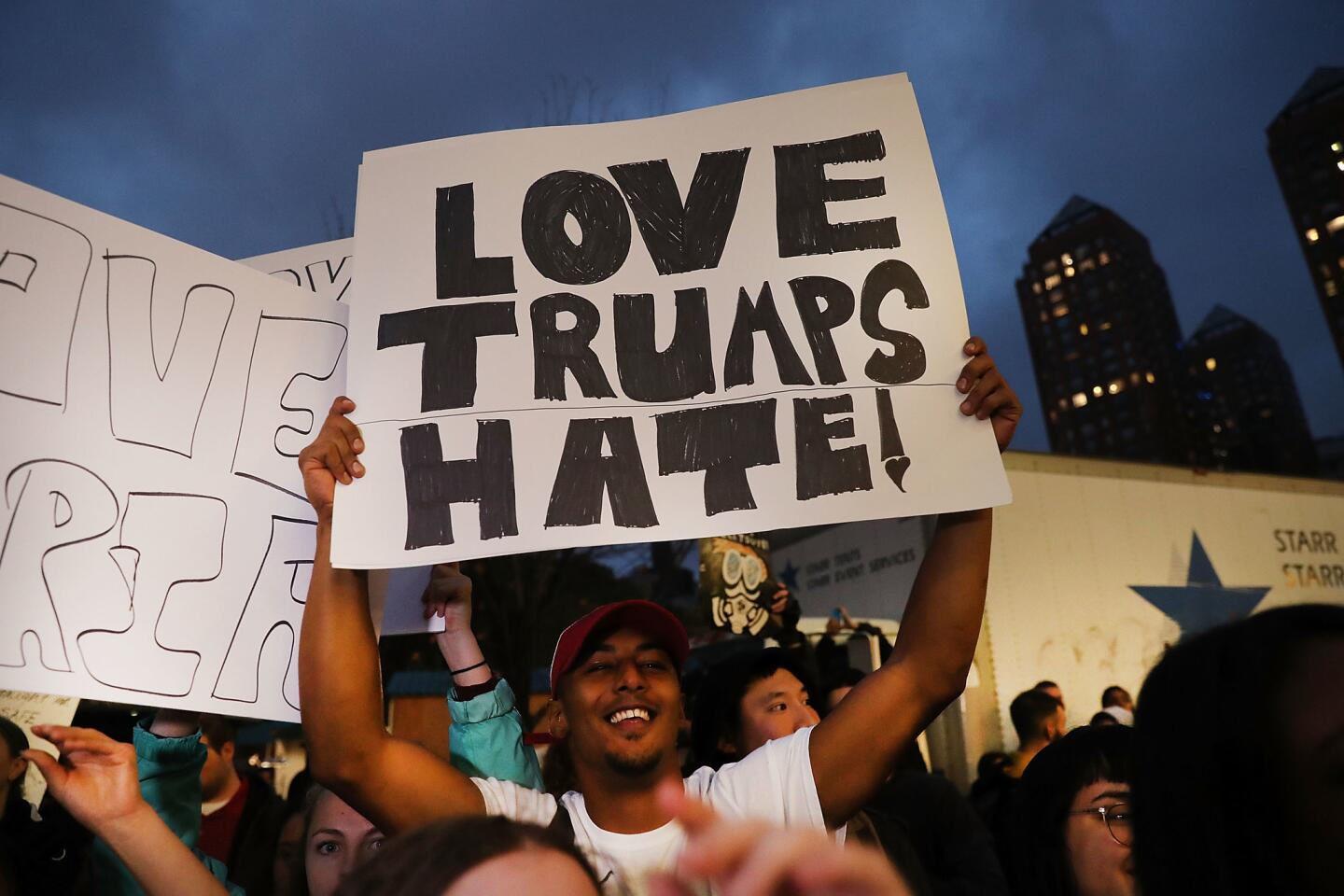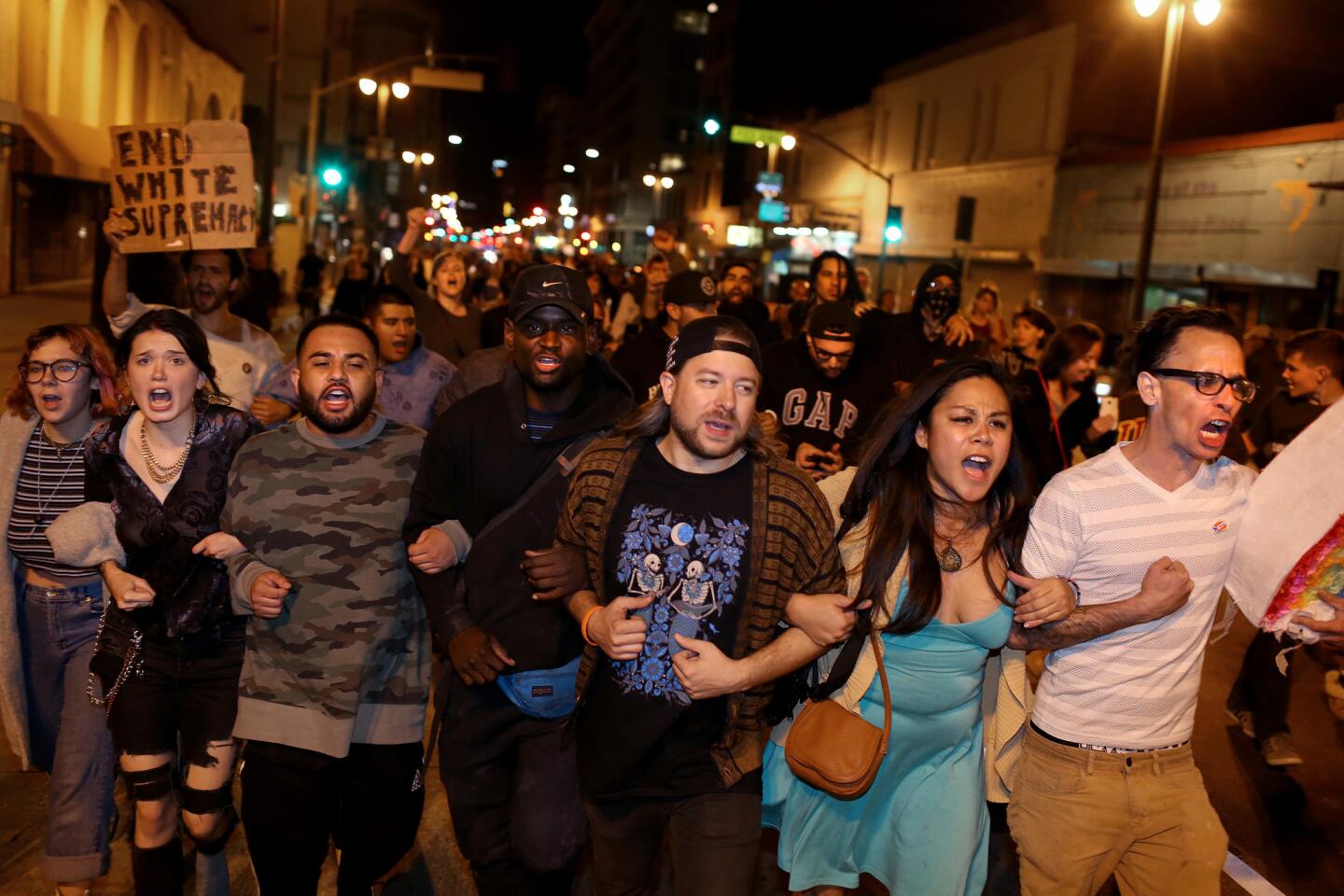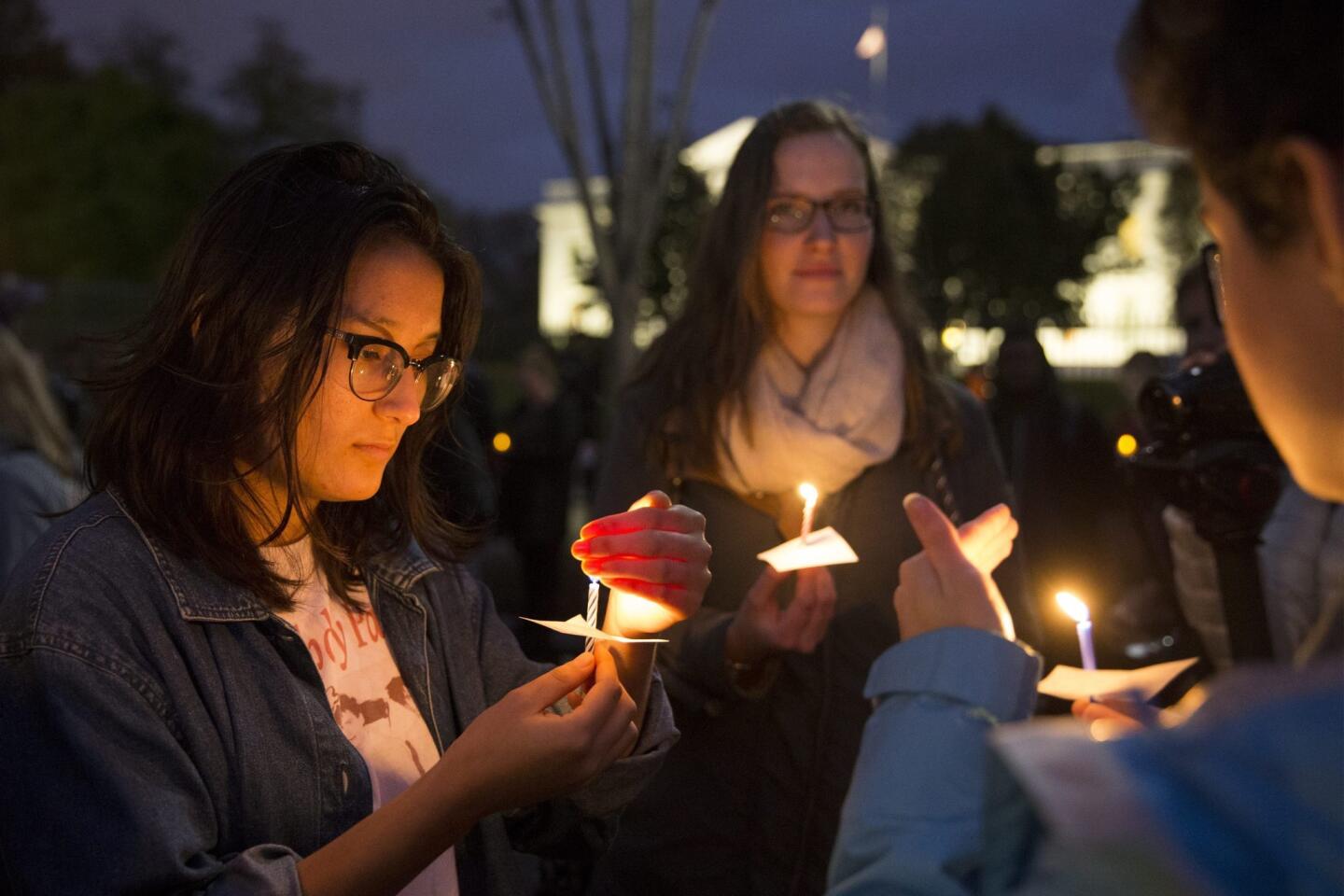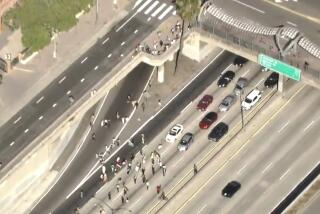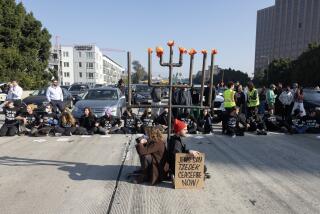Nearly 200 arrested in third night of anti-Trump protests in downtown L.A.

An estimated 185 people were arrested and one officer was injured during the hours-long demonstrations, LAPD officials said. Details on the officer’s injuries were not available but he was expected to be released from the hospital early Friday, said
- Share via
Nearly 200 people were arrested early Friday after demonstrators flooded the streets of downtown Los Angeles and marched between City Hall and the Staples Center, the third night of demonstrations against the election of Donald Trump as president.
An estimated 185 people were arrested and one officer was injured during the hours-long demonstrations, LAPD officials said. Details on the officer’s injuries were not available but he was expected to be released from the hospital early Friday, said Officer Norma Eisenman.
The crowd halted traffic but was mostly peaceful, although some vandalized property with graffiti, hurled bottles and launched fireworks during the incidents late Thursday and early Friday. At one point, a large boom resembling that of a firecracker thundered near 2nd and Spring streets.
One person defaced a Los Angeles police cruiser, prompting officers to reach for beanbag shotguns, but a clash with demonstrators was avoided.
A man with a megaphone urged fellow demonstrators not to resort to vandalism.
“We are proud and productive people, and we’re gonna show them that,” he yelled.
The arrests were made sometime after 1 a.m., mostly for vandalism or disobedience of a lawful order, according to Sgt. Jack Richter, an LAPD spokesman.
Richter said officers have noticed a “significant amount” of graffiti on downtown buildings and will have “zero tolerance” for anyone who remains in the downtown area after officers gave dispersal orders to various crowds of protesters near the Staples Center around 11:30 p.m.
The crowd swelled to more than 300 as it marched through the city, many shouting profane chants that disparaged Trump. “Not my president” echoed throughout the downtown corridors.
By 11 p.m., at least 200 had reached Olympic Boulevard and Olive Street, where dozens of LAPD officers — some with beanbag guns and helmets — filled the street, split the demonstrators into groups and hemmed them in.
About 11:30 p.m., police issued an order to leave the area, but only allowed five to six demonstrators to exit at a time. Officers urged them not to return.
“We don’t want anyone to get arrested tonight,” one LAPD commander told the crowd.
But attempts to gain order were often disrupted. At one point, a firecracker boomed, and at least one person was arrested but details were not immediately available, LAPD Officer Sal Ramirez said.
In a separate incident, a man was involved in an “altercation” with officers just before 11 p.m. near the dog park outside Los Angeles Police Department headquarters, according to LAPD Officer Tony Im. The man was taken into custody and it’s unclear if he was involved in the demonstrations.
Jose Garcia, 25, came to downtown from South Gate and said the protests were a way to demand that Trump govern not just his supporters but the entire nation.
“People say it doesn’t achieve anything, but I feel like as long as our voices are heard, we won’t be shut out,” Garcia said.
Bill Doyle, 53, of Los Angeles said he came to protest for a personal reason: The Affordable Care Act lowered the price of his wife’s cancer treatments, and he worried that Trump may repeal the healthcare measure.
But he also wanted Trump to disavow what he described as racist rhetoric by the candidate during the campaign.
“If we don’t have a country that’s safe to live in, what’s the point?” Doyle said. “The Republicans need to wake up and deal with this. It’s not going anywhere.”
In Van Nuys, up to 40 demonstrators gathered outside the federal building along Van Nuys Boulevard, and as of 9 p.m., the crowd was mostly peaceful, LAPD Officer Sal Ramirez said.
The protests mirrored demonstrations across the state. In Oakland, about 100 protesters poured onto the eastbound lanes of the Interstate 580 at 9:30 p.m. and blocked traffic, according to California Highway Patrol Officer Marc Johnston.
Seven business were vandalized, trash cans were set on fire and officers found one protester with a “cache” of Molotov cocktails, Oakland police said. Officers arrested 11 people on various charges including assault on police, vandalism, failure to disperse and public intoxication, police said.
Earlier in the day, a group marched onto the 10 Freeway in Boyle Heights but was quickly ushered off by police. The incident forced the closure of the freeway for about 20 minutes.
Still, the crowds were smaller on Thursday than the thousands of people who protested Wednesday. Of those, hundreds flooded the 101 Freeway, one of the main arteries through downtown L.A., blocking traffic and ultimately prompting police to move in.
City officials said Thursday that they were prepared for more nights of demonstrations and civil disobedience, with their attention focused on the freeways.
“Folks need an avenue by which to express themselves — we want to provide them with that,” LAPD Chief Charlie Beck said in an interview. “But we want them to do it in a lawful manner.”
Those remarks were echoed by Los Angeles Mayor Eric Garcetti, who told reporters he was proud of the activism he saw Wednesday night. Although the majority of protesters were peaceful, he said, he feared the message could be overshadowed by the unlawful behavior of a few.
“There’s no place for the destruction of property or the dangerous stoppage of traffic in a city where the overall majority of people are exercising in peaceful protest,” he said. “You’re getting in the way of 99% of people’s own message.”
Twenty-eight people were ultimately arrested overnight Wednesday for impeding traffic, police said. Officials said some may also be booked on suspicion of vandalism.
In Wednesday night’s protest, police had initially wanted to intervene as little as possible, Beck said.
“That was our goal,” he said. “To let people exercise their 1st Amendment rights and do so as unaffected by policing as we could possibly do it.”
That changed, however, as protests in L.A. often do, when they reach a freeway. At that point, out of concerns for the safety of the demonstrators, Beck said, the LAPD “had to change our posture dramatically.”
Officers worked with the California Highway Patrol to stop traffic and try to clear the cars already in the area. Then it was time to try to move protesters from the freeway, Beck said.
“That piece of freeway is really tough for us,” the chief said. “There’s like 17 on- and off-ramps in a very, very tight area; there’s a short fence. Four-hundred or 500 people — stopping them from trying to get access is very difficult.”
“It’s going to take a while to get them off,” he added. “We have to make sure we get them off safely.”
Beck watched the demonstrations on television as he called his command staff on the ground, discussing their plans. Garcetti said he also spoke to the chief, at times listening to a police radio for a play-by-play.
Both the police chief and mayor cautioned protesters against returning to the freeway should more protests arise. Beck said the LAPD was working with the CHP to prevent protesters from returning to the roadway on Thursday and beyond.
The CHP issued its own statement Thursday afternoon, saying the freeway takeover endangered motorists and kept scores of officers from responding to other incidents. The group’s message, the agency said, “was lost in the chaos.”
”The California Highway Patrol takes pride in being able to safeguard the rights of every citizen, including freedom of speech and freedom to assemble,” the statement said. “However, when an assembly changes from peaceful to unlawful and the actions of some reckless citizens begin to infringe on another person’s rights, including endangering them, the CHP will take swift action to restore safety.”
The concern, Beck stressed, was safety. He noted that the LAPD will often block traffic for marchers on surface streets. The freeway, he said, was a different matter.
“I think people should see the obvious difference between the way I treat people on Broadway and the way I treat people on the 101 Freeway,” he said. “The freeway is far too dangerous.”
Times staff writer Joseph Serna contributed to this report.
Follow me on Twitter: @katemather
ALSO
A primer on executive power: What Trump can and can’t do
See how every neighborhood voted in the 2016 election
‘He is the face of the country but we are the country.’ Students and teachers react to Trump’s win
UPDATES:
6:15 a.m.: This article was updated with arrest totals in Los Angeles and Oakland.
1:17 a.m.: This article was updated with information about additional arrests.
Nov. 11, 12:30 a.m.: This article was updated with details on demonstrators near Olympic Boulevard and Olive Street.
10:55 p.m.: The article was updated with details on one arrest and a smaller demonstration in Van Nuys.
10:25 p.m.: This article was updated with comments from Bill Doyle.
10 p.m.: This article was updated with details on protests in Los Angeles and Oakland.
8:40 p.m.: This article was updated with comments from demonstrators in Thursday night’s protests.
7:40 p.m.: This article was updated with details on Thursday’s demonstrations.
This article was originally published on Nov. 10 at 3:40 p.m.
More to Read
Sign up for Essential California
The most important California stories and recommendations in your inbox every morning.
You may occasionally receive promotional content from the Los Angeles Times.
